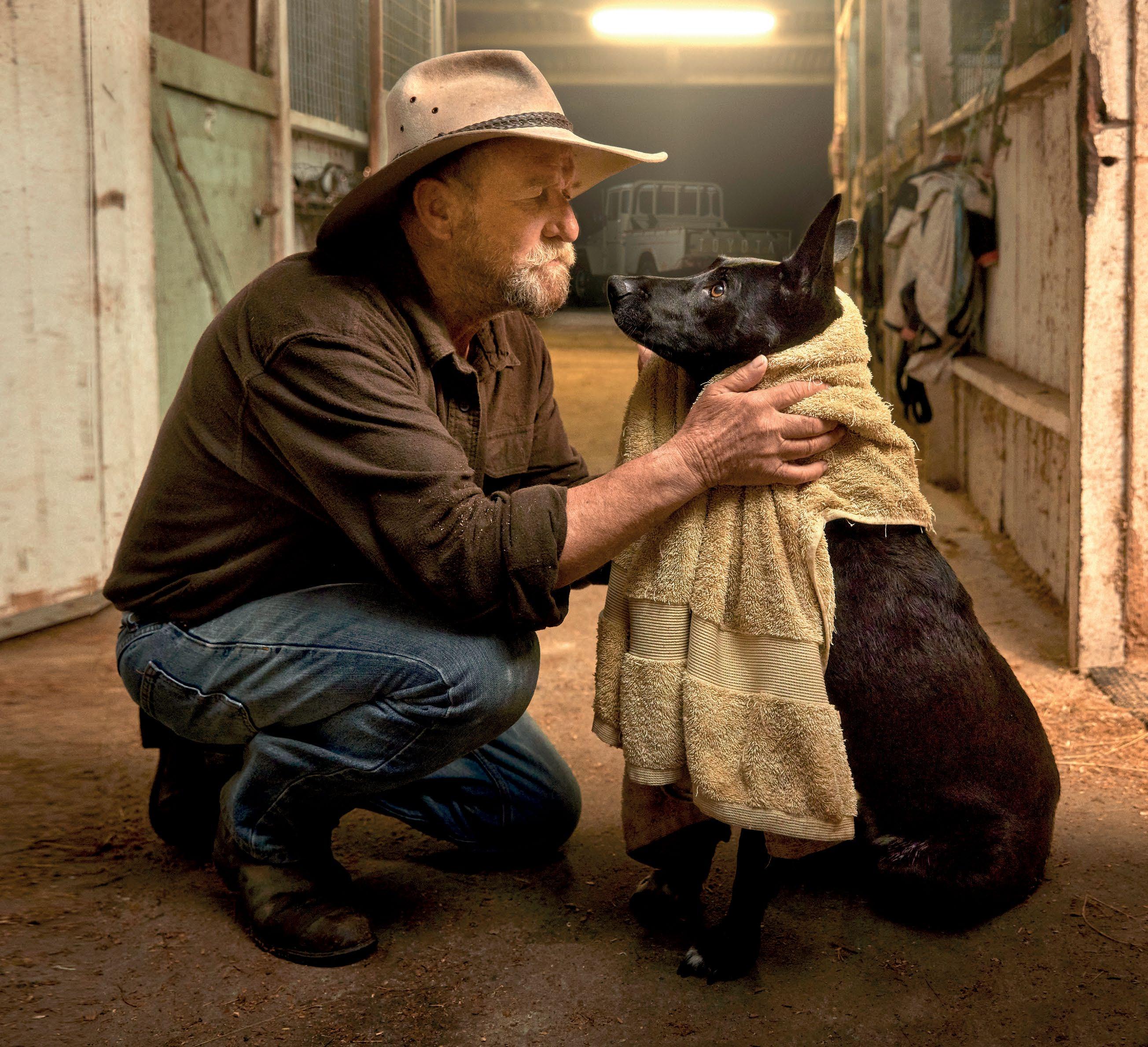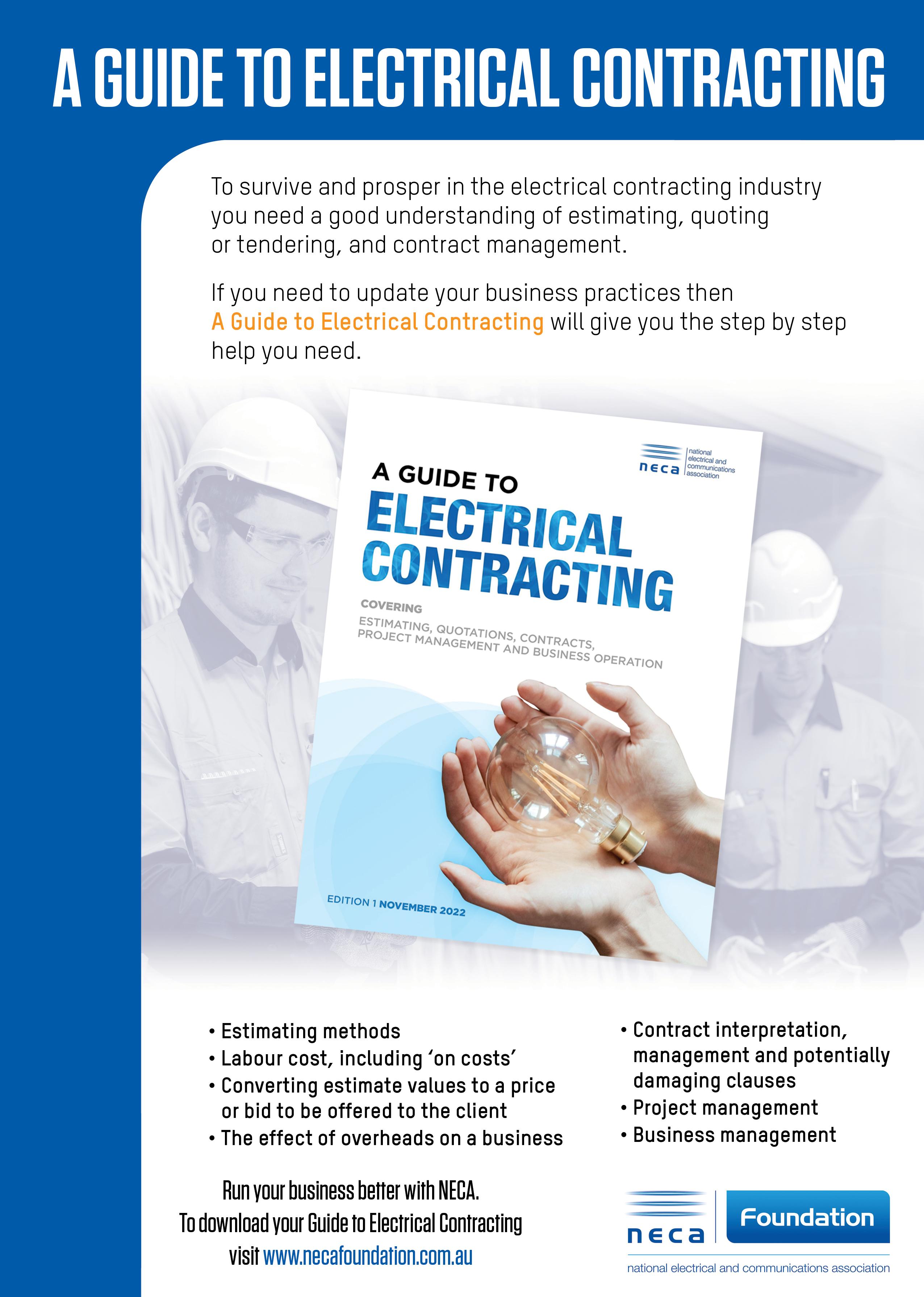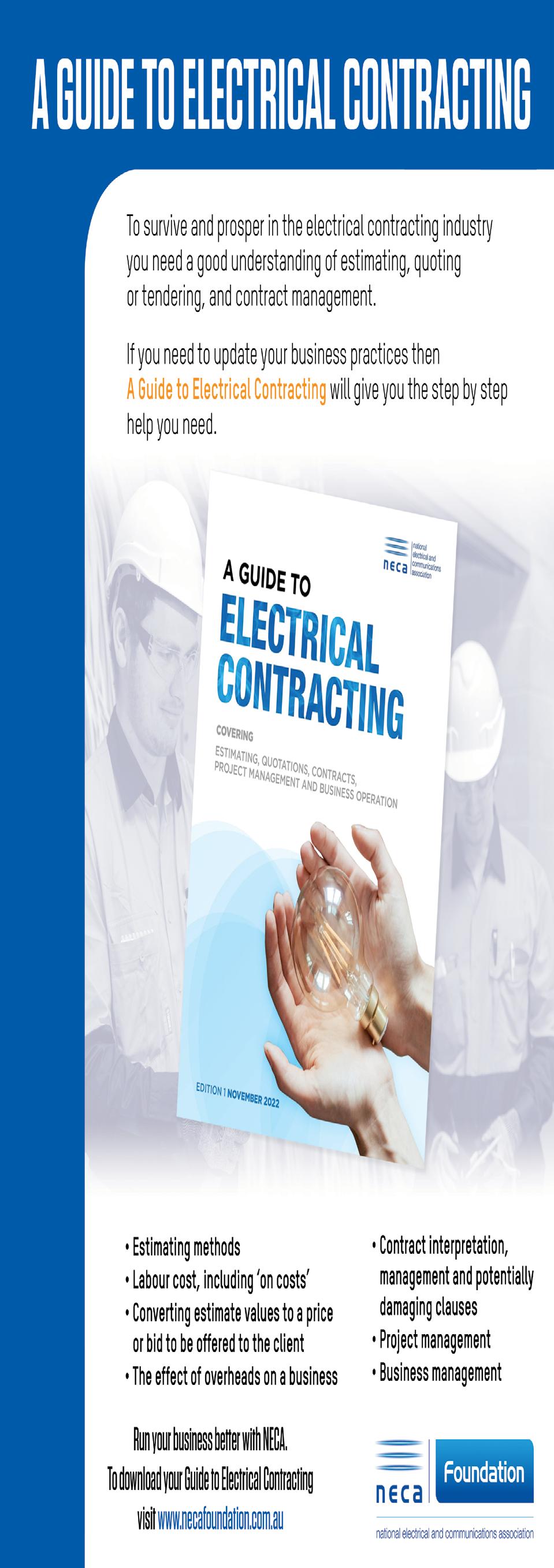





From digital production environments to the construction and operation of industrial or commercial buildings, failsafe power distribution must fulfill increasingly stricter requirements. Siemens SENTRON protection devices not only meet these requirements, but also integrate into automation environments and collect energy data to form the ideal solution for safe, efficient power supply.
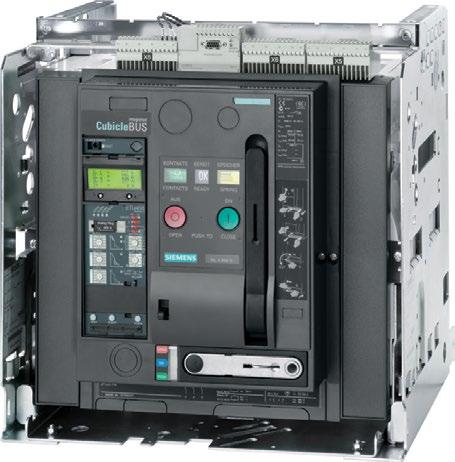
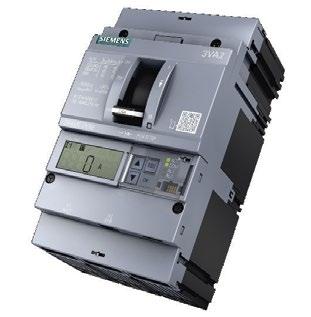
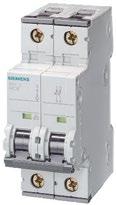
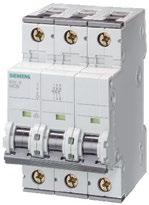
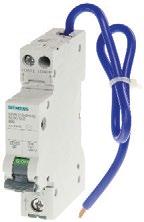



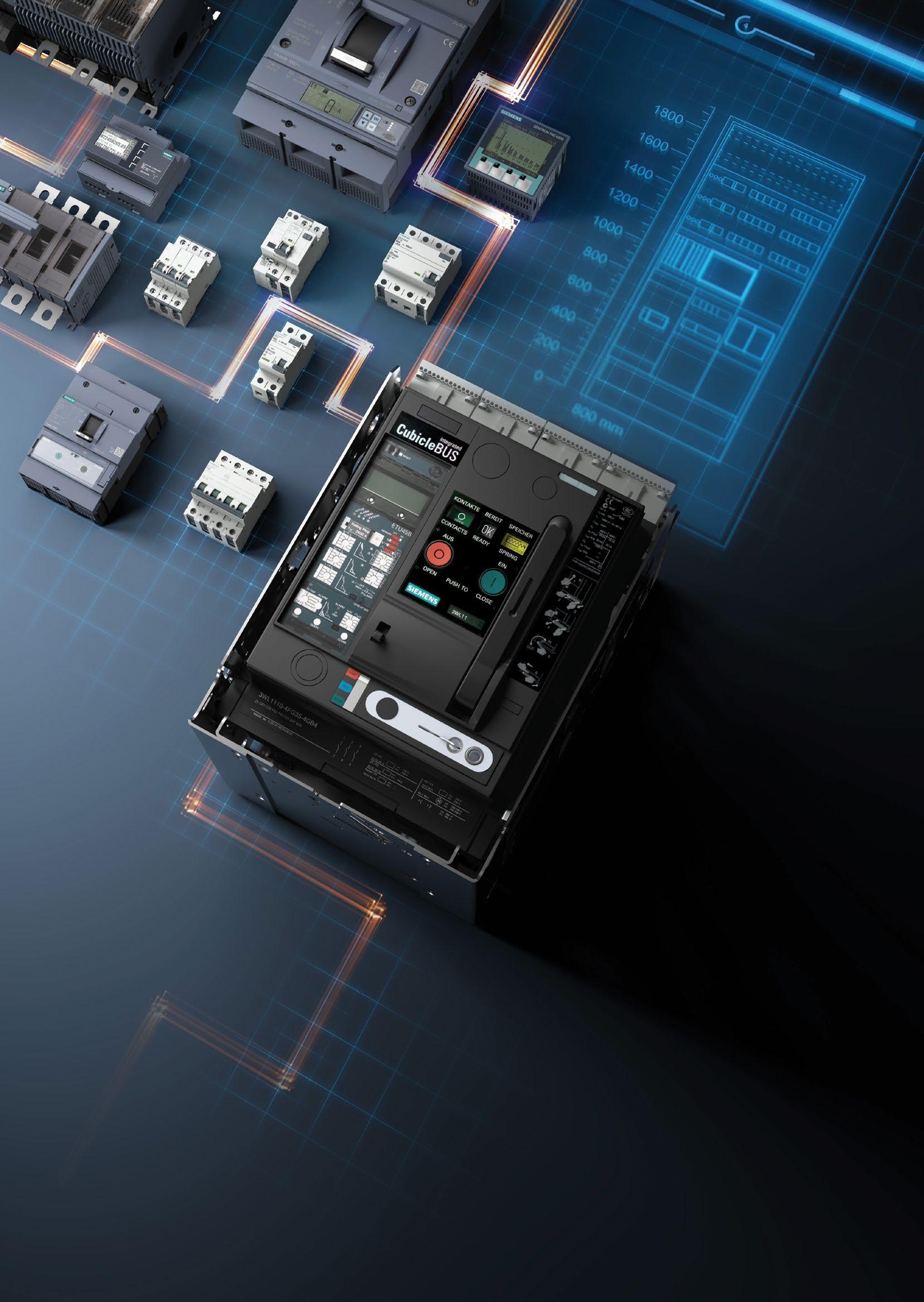

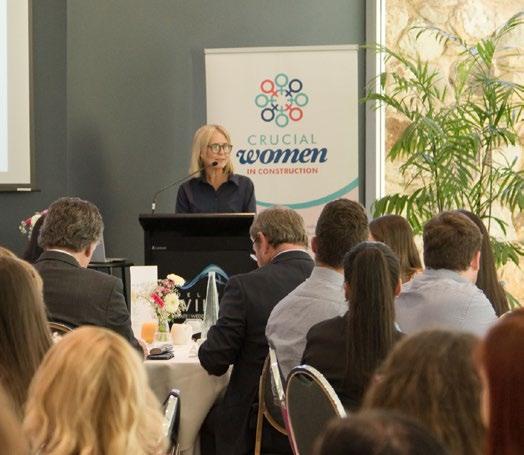
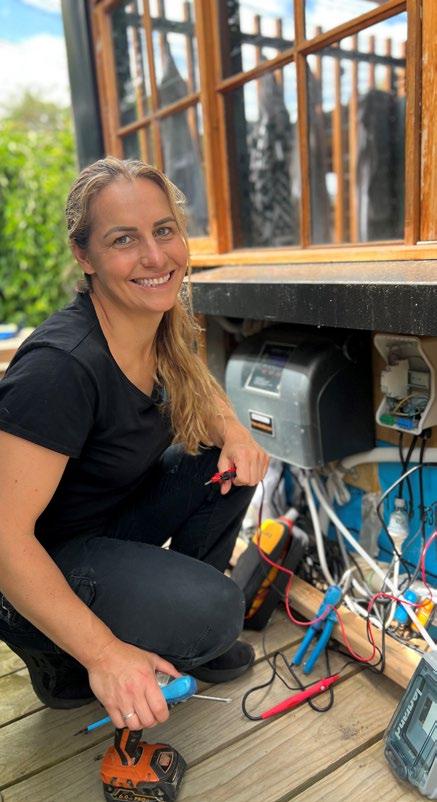
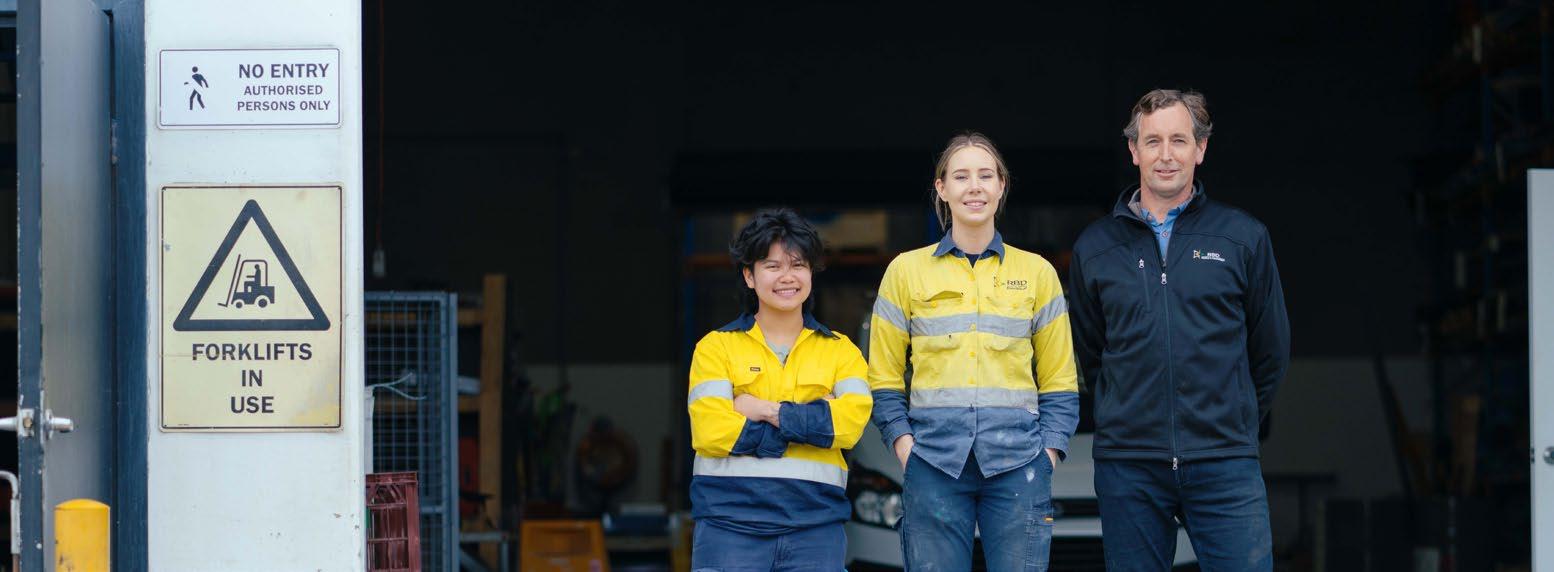
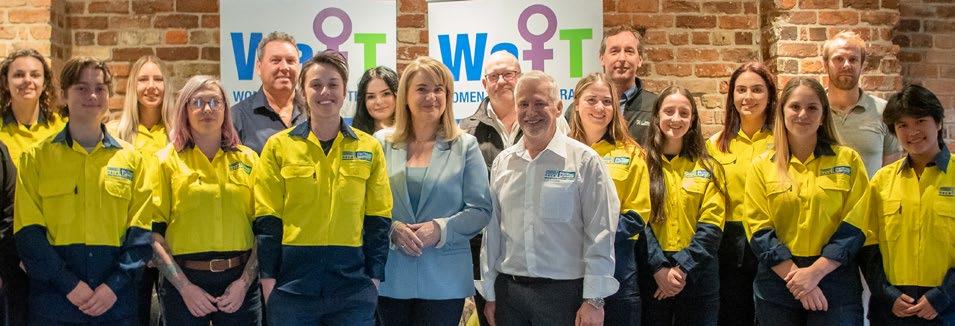

Welcome to the first edition of NECA News for 2023. In this special edition, we are taking the opportunity to celebrate the women in our industry. We also want to acknowledge the many initiatives that are underway to increase participation rates and make the electrical industry a viable career avenue for women.
Electrical contractors, industry stakeholders and government are collectively working to create change. Our industry has a reputation for responsiveness and innovation, and we have seen these qualities being applied to the way that employers attract and retain their female staff. NECA wishes to recognise the work being done to champion women in industry, and acknowledge how far we’ve come over the past ten to fifteen years.
We speak to women working across all areas of industry including apprentices, electricians, contractors, suppliers and training instructors. They share their stories and enthusiasm, noting the abundance of opportunities available within industry and encouraging women to give it a go. We hope their stories inspire not only today’s electricians and contractors, but the girls at school and women interested in the trades, who are considering their career options.
In addition to reviewing safety and technical developments, our articles review the considerable number of upcoming changes in federal legislation. The amendments will shift Australia’s industrial and employee relations landscape, and now is a good time for you to consider how they might
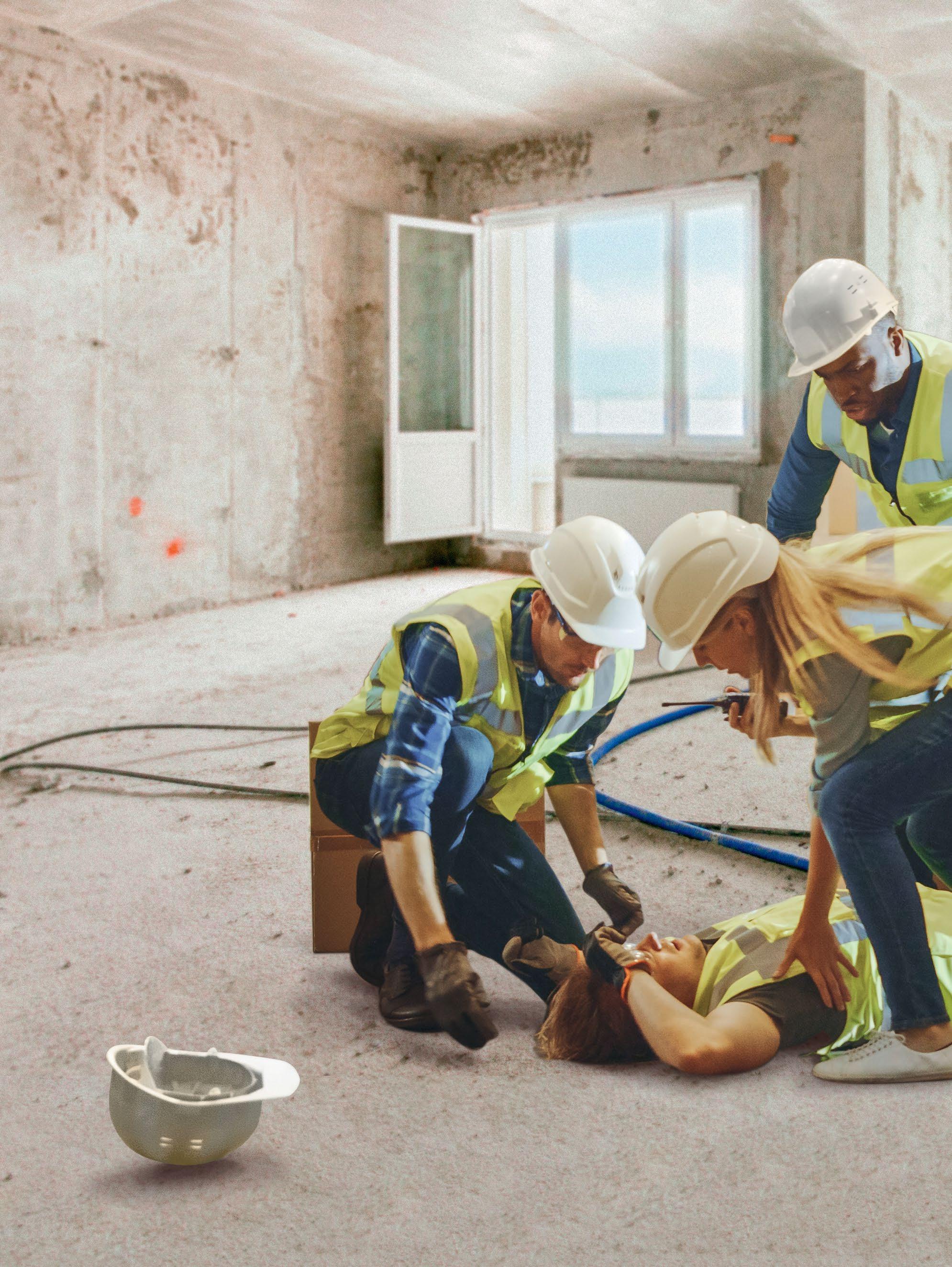
impact on your business. As always, we have also provided an overview of the latest news from each of the states, keeping you up to date with the key information you need to run and grow your business. We would like to thank you for your continued support of NECA and look forward to working with you this year. If you have something to share from your corner of the country, let us know. We’d love to hear from you.
Wishing everyone a happy and successful year.
Share your feedback via email necanews@neca.asn.au
Share your ideas for content via email necanews@neca.asn.au
We’re looking to showcase NECA member stories in each issue. Reach out to your NECA Branch or email necanews@neca.asn.au
If you’d like to join more than 30,000 of your industry peers and receive a digital version of NECA News, sign up at www.neca.asn.au/necanews
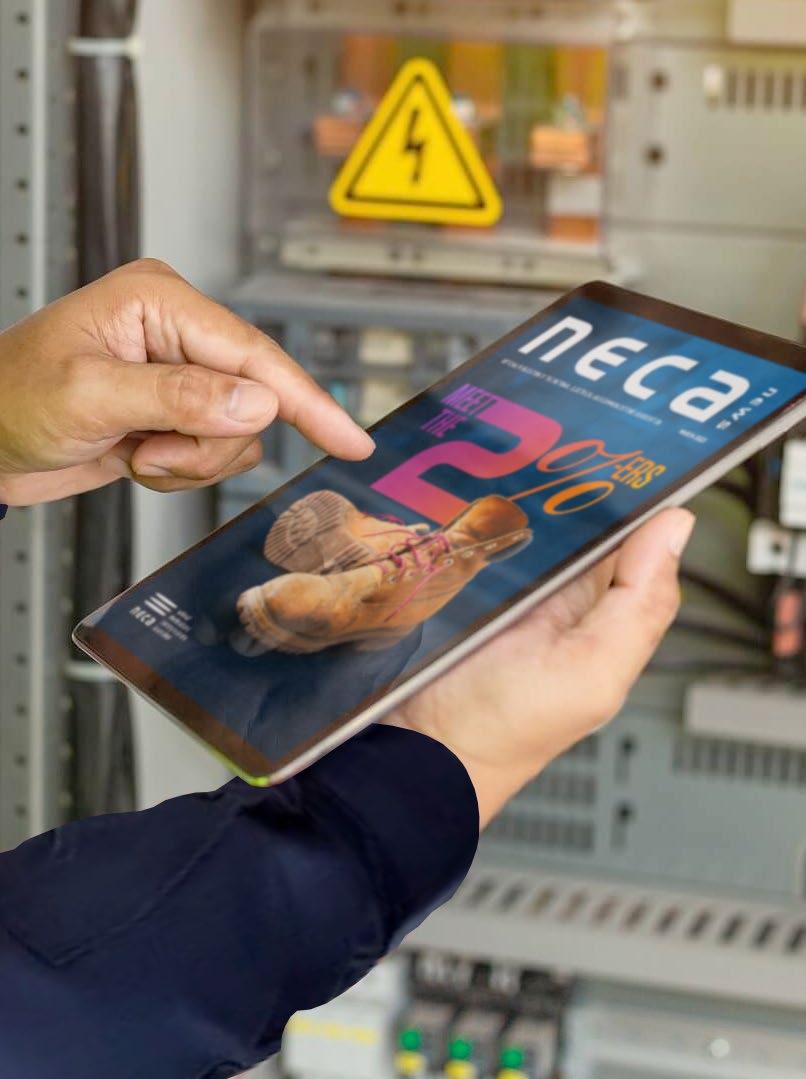 The NECA News team
The NECA News team
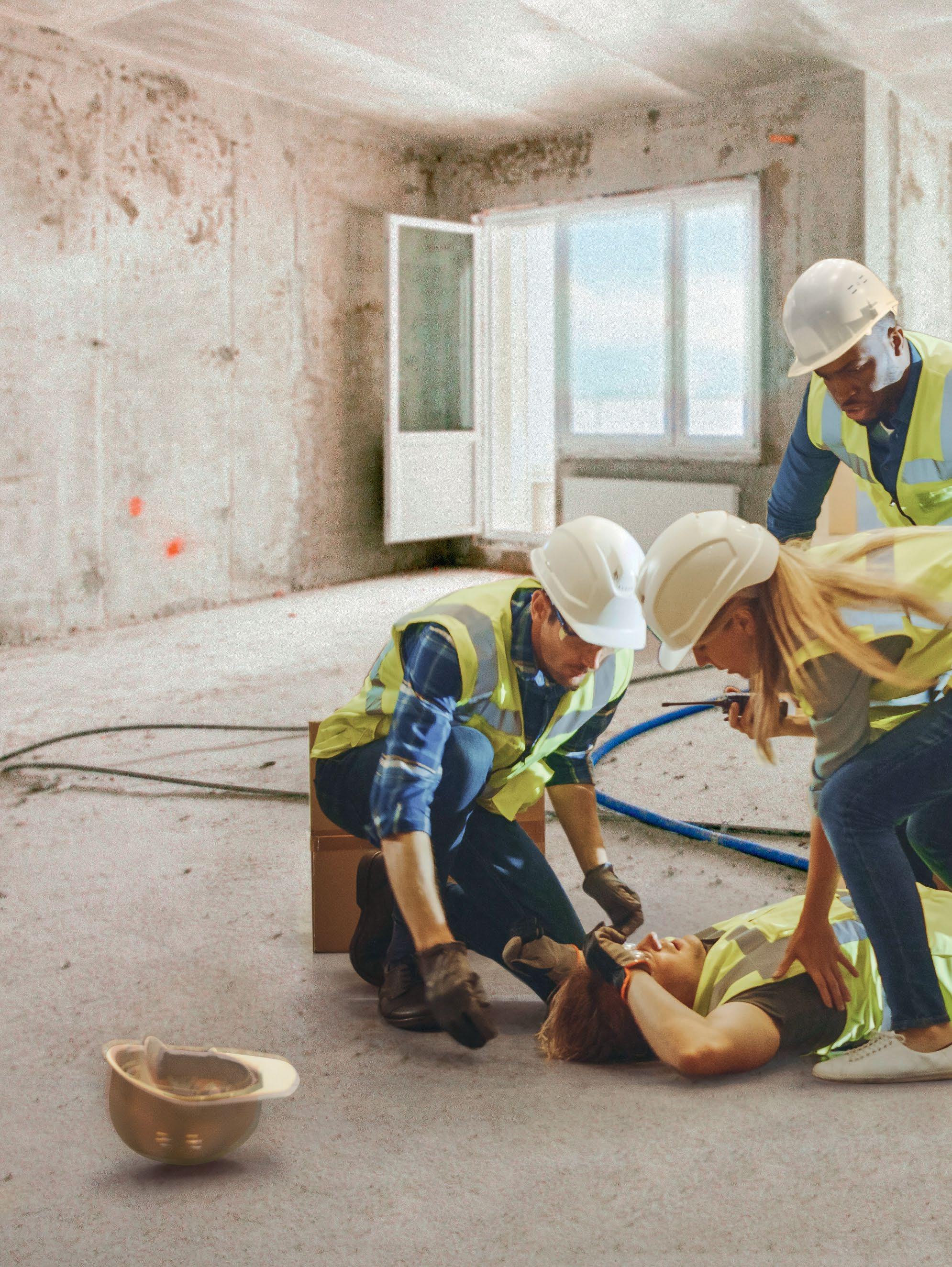

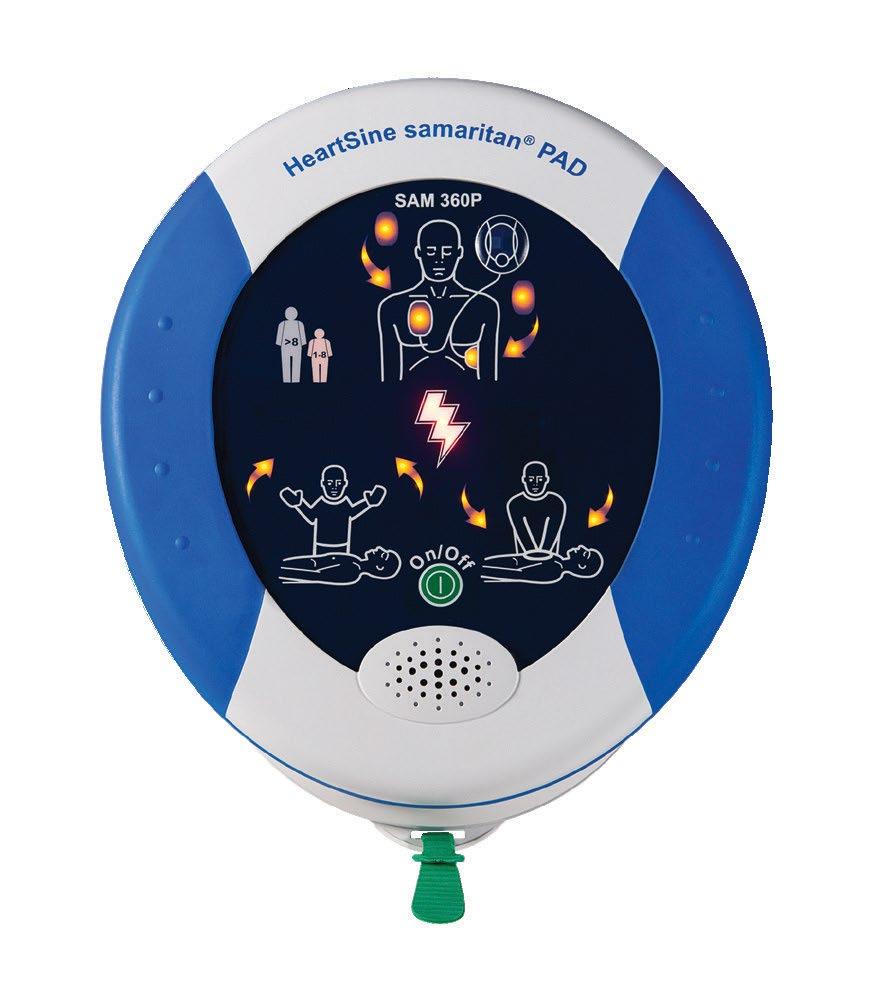


Not only is gender equality a fundamental human right, but having a more diverse, inclusive industry is important to meeting the resourcing challenges and skills shortages the sector faces, both now and for the foreseeable future.

Traditional views on careers for women and social influences on women’s perceptions of jobs start from an early age.
Cultural issues cannot be overstated, and the sooner perceptions are shifted, the better the opportunity to influence the role models of tomorrow and encourage future generations of female tradies.
NECA supports workplace initiatives that remove cultural barriers, break down discriminatory practices, and make the electrotechnology sector a better place to work for everyone.
NECA is committed to working with the government and industry to establish the construction sector as an employment sector of choice for women, while stamping out offensive behaviours. Both government and industry need to demonstrate through their actions that women are welcome participants in all trades and significant contributors to economic recovery and future prosperity.
It makes sense that women who are half of the available workforce should
see our industry as an attractive and rewarding sector to have a satisfying, well-paying and long-term career.
NECA is being acknowledged in parliaments and boardrooms as a leader in increasing female participation in our sector, but we won’t rest on our laurels.
As an example, during 2021, there were 40 electrical pre-apprentices and 10,625 electrical apprentices ‘in-training’ in NSW. Of these 4.2% (445) were female. This includes first, second, third and fourth-year apprentices at that point in time. In contrast our training campus in the ACT has now attracted a female enrolment rate of 15% of new apprentices through pre-apprenticeship classes, mentoring, mathematics tutoring and aptitude screening.
The Australian Government’s Office for Women, Department of the Prime Minister and Cabinet, is developing the National Strategy to Achieve Gender Equality.
The strategy will also support other jurisdictional plans and government efforts to achieve gender equality.
NECA is active both federally and across jurisdictions, engaging with government and the opposition, crossbench Senators and Members of Parliament.
On 28 March 2023, NECA will be cohosting a roundtable with Ms Zoe Daniel, the Independent Member of Parliament for Goldstein, which will be attended by government and industry representatives alike.
The purpose of the roundtable is to scope opportunities and effectively increase national female participation in maledominated sectors, while informing the work of the Office for Women in their development of the National Strategy to Achieve Gender Equality.
Zoe Daniel MP is a strong advocate for equality and inclusion and in her work, she is highly committed to driving urgent change across the spectrum of gender equality issues.
The roundtable will serve as a platform for influential female leaders in government and industry, to come together and jointly agree on key recommendations to government, to inform immediate and future initiatives to achieve gender equality.
In addition, the following topics will be explored to inform the advice to government:
½ What are the key barriers to female participation in maledominated industries such as construction and STEM?
½ How can the federal and state governments, as major purchasers,
better mandate higher training and employment targets for women through procurement?
½ What can the education sector do to better influence young girls’ career choices?
½ How can the government unlock female workforces to drive climate change action?
½ What training is needed for workers on sites, including apprentices, tradespeople and their employers, to effectively facilitate a healthy workplace culture?

It is important for the government to implement changes and recommendations as provided by the industry and their communities, from people who have, or continue to experience imbalances of power and gender inequality first hand. But joining industry forces is more than get-togethers, breakfasts, lunches and dinners. It is about driving evidencebased and genuine change, changing laws, making people accountable for their behaviour, improving workplace culture and ensuring that government leads by example in making women feel valued, safe and welcome in all sectors of the nation’s economy.
One exemplary industry force is the Construction Industry Culture Taskforce, and their ongoing efforts to secure longterm sustainability of the sector through the development of the Culture Standard
The standard looks to improve sector-wide productivity and support people working in construction by focusing on improvements in the following areas: time for life, wellbeing and diversity and inclusion.
NECA met with taskforce representatives to discuss these initiatives and opportunities for future collaboration.
The taskforce works closely with the New South Wales and Victorian Governments, trialling a number of projects aimed at driving change in consultation with government, industry and academic partners, for a better construction sector by applying the Culture Standard.
NECA will continue its work with the taskforce as well as other members of the industry, including the
National Association of Women in Construction and the Crucial Women in Construction forum, to ensure the electrotechnology sector leads by example in the training, recruitment and retention of female workforces. Only through a holistic approach will industry and government be able to collectively influence the complete ecosystem of women entering the workforce, from early education to longer-term career planning in the sector.
Initiatives such as establishing and maintaining a critical mass of women on sites, must be achieved to provide opportunities for the next generation of women in industry, and ensure year-onyear growth in female participation.
There needs to be a strategic approach to ensure the industry can attract and retain female employees, and address the severe female under-representation in male-dominated industries.
NECA commends and thanks many of its member businesses who continue to actively promote respectful and safe working environments, including a zero-tolerance approach to unacceptable and poor behaviour.
If you would like to get involved in NECA’s advocacy work for women in the sector, or would like to share your story please contact our National Advocacy Team via 1300 361 099.
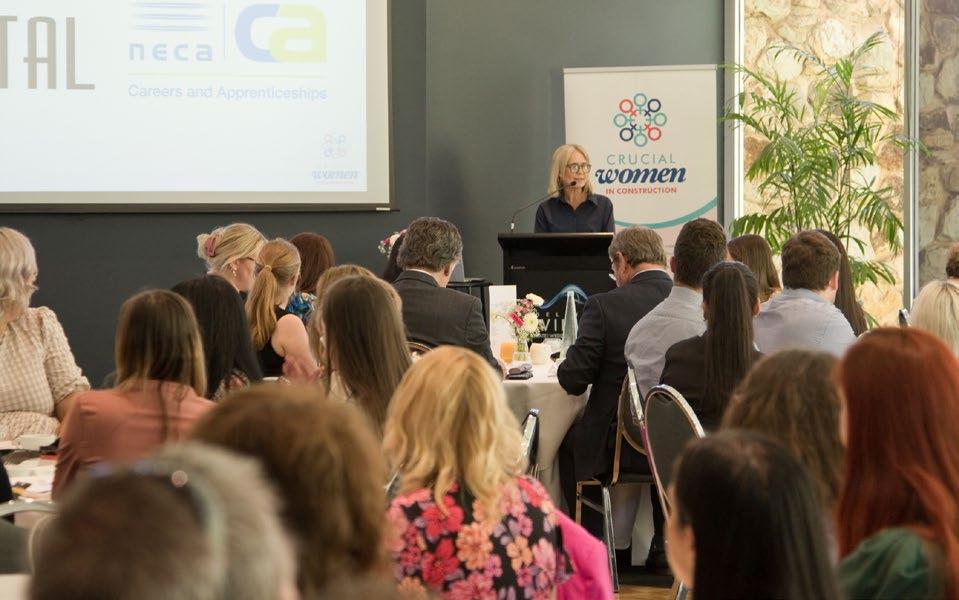

On 9 February 2023, the Workplace Gender Equity Amendment (Closing the Gender Pay Gap) Bill 2023 was referred to the Finance and Public Administration Legislation Committee for inquiry and report by 16 March 2023, with public submissions welcomed.
As outlined by Senator Gallagher, Minister for Public Service, Minister for Finance, Minister for Women, in the Senate on 8 February 2023:
“The Workplace Gender Equality Act 2012 (the Act) was first passed over 10 years ago, and since that time, findings from the Workplace Gender Equality Agency’s (WGEA) data set tell us that workplaces have a key role in making a difference in the lives of women and men.
Improving workplace gender equality is critical. Australian women deserve fair and safe working conditions. They deserve equal opportunity and equal remuneration.
This Bill will be a key driver for employer action, transparency and accountability and will help speed up progress towards gender equality in the workplace.
It will do this by, for the first time, allowing WGEA to report gender pay gaps at employer level, not just industry level.”
The Bill will legislate compulsory reporting of gender pay gaps by organisation, and it applies to businesses that have 100 or more employees.
Overseas evidence suggests that with public reporting on gender pay gaps, employers make more effort to close the gap.
Ms Zoe Daniel MP placed gender pay gap transparency on the agenda at the Jobs
and Skills Summit in September 2022. She called on the Federal Government to require companies with a significant number of employees to publicly report their gender pay gap, as such transparency has led to substantial pay gap reductions in other countries.
She has also called for the government to apply a gender lens to all new legislation, because as Ms Daniel said, “The moral and economic case for investing in women is strong. Women want to work, but they have to be respected for the work that they do.”
NECA commends Ms Daniel’s exemplary leadership and advocacy for government reform to advance gender equality in workplaces.
For more on the Workplace Gender Equity Amendment (Closing the Gender Pay Gap) Bill 2023 see page 71.
< High
< Installation Verification & Compliance Testing
Pass/Fail limits and “Auto Sequences” set to AS/NZS3017 and AS/NZS3019
< Single Test Functions
Voltage, Mohm & Ohms, RCD, Loop Impedance, Line Impedance, Earth Resistance, Power & Harmonics, Light, Wire Tracing
< Site Schematics & Installation Reports
Save test results to the Site Schematic or Tree Structure Start with Site Name and Address Test reports output to PDF or Excel
< High Volume RCD Testing System
Complete high volume RCD testing & logging solution with bar-code scanner input of RCD IDs and logging of RCD push button tests
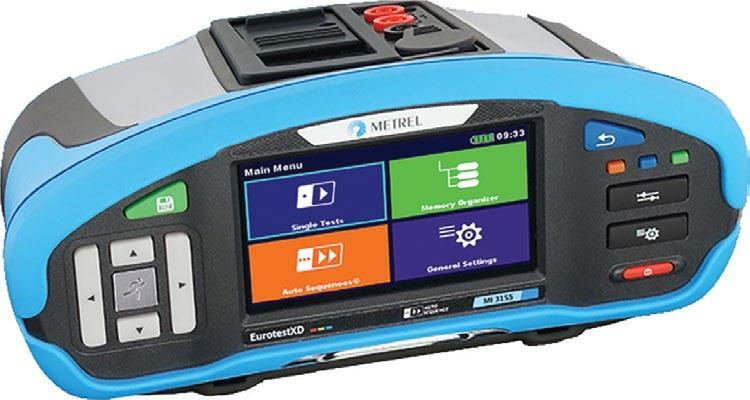
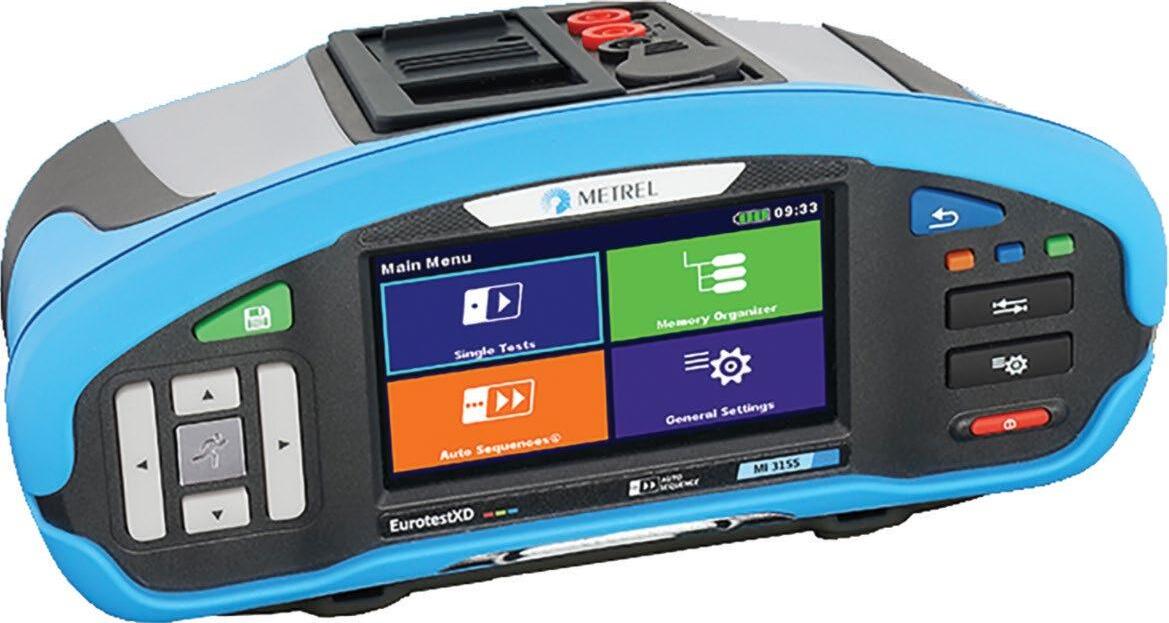

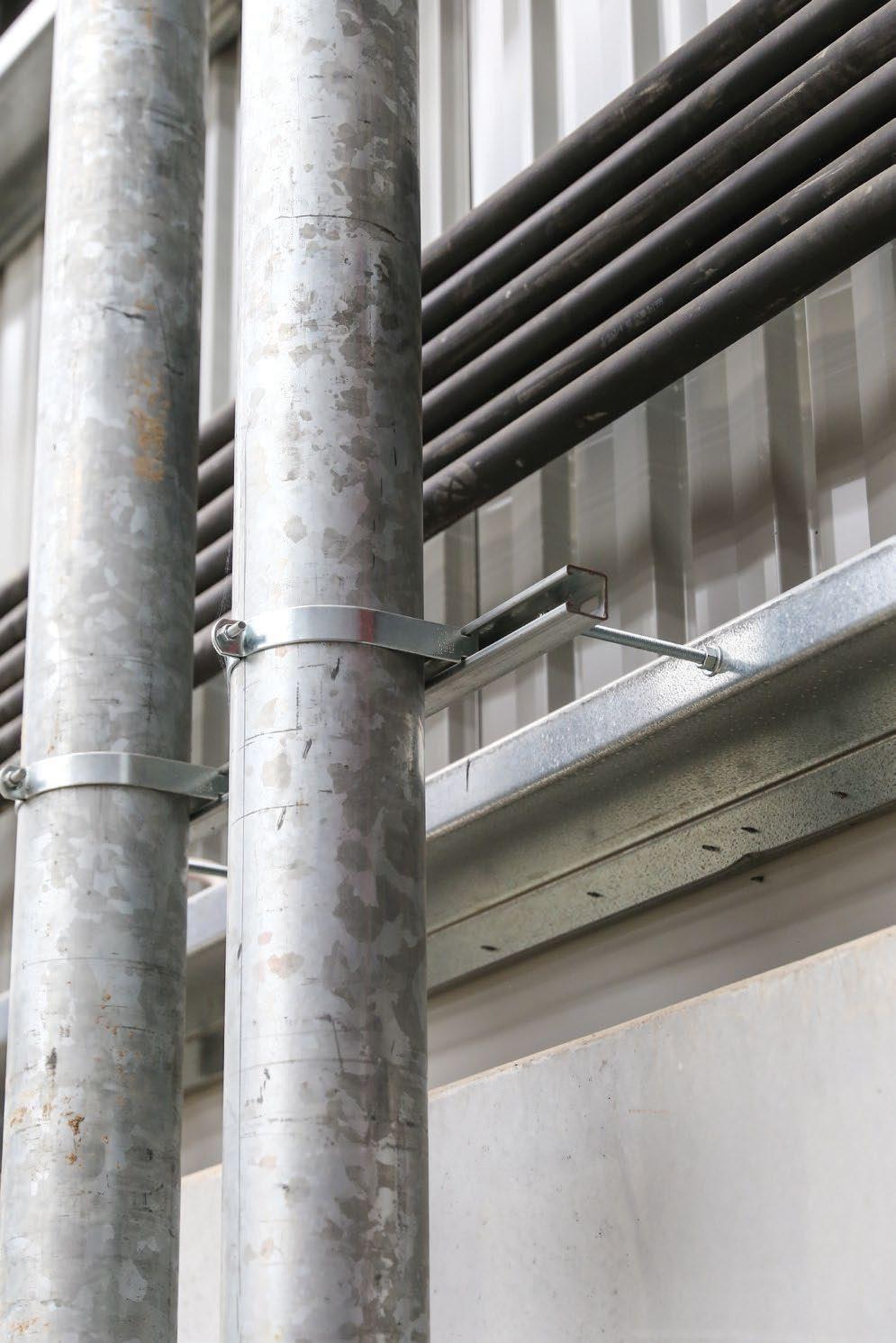
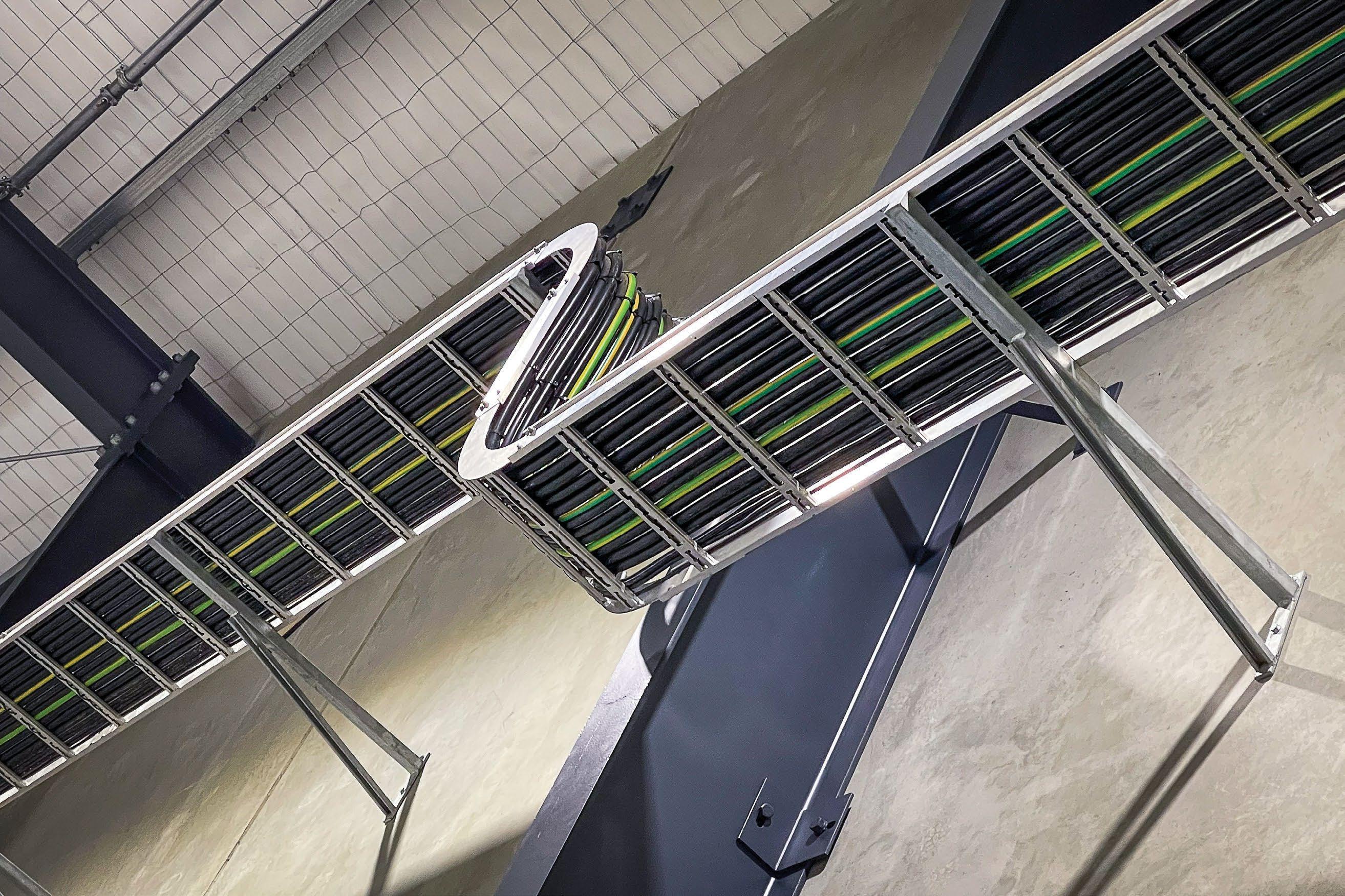
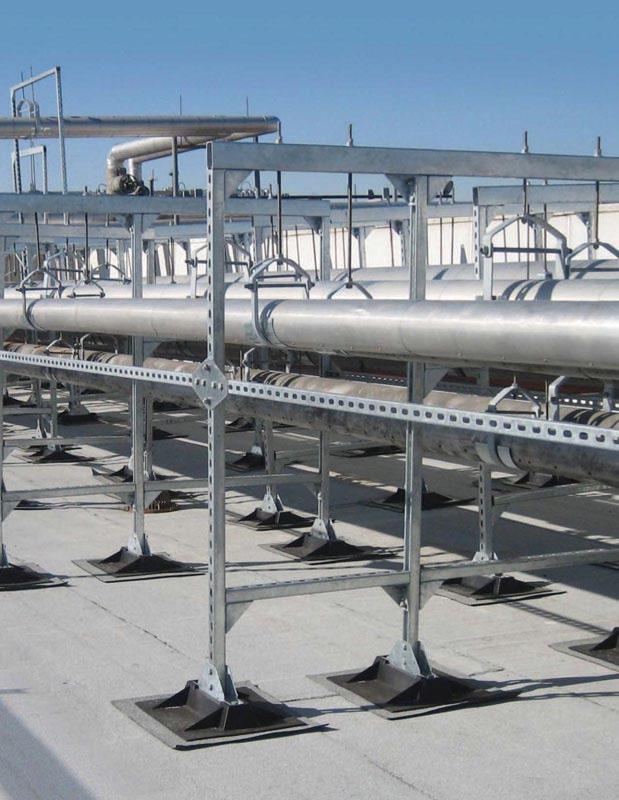
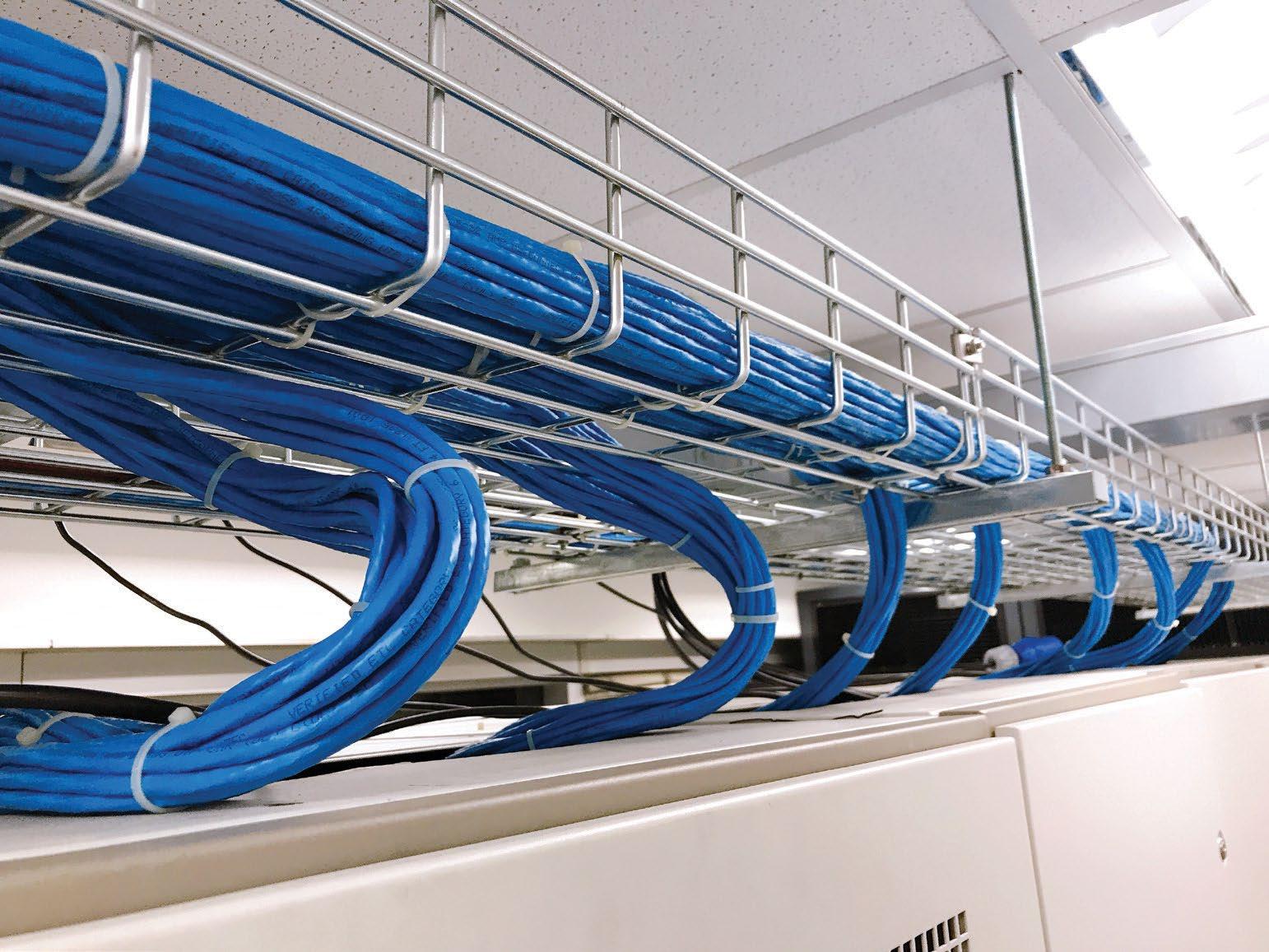
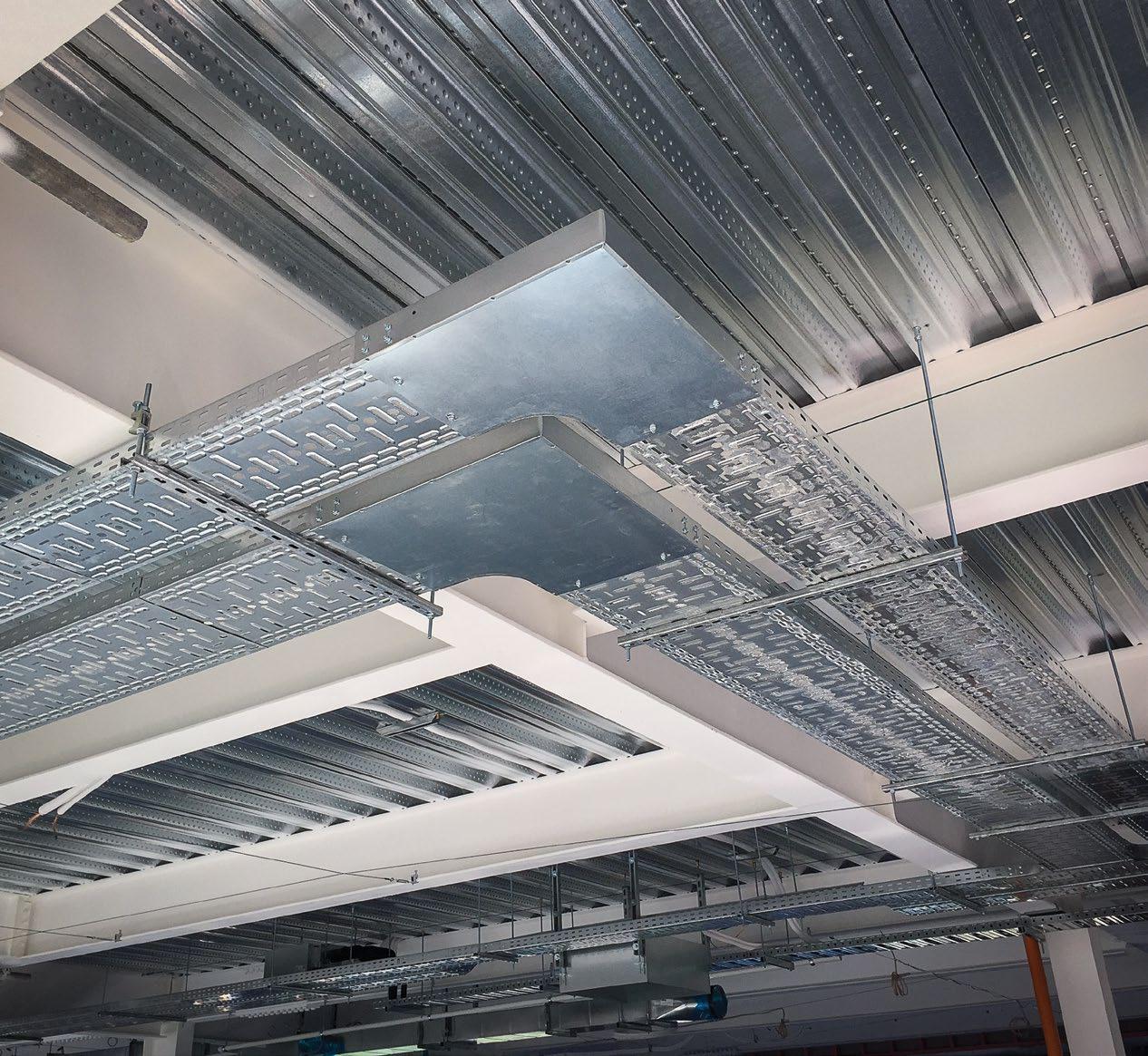
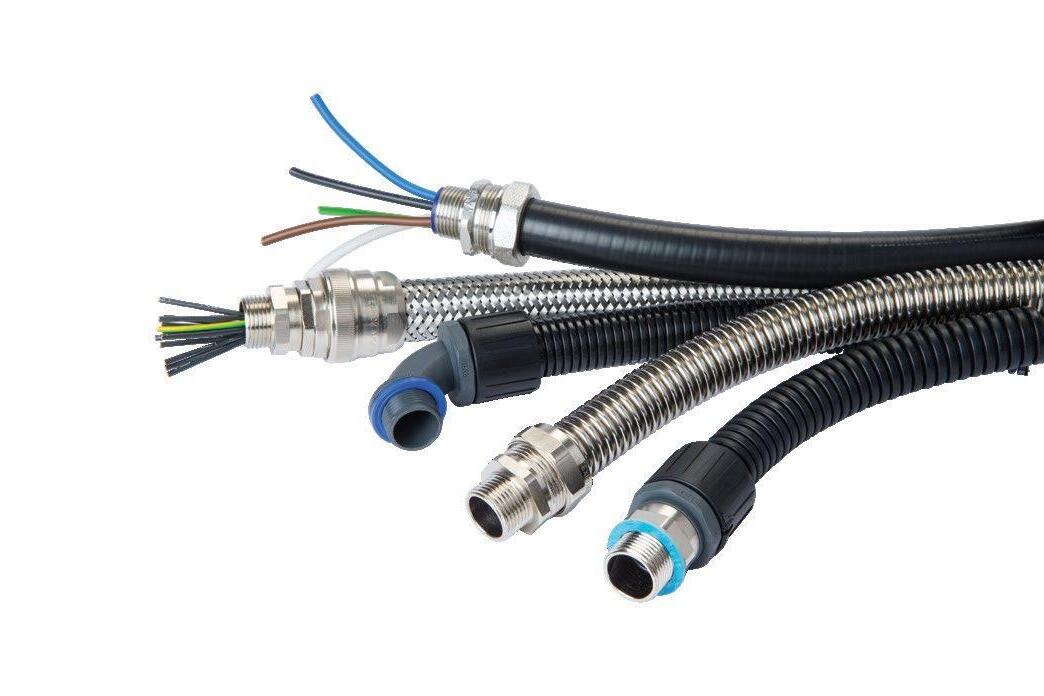
Despite the Australian Bureau of Statistics (ABS) reporting that from May to November 2022, the construction industry grew by 8.4% with an additional 99,000 workers, labour shortages remain one of the industry’s biggest challenges.
The ABS reports that in the 12 months to August 2022, 21.8% of businesses within the electrical, gas, water and waste services sector reported vacancies.
One of the most significant hurdles facing the industry is the fact that women, who represent over 50% of Australians, still represent just 2% of skilled trades workers.
Some electrical industry organisations and their registered training organisation (RTO) partners are however bucking the trend, seeing significantly better rates than the national average by using innovative, female-led initiatives. For example, the NECA Centre of Excellence in the ACT has achieved one of the
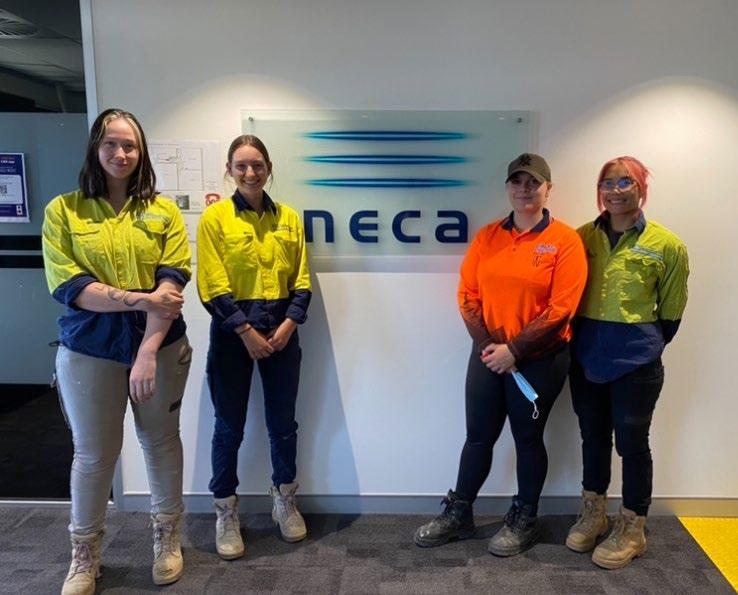
highest rates of female participation in the country, at 15% and rising.
Michelle Ellis, who manages NECA Training’s ACT branch, says the secret lies in NECA ACT’s female role models and its range of innovative training initiatives.
“Entry-level training programs, personal and professional development opportunities and ongoing mentoring are what make the difference. If we want to drive real change, we must reevaluate how we attract, train and retain apprentices of all genders to facilitate a strong and diverse workforce.”
“We are very proud of the female participation rates that we have achieved in the ACT. With our rates currently more than seven times the national average, we are moving in the right direction, but there is still room for improvement. It is
not enough to just call for more women to join the construction industry, we must critically assess why the numbers aren’t where they should be and work to remove the barriers one by one.”
NECA is bridging the gender diversity gap within the electrical industry, and encouraging participation through a variety of initiatives, which are aimed at educating young women about the trades. The NECA Group hosts a range of workshops, ‘Women-in-Power’ pre-apprenticeship programs and educational seminars to encourage young women to join the electrical industry.

THE
CONTINUES TO CONFRONT PROBLEMATIC SKILLS SHORTAGES AND MOUNTING INFRASTRUCTURE BACKLOGS, THE NEED FOR SKILLED CONSTRUCTION WORKERS HAS NEVER BEEN GREATER.
The Women-in-Power program, run from NECA’s Centres of Excellence in both the ACT and NSW, has been specifically designed to remove barriers. It provides female high school students and school leavers with the entry-level skills, knowledge and confidence required to secure an apprenticeship.

Tiana Cameron, an apprentice who has successfully completed the program, said it helped her and her female peers gain an understanding of the industry and the career opportunities that come with it.
“The Women-in-Power program was a great way to get an understanding of what the job involves,” she said. “It was also really good having both female and male trainers involved in the program and also the trade course. They all supported us to complete our apprenticeships.
“I would encourage all women considering a job in the industry to find the right employer and training organisation for you - one where your development is the priority and you feel supported and heard.”
NECA’s program has also been highlighted by Senator Barbara Pocock in recent senate hearings.
The Senator stated, “We heard in the process of our inquiries from the National Electrical and Communications Association, NECA, at our meetings here in Canberra. They train about one in four electrical apprentices in Australia.
“In their ACT branch, they’ve reached a record 15% of women apprentices. “They’ve achieved this through targeted action, through quality pre-employment programs, and good support for apprentices.”
The strategies developed and implemented by NECA have also seen completion rates soar for those undertaking an apprenticeship with NECA’s RTO. The National Centre for Vocational Education Research reports that withdrawals from electrical apprenticeships have been on the rise since 2000, with 10,400 electrical apprentices withdrawing from their studies within the last financial year.
At a time when apprenticeship completion rates and female participation are more important than ever, NECA’s approach to training has seen NECA Electrical Apprenticeships, one of NECA’s group training organisations, achieve completion rates of more than 90% in NSW, Queensland and the ACT. This is against a national industry average of just 55%.
NECA will continue to find innovative ways to increase female participation and completion rates for the industry.
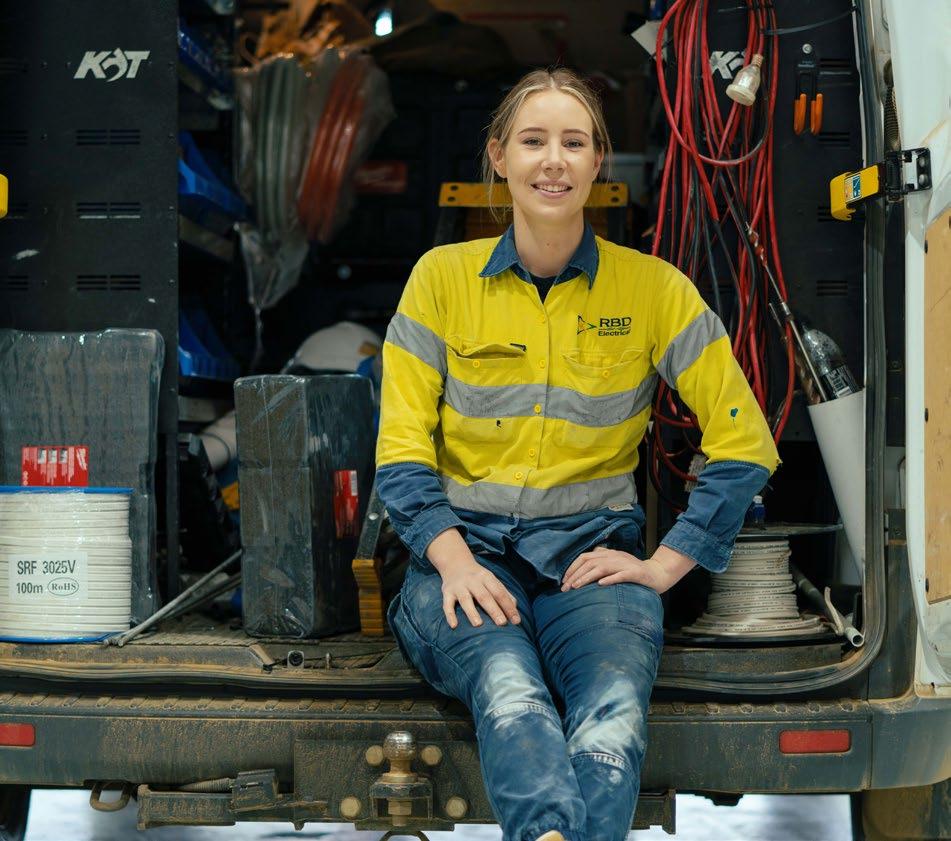
SINGER AND ENTREPRENEUR RIHANNA ONCE SAID, “THERE’S SOMETHING SO SPECIAL ABOUT A WOMAN WHO DOMINATES IN A MAN’S WORLD. IT TAKES A CERTAIN GRACE, STRENGTH, INTELLIGENCE, FEARLESSNESS AND THE NERVE TO NEVER TAKE NO AS AN ANSWER.”
going to work and was told in order to be released from the contract I’d need to take him to court.
“At court I was placed in a room face to face with my boss. It was very intimidating, and at the time I wasn’t strong enough to speak up about the reasons I wanted to leave. The court found I was in breach of the terms of my contract, and I was ordered to go back to work within seven days.”
After the ruling Danielle voiced her concerns to the court regarding their decision, and was advised she could alternatively take a sixmonth suspension before having her contract terminated.
“I knew more than ever that I wanted to become a sparky, so after my suspension I secured a new apprenticeship through NECA. It was the best decision I ever made. That was a turning point for me, and for the remainder of my apprenticeship I worked on everything from high-rise construction, to high-end commercial, security and even on a gas plant in a regional town of just 450 people.”
Since 2019, Danielle Denblyden and her partner Mat have run ATribe Electrical and Plumbing on Victoria’s Gippsland Coast. Mat is a talented plumber, and Danielle has had a successful career as an electrician for over 20 years. For Danielle, carving out a path in a male-dominated industry has not been all smooth sailing, especially in the early days, and it’s the qualities that Rihanna refers to that have seen Danielle go from strength to strength.
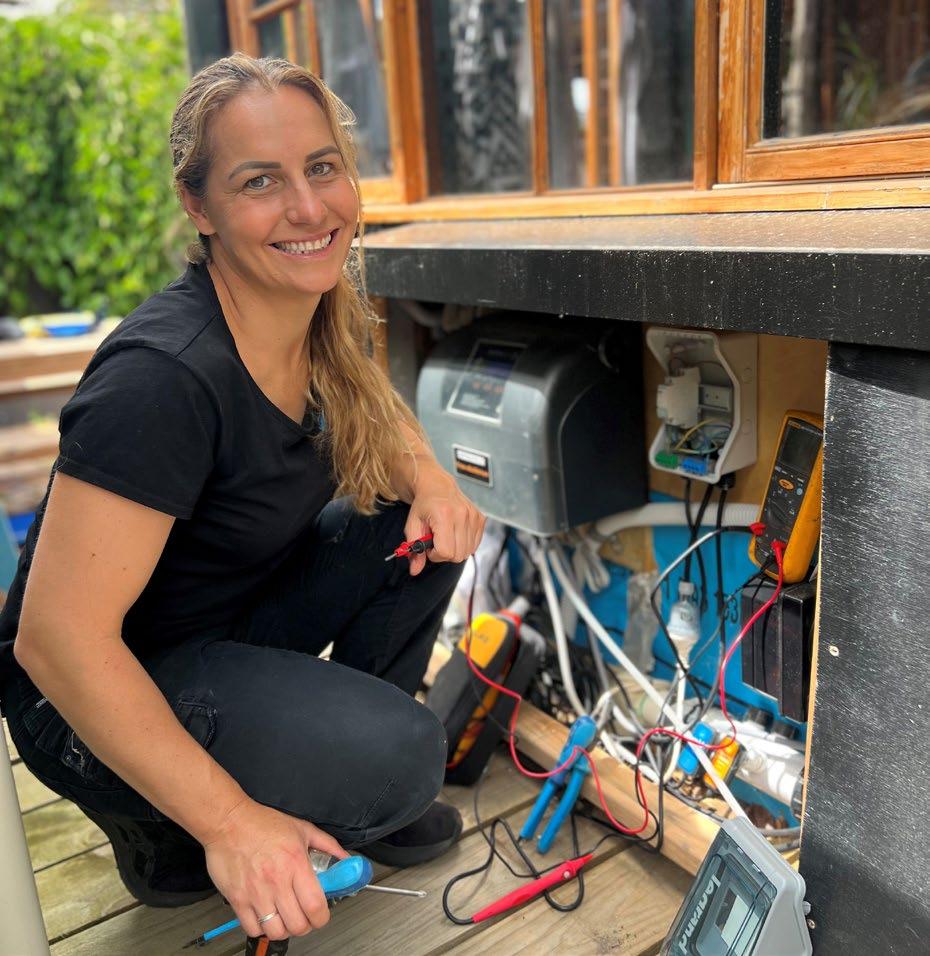
“I started an electrical pre-apprenticeship course not long out of school, and after three months had secured myself an apprenticeship,” Danielle said.
“I was so determined to prove I had what it took to be one of the few female electricians in the industry,
that I didn’t initially realise my employer wasn’t treating me right.
“Throughout my six-month probation I was often reminded I could be let go at any time, so I never questioned why I was spending a lot more time cleaning the workshop, or travelling long distances on my own to reset safety switches, rather than learning how to be an electrician.
“Once my probation period ended, I explained to my boss that I felt like I was behind the other apprentices at school in the practical side of things. I didn’t even know the basics and I knew I had to change jobs.
“I asked my boss if he was able to release me from my contract so I could move on. Unfortunately, he refused. I was not sure what to do next. I stopped
After completing her apprenticeship, Danielle relocated to Western Australia where she put her skills to work, securing a job repairing and rebuilding cranes. “I was totally thrown in the deep end, but had some great colleagues who were only too happy to show me the ropes,” Danielle said.
“Before long the company I was working with secured a maintenance contract on a mine site and I began fly-in, fly-out (FIFO) work.
“Being one of the only females on site was not without its issues, and the accommodation provided was not designed with women in mind. I had to share a two-bedroom unit, quite often with a male whom I had never met before. The bathroom didn’t have a privacy lock. There was no change of linen or
cleaning services for the bedroom, which I had to share with a man working the opposite shift. By this time my confidence had grown. I took my concerns to the District Manager, who dismissed the issues and told me to ‘suck it up’.
“I resigned, citing my reasons and copied the company’s global management in on the email. The District Manager didn’t last long after that, and the company asked me to return with the promise of improved living conditions. I politely declined, but was pleased I had highlighted these issues, and had accommodation conditions reconsidered for other women undertaking FIFO work in the future.”
In 2012, after returning to Victoria, Danielle won a Middy’s scholarship, which she used to fund a solar course, an LED smart lighting course and gain her Electrical Inspectors licence. With a young baby now in tow, Danielle was after some more flexible working arrangements and spent some time as an electrical inspector.
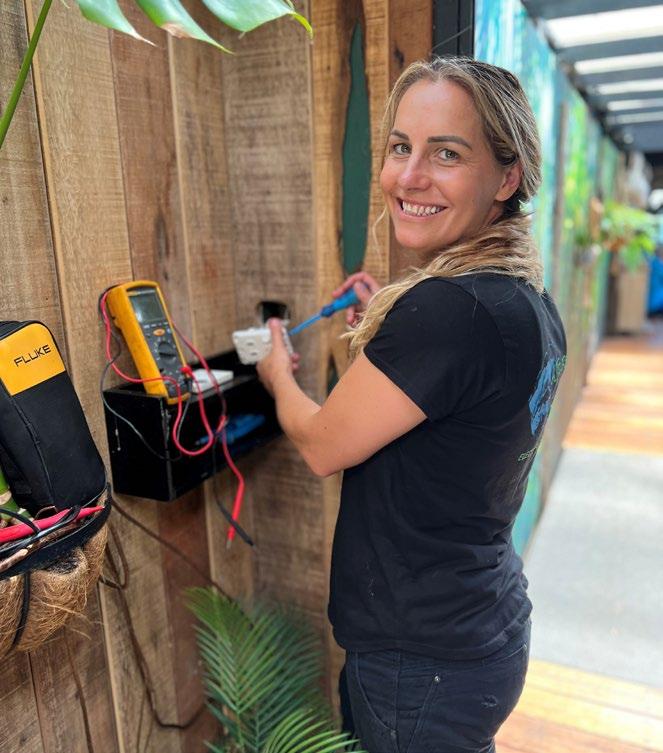
Danielle and Mat now have seven children between them, the youngest being four-year-old twins. Since 2019 they have successfully run ATribe Electrical and Plumbing, which they named in honour of their brood.
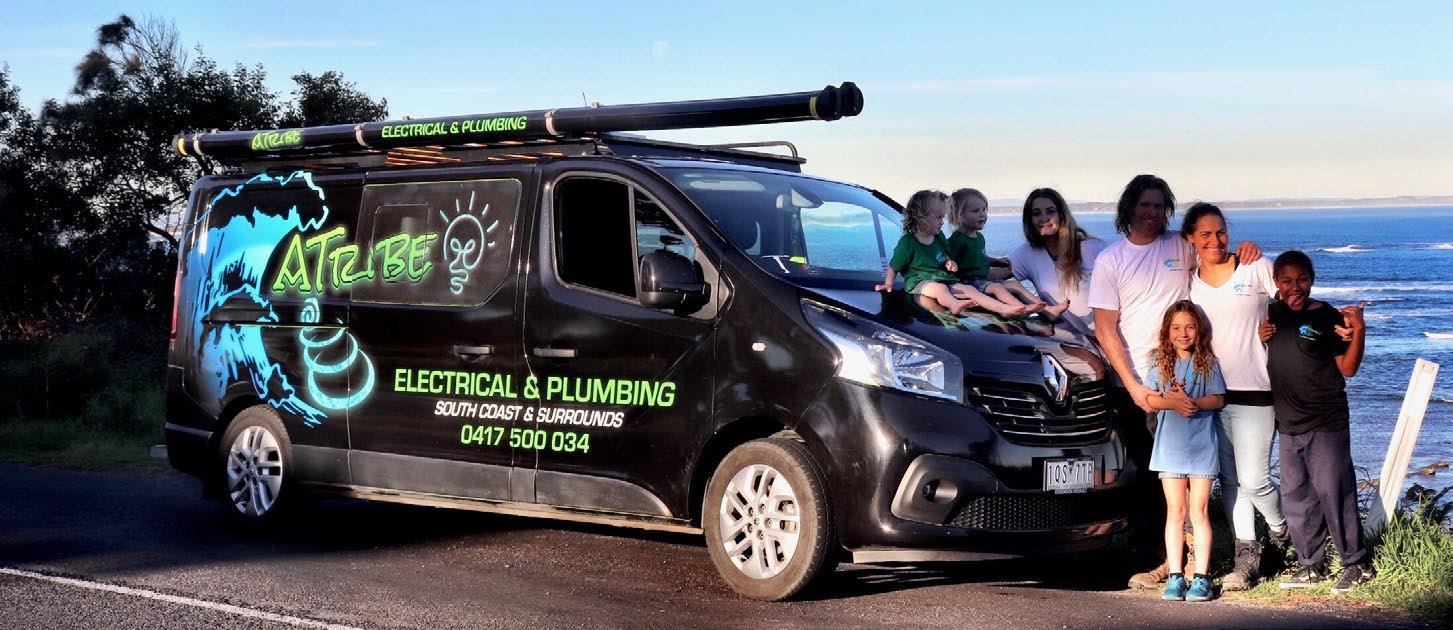
“A lot of our current work has stemmed from the care we provided our past customers. We have huge amounts of repeat customers and word of mouth keeps us extremely busy. For now, we choose to stick to the smaller jobs
that allow us to be flexible around the kids, sports and school runs, and to fit in the emergency work and call-outs when need be.”
Danielle says the key to a successful career in the electrical industry is perseverance. “Take your time and do a good job. Be a perfectionist. Learn good time management. Be reliable. Develop the ability to juggle tasks. Always answer the phone when possible or return calls in a timely manner. Clean up after yourself. Respect your customer, their home and their property. Be open minded and remember you will always be learning and growing. No one knows everything.”
Mat’s daughter Jamie has decided to follow in Danielle’s footsteps and is now a third-year apprentice with NECA. “My advice to any woman wanting to go into the trade is go for it,” Danielle says. “It is a fantastic trade for women. There are so many opportunities and directions you can go in.
“There is an abundance of electrical work out there and you will rarely find yourself without a job. Don’t let anyone treat you bad because you’re a girl. You deserve respect, a good job and career just as much as anyone else. If you work hard you can be anything. If you find yourself in a position that you’re not comfortable with, speak up, because bosses and workplaces like that are in the minority. Move on to bigger and better things. Finally, no question is a dumb question. If you don’t ask you don’t learn. Don’t be scared to look silly – it shows you’re interested in learning.”
DESIGNED TO PROMOTE AWARENESS, OFFER SUPPORT, AND HELP IDENTIFY CAREER PATHWAYS FOR WOMEN IN THE ELECTRICAL INDUSTRY, NECA EDUCATION & CAREERS’ WOMEN AND THEIR TRADE (WaTT) PROGRAM HAS PROVIDED A MUCH-NEEDED BOOST TO FEMALE PARTICIPATION IN THE TASMANIAN ELECTRICAL INDUSTRY.
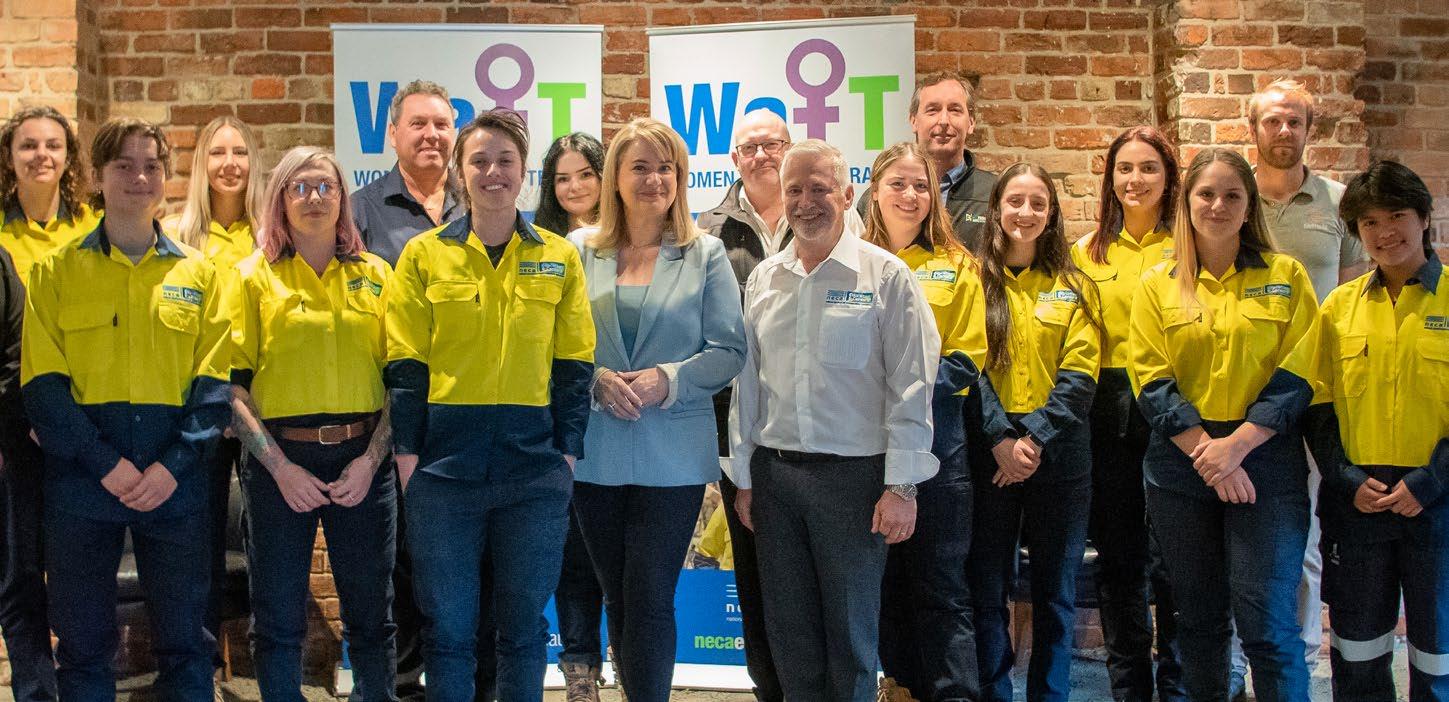
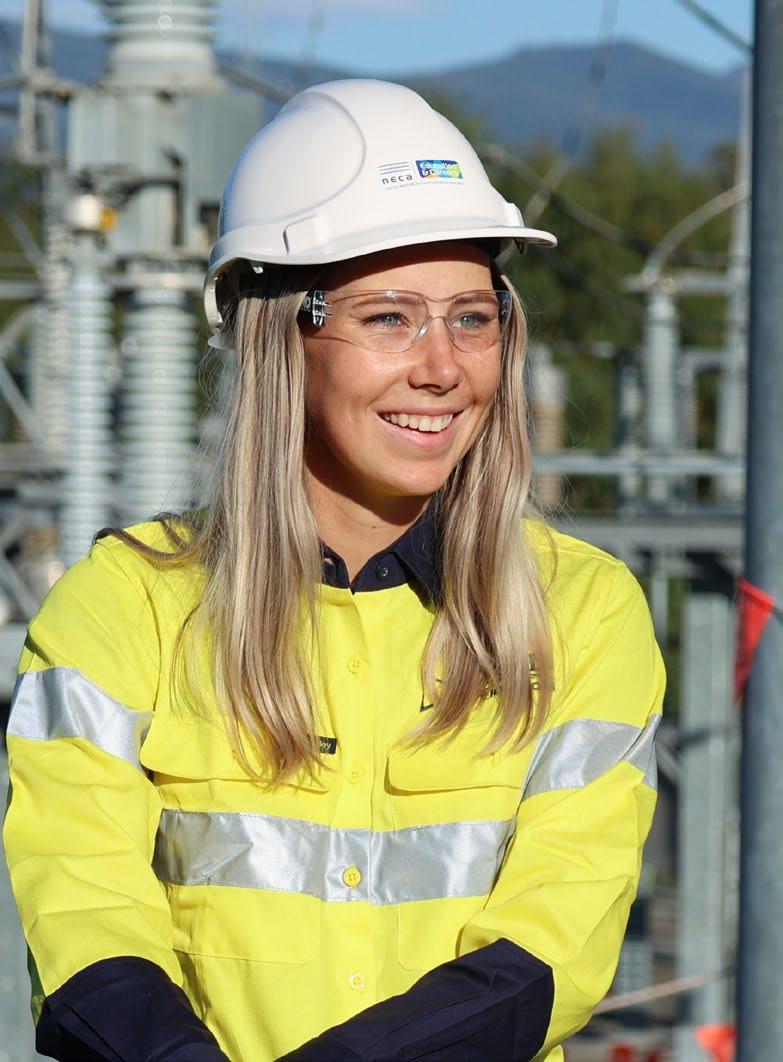
Promoted to senior secondary school and college students, and women who might be looking for a change of career, the 24-month program co-funded by the Tasmanian Government commenced in October 2021 and will conclude in October later this year.
“The program offers women a series of professional development sessions, access to mentoring and support systems and the opportunity to hear from women who have successfully pursued careers across all areas of the industry,” said Gary Vidler, General Manager Careers –Tasmania, NECA Education & Careers. “Each participant has their own dedicated
mentor, as well as access to a female mentor to help guide and support them through their career journey.”
Mentoring can be a crucial aspect of career development, particularly for women entering a male-dominated industry.
“Having someone who can offer advice on networking, career advancement, act as a sounding board for ideas and concerns, and understand the unique
challenges that women in the industry may face, is an invaluable resource for women early in their careers.
“We’ve only had one participant withdraw from the course, when she realised
early on that an electrical career was not what she was looking for. I think that’s a fantastic result given that nationally the completion rate for electrical apprenticeships is just 55%.”
Director/Southern Operations Manager,Nick Davies,
RBD Electrical said, “RBD Electrical currently have three apprentices taking part in the WaTT program. What has struck me the most is the level of pastoral care that is offered to the participants. The girls have heard from other women who have blazed a trail into careers such as project management and engineering, and they are being shown first-hand that these opportunities do exist for women.”
The program is certainly beginning to yield results, with NECA Education & Careers Tasmania reporting that over 10% of their current apprentice cohort is made up of women. “The Australian electrical industry has just two per cent female participation, when it
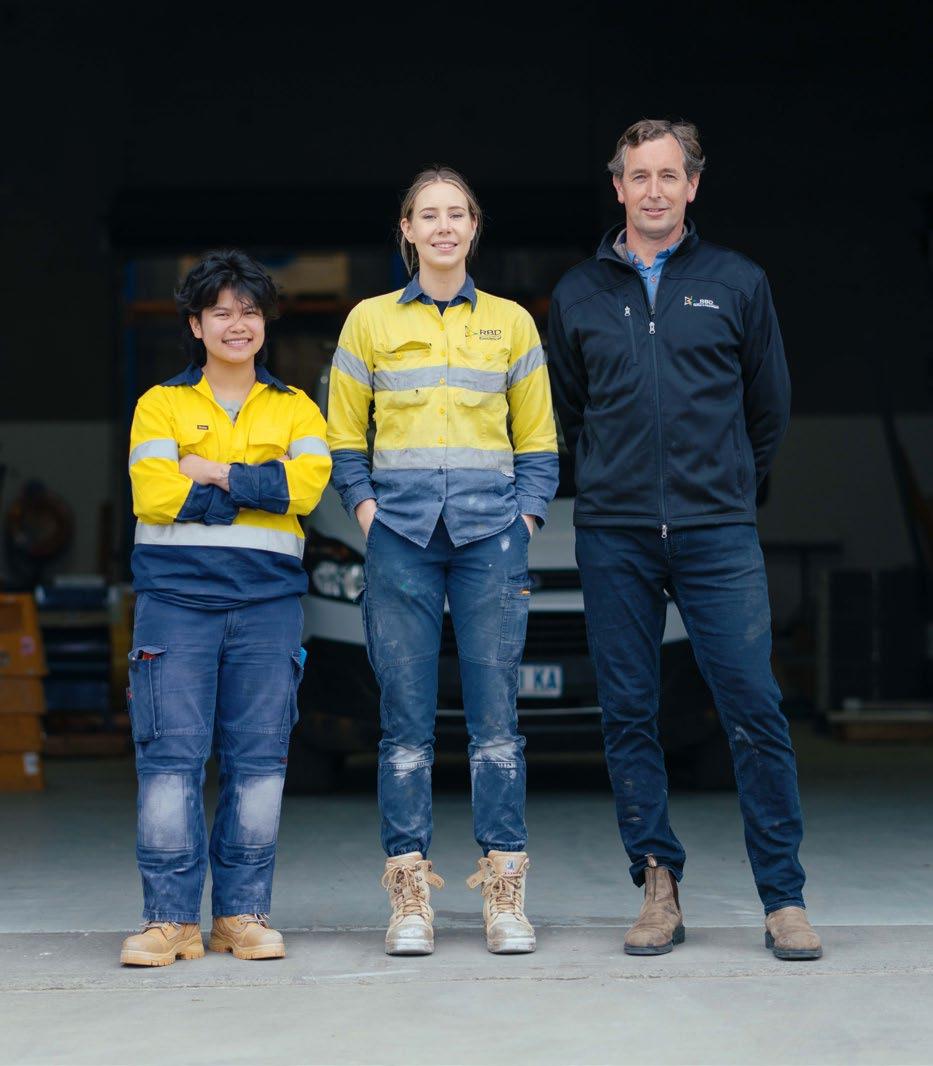
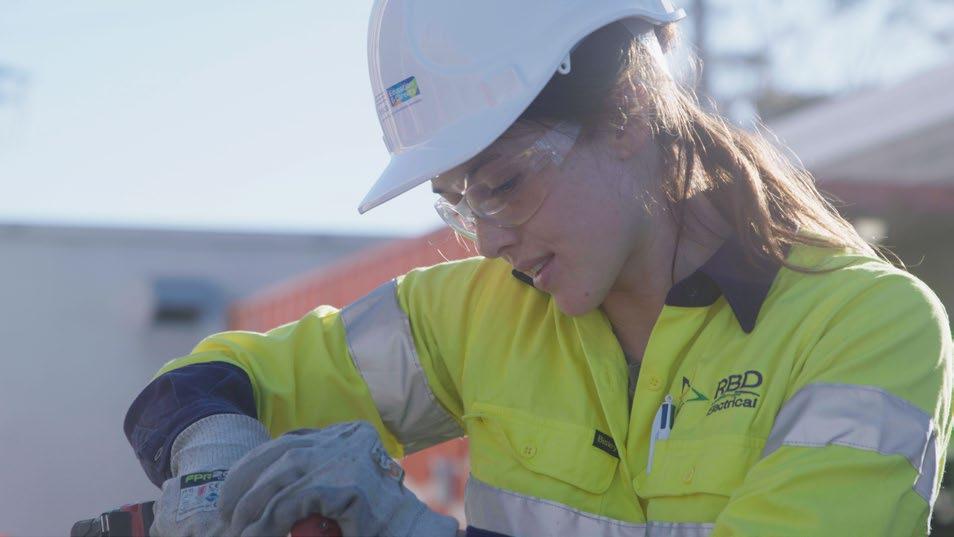
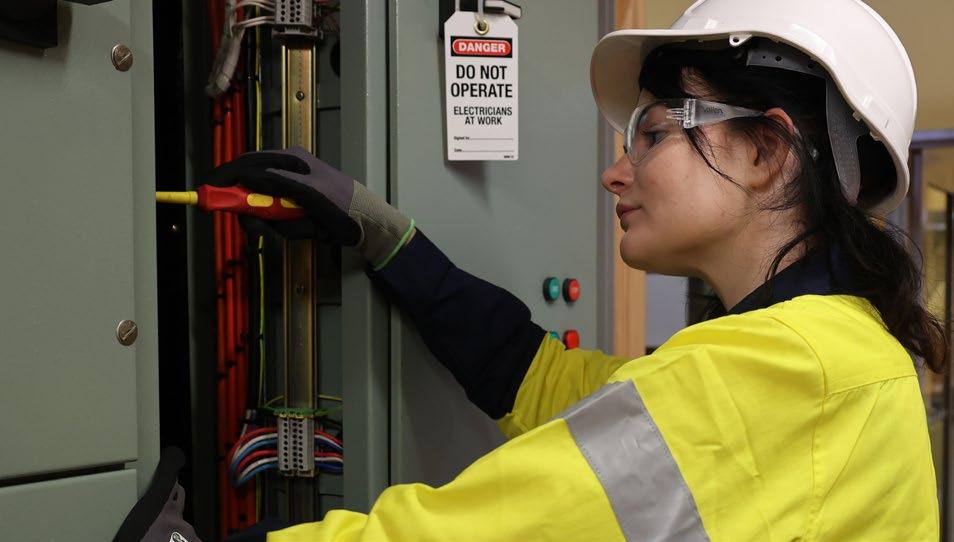
comes to those working on the tools,” Gary Vidler said. “We’re very pleased to have been able to create more pathways for women here in Tasmania, and to give host employers more opportunities to build stronger and more diverse teams.”
Around 15% of RBD Electrical’s apprentices are currently women, and Nick Davies couldn’t be happier with the attributes this has brought to his teams.
“All of our girls are fantastic,” Nick said. “Their attitudes to work, contributions to their teams, and willingness to try new things have been really impressive. The girls have introduced new approaches to problem solving and positive changes to our worksite dynamics. NECA should be proud of what they have achieved so far. The number of female apprentice applicants we’re seeing has increased significantly and I think that’s only going to gather more momentum.”
West Australian electrician Sam Martin has a lot to be proud of.
Sam began an electrical apprenticeship in 1989, at a time when women were rarely seen in the trades. She was the only female enrolled in electrotechnology at her trade school, and was told by several people along the way that she would never pick up a job once she had completed her studies.
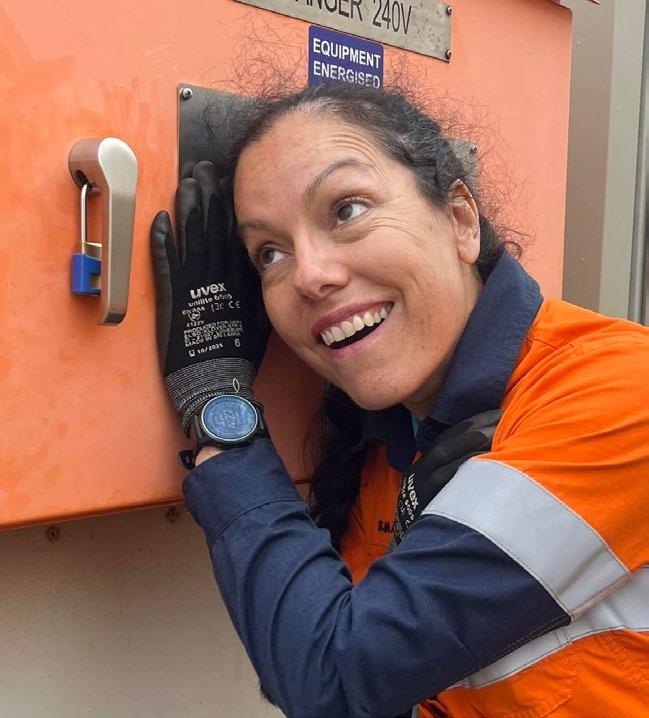
Three decades later, Sam has not only carved out a long and successful career in the trade, but beat more than 400 entrants to be voted ‘Australia’s Favourite Sparky’, in a competition run in 2022 by NHP Electrical Engineering Products.
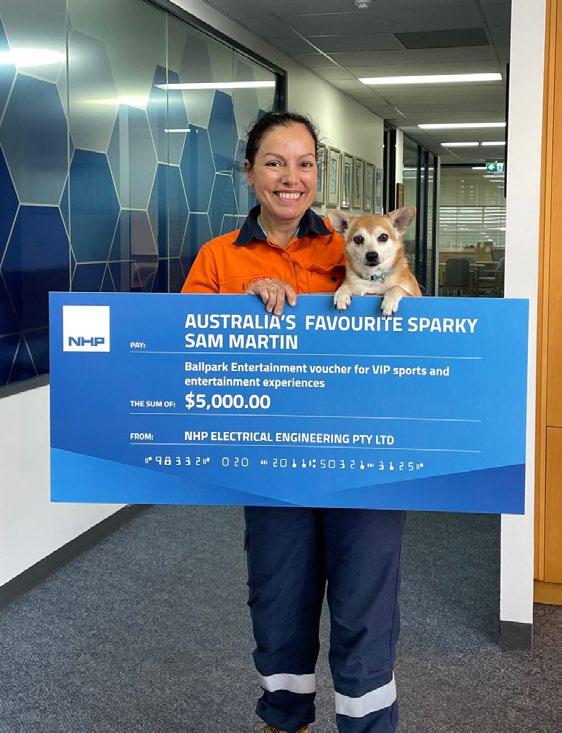
Sam is a passionate advocate for women entering trades, with her own interest in becoming an electrician sparked as a little girl. She could often be found following her father around as he installed air-conditioning and worked under the bonnets of cars.
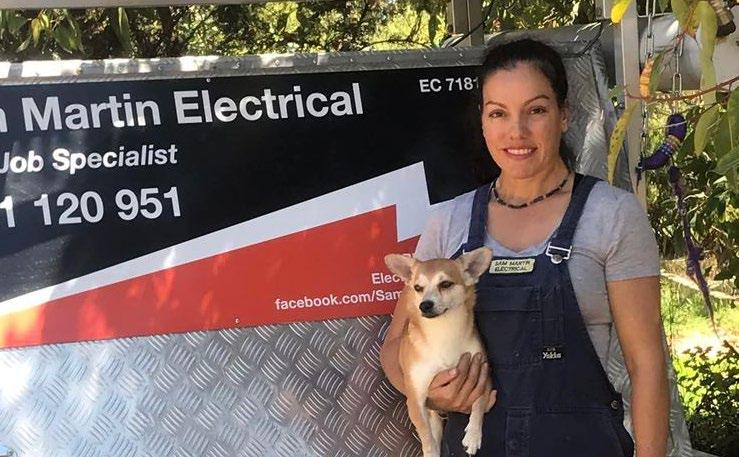
“I always try to encourage young women into doing a trade,” said Sam. “It’s kind
of too late when they reach high school. It should start in primary school, or even kindy. Girls forget, when they’re little they get covered in mud and it’s fun. Somewhere between then and high school that can get lost.”
Sam has successfully run her own business since 2001 and proudly states that she has never been unemployed. Whilst in the early days she cut her teeth on building maintenance work and installing and commissioning industrial equipment, Sam now finds her greatest sense of fulfilment in advising clients on how to achieve the best solutions for their needs.
“I love a challenge, and love it when I can stand back at the end of a job and watch the customer’s face light up as everything comes together,” Sam said. “When I’m able to exceed a customer’s expectations and add value to their premises, it’s just the best feeling ever.”
Sam is always encouraging girls of all ages with aspirations of becoming tradies, and is only
too happy to share her skills and experiences with others.
“A lot of women look at it and think they won’t be strong enough, but for the electrical trade it’s good to be small, because you need to get into tight spaces. I get to work outside while listening to music, stay physically fit and can even bring my dog to work. There are lots of benefits both physically and mentally and what could be better than that!”

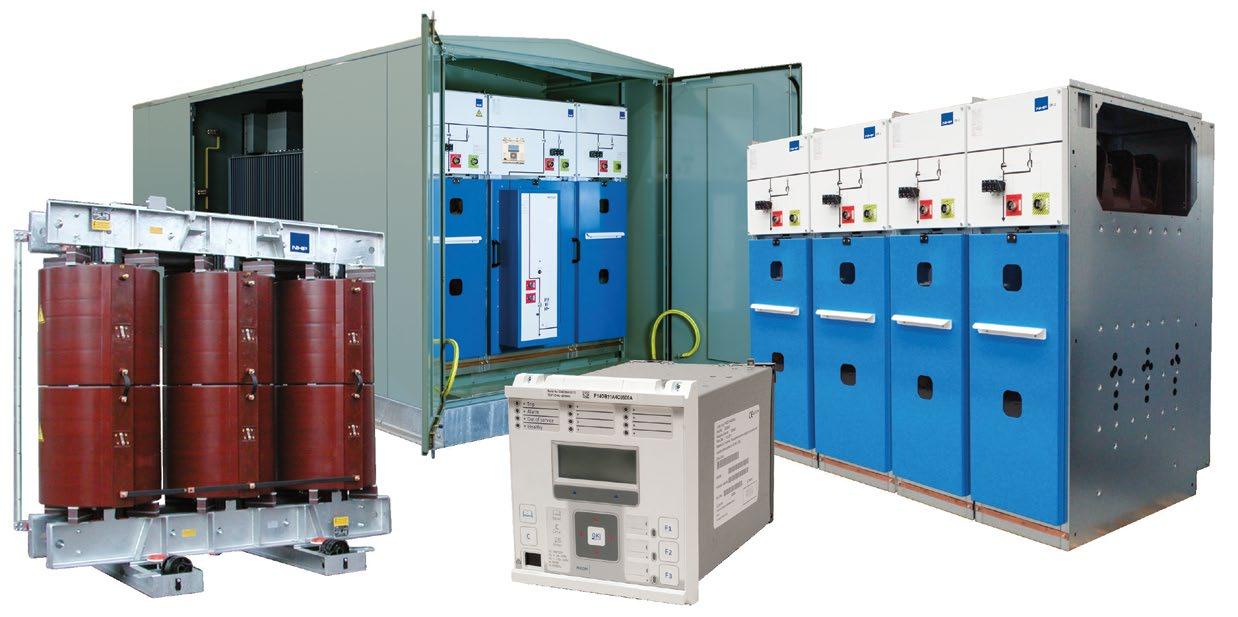
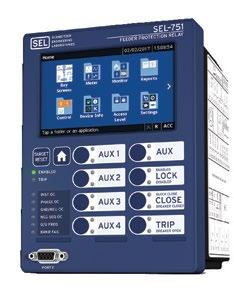
MORGAN SUTTON AND SOPHIE HUDDLESTON ARE TWO OF FOUR FEMALE TRAINERS AT NECA ACT’S CENTRE OF EXCELLENCE. THE CENTRE, WHICH ALSO BOASTS A FEMALE MANAGER, AND TRAINS OVER 200 APPRENTICES FROM THE ACT REGION, MORE THAN 15% OF WHOM ARE FEMALE.
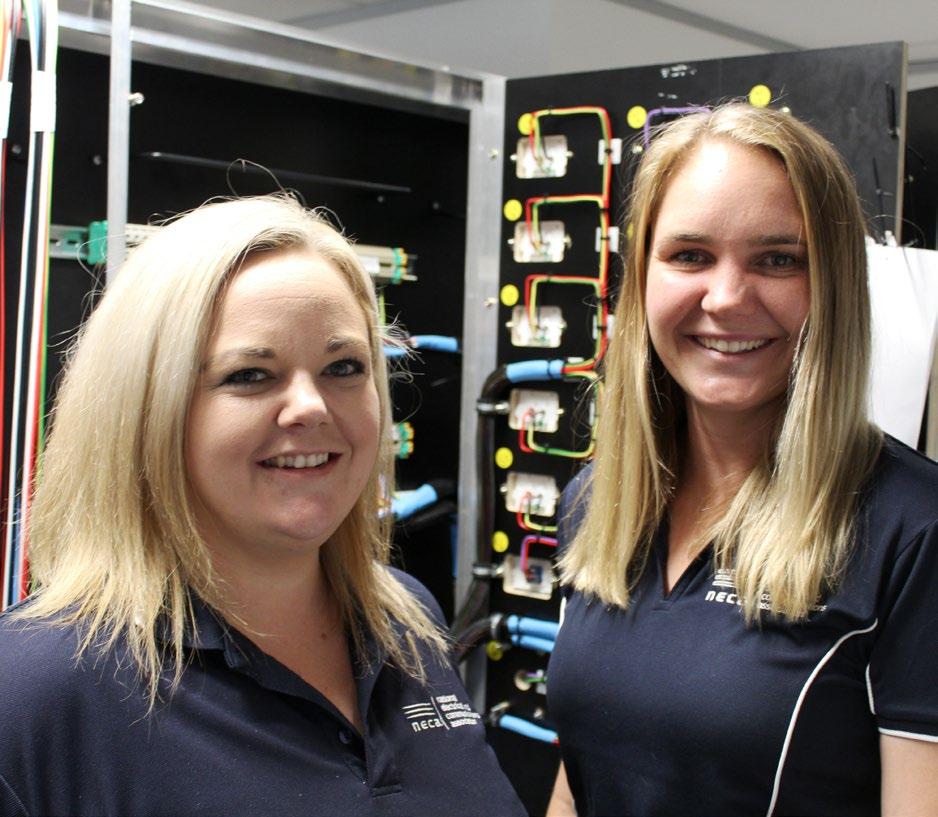
“The media exposure led to an opportunity with NECA and with a young family, long hours, the challenges of chasing payments and the constant search for good staff, I thought trade teaching could be an exciting career move.”
Sophie also decided to take on a training role with NECA as she was looking to start a family and the career change offered her more flexibility than working in the field. “My previous employer was very accommodating and offered me an opportunity to move into estimating, but it was not really what I wanted to do,” Sophie said.
Both women have excelled in their new endeavour, with Morgan’s Dad being so inspired, he recently joined the NECA training team too.
For Morgan, an electrical career wasn’t her first choice; she began studying nursing after leaving school. “I was working in end-of-life care and quite enjoyed the role, but Dad was looking for someone to take over the family business,” said Morgan.
“I’m always up for a challenge and with Dad being a sparky I had a pretty good idea of what was involved. So, with my six-month old son in tow, I began an electrical apprenticeship working with Dad.”
Sophie didn’t begin her working life as a sparky either. She completed a teaching degree before realising that wasn’t where she wanted to be.
“It was over beers one night that a mate said he was looking at changing careers and becoming an electrician, and I thought that’s something I
wouldn’t mind having a go at too. I did a ten-week Certificate II course, and, before I had completed it, I had secured an apprenticeship and was enrolled in my Certificate III.”
Midway through her apprenticeship, Sophie relocated from South Australia to the ACT and received a job offer from an employer while she was enroute to her new home.
Morgan had a short break from her apprenticeship too, taking time out to have her daughter before going back to the tools and winning the ACT Skills Canberra Apprentice of the Year (from a field of apprentices across all construction trades), the Construction Industry Training Council’s award for Outstanding Electrical Apprentice of the Year, and the award for Outstanding Woman in a Non-Traditional Trade.
“I really enjoy the challenges of training and the variety of questions you are asked,” Morgan said. “It keeps your skills relevant across a wide range of applications as you’re teaching students from many different aspects of the trade.”
Sophie said, “It’s great seeing the apprentices when some of the more difficult concepts begin to sink in. We both get excited about their achievements, and it’s just the best feeling when you see them finish their capstone, knowing you have been part of their success.”
If you are interested in finding out more about a career as a trainer with NECA, contact your local branch.





IT IS NO SECRET THAT THERE IS A LACK OF GENDER EQUITY IN THE AUSTRALIAN ELECTRICAL INDUSTRY. THIS GENDER IMBALANCE CAN BE OBSERVED IN THE MIX OF ATTENDEES AT TRY-A-TRADE DAYS AND IN PRE-APPRENTICESHIP, APPRENTICESHIP AND POST TRADE ELECTRICAL COURSES, THROUGH TO THE GENDER BREAKDOWN OF ELECTRICAL WORKERS AND OWNERS OF ELECTRICAL CONTRACTOR BUSINESSES. AT THE SAME TIME, AUSTRALIA IS GRAPPLING WITH AN UNPRECEDENTED ELECTRICAL SKILLS SHORTAGE, WHICH IS ONLY EXPECTED TO WORSEN, AS DEMANDS FOR ELECTRICIANS INCREASE DUE TO RAPID TECHNOLOGICAL ADVANCEMENT, THE GROWTH OF GREEN ENERGY AND CARBON EMISSION REGULATIONS.
To ensure the electrical industry can adequately cope with the current and forecasted demand, we need more workers and we need them now. So where can we look? The biggest untapped resource for electrical workers is women. Yet, despite the modestly growing momentum from efforts to encourage more girls and women to join the electrical trade, in 2023 only 2% of electrical workers in Australia are female.
So, what can we do to change this? What tangible actions can we make at both an individual and business level to make our own workplaces more diverse and inclusive? And what can we learn from businesses who are already leading the way in this area?
A plethora of research highlights the many benefits a diverse and inclusive workplace can bring to business. Not only can a diverse workforce enhance innovation and problemsolving, studies also reveal how increasing the number of women and underrepresented groups (especially in leadership roles) in a business can positively impact on profit , collaboration and the wellbeing of all workers.
Perhaps the fact that so many studies focus on making a business case for diversity in the first place, is a major reason behind the failure of diversity-related initiatives. On
a human level, economic benefits should not be the main justification for making workplaces more diverse and inclusive. In their 2020 Harvard Business Review article ‘Getting Serious About Diversity: Enough Already with the Business Case’, Ely and Thomas explore this idea in detail, stating that:
We should make the necessary investment because doing so honours our own and others’ humanity and gives our lives meaning. If company profits come at the price of our humanity, they are costing us too much.
Ely and Thomas emphasise that merely employing a diverse workforce does not guarantee that a business will automatically reap the rewards of improved innovation and collaboration. In fact, workplace conflict and tension may increase without the appropriate support, culture and organisational structure.
Simply ensuring an employee has a seat at the table is not enough. It is essential that workers feel valued and have a genuine opportunity to contribute to the agenda and influence decisions. Good performance should be rewarded with more opportunities to participate and progress within the company. Ely and Thomas refer to this approach as the learning and effectiveness paradigm. They maintain that companies who embrace this approach will see the most success from having a diverse workforce. More information is available at www.bit.ly/3xR2ibd
The sentiments of Ely and Thomas are echoed by the Hon Mary Wooldridge, Director of Australia’s Workplace Gender and Equality Agency (WGEA). Woolridge maintains that in order for change to be successful, gender equality must be prioritised by leadership and be central to the business’s strategic objectives.
Statistics show that gender equality progress is stalling. The WGEA’s annual Employer Census on gender equality collected data from approximately 10,000 employers and 4.5 million Australian employees and, for the first time, the gender pay gap did not change between 2022 and 2021, remaining at 22.8% for both years. The WGEA states that the actions of employers are crucial to accelerating the speed of improvement for gender equality.
The WGEA website at www.bit.ly/3Eqvjhl is a great starting point for businesses wanting to do more to improve workplace gender balance and attract more women to consider joining the electrical sector. From providing advice on creating a business gender strategy to best practice recommendations for communication, pay equity and flexible arrangements, the WGEA provide an abundance of resources to assist businesses of all sizes.
So, what can we learn from other businesses who are kicking goals when it comes to attracting and retaining more women to work in the Australian construction sector?
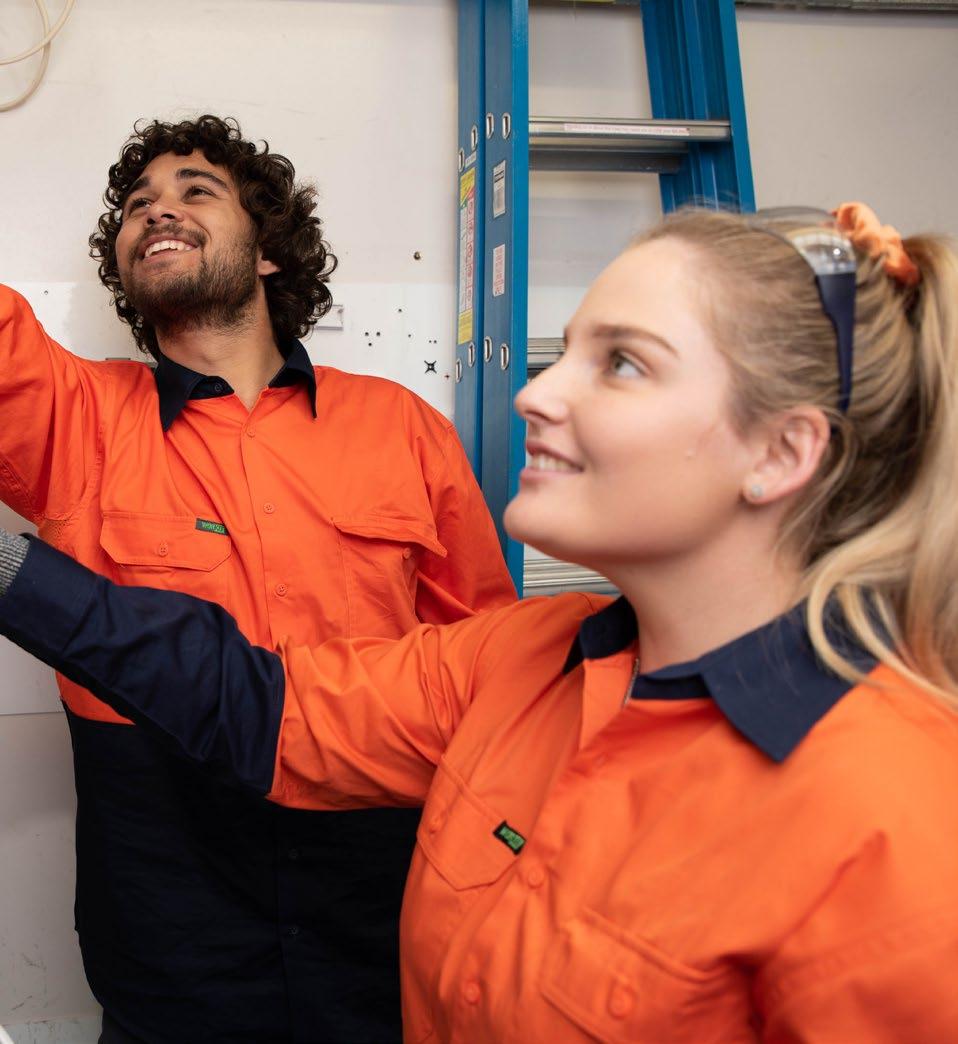
Let’s turn to global engineering and construction company, Laing O’Rourke, winners of the 2020 and 2022 WGEA Employer of Choice Award for Gender
Equality. Setting themselves a notable gender balance target of 50/50 by 2033, they believe their success comes from developing initiatives that produce sustainable change.
Laing O’Rourke began the process of change four years ago, introducing a Gender Diversity Action Plan that focusses on recruitment, retention and promotion. By September 2022, female participation had increased from 26% to 35%, the number of
women in senior leadership roles on projects went from 11% to 19% and the female composition of their Australian Executive Committee grew to 45%.
With a progressive stance on equal parenting, any Australian employee who is their baby’s primary caregiver can access up to six months parental leave on full pay. Between September 2021 and September 2022, there’s been a 50% increase in the number of men accessing this leave. Additional leave for staff who experience a pregnancy loss was also introduced in 2022.
Laing O’Rourke acknowledge that traditionally, construction work does not favour parents. However they are working to make changes to the work itself and the expectations of clients to better support their staff, regardless of gender, during the parenting life stage. More information on their impressive initiatives can be found at www.bit.ly/3Zaexev
It’s a challenging time for businesses in the Australian electrical industry, as it
becomes increasingly difficult to source the number of skilled workers needed to meet industry demand. Encouraging more women to join the trade could go some of the way to ease this shortage; however, businesses must ensure that they are doing everything they can to provide an inclusive workplace that genuinely supports gender diversity.
As stated by the Hon Mary Wooldridge, “Employers must realise that unless they make their workplaces attractive to and supportive of all genders they cannot, and will not, attract and retain the best talent.”
1 Catalyst, Why Diversity and Inclusion Matter: Financial Performance (June 24, 2020)
2 Bear, Julia & Woolley, Anita. (2011). The Role of Gender in Team Collaboration and Performance. Interdisciplinary Science Reviews. 36. 10.1179/ 030801811X13013181961473. – bit.ly/3Zjvint
Cassells R and Duncan A (2020), Gender Equity Insights 2020: Delivering the Business Outcomes, BCEC|WGEA Gender Equity Series, Issue #5, March 2020 - bit.ly/3Z4CHYm
The only U.S. aircraft to fly on that infamous day other than essential fighter and reconnaissance aircraft, her mission to evacuate a military personnel member was a life-anddeath situation. Drawing on talent and tenacity under exceptional circumstances, Cherish and her team were able to work together to save their patient’s life.
As a member of the U.S. Air Force and an instructor pilot, veteran of active service in the middle east, Commander of the Australian post of Veterans of Foreign Wars and a former aviation (pilot studies) lecturer, technical excellence, leadership focus and a commitment to delivering on mission are standard operating procedures for Cherish McNamara. These skills have also seen her flourish in her recent appointment as College Manager of the College of Electrical Training (CET) in WA.
A visit to an air show as a teenager sparked Cherish’s affinity for aviation. Supported by her parents – who she accepts perhaps didn’t quite realise the extent of her dedication to her goal until her graduation ‘winging ceremony’ – Cherish believes early exposure to a variety of options is important to help spark ideas and professional passions in young people.
“It’s through exposure that kids believe they can choose to be anything they want to be, whether you’re a boy or a girl. Kids may not understand what a passion is when
they’re young, they just know – ‘Hey, I love to do this’,” said Cherish.
“The more you expose kids to, you widen their future possibilities. You show them jobs they may not have known existed and they realise that they can go and do it,” she said.
“An important part of this is getting parents to understand pathways that really get their child where they want to be. If you want to be an electrician you have to be able to understand plans, and how to work with other trades, for example. This is where a trade college can be a better path over say an electrical engineering degree. It’s about multi-level exposure.”
For Cherish the opportunities have been varied and vast, and her competence and commitment have seen her excel at each.
A college degree is a prerequisite for U.S. Military Officers, and Cherish navigated her way through her studies along with medical, physiological, and psychological tests with flying colours. Her college graduation day was more memorable than most, receiving her bachelor’s degree in the morning, followed by her commissioning ceremony into the Air Force the same afternoon.

“I spent a year waiting to go to pilot training. All I wanted was to fly an airplane, that was my goal. Throughout training I was upgraded to Aircraft Commander, learned new airplanes, and became an instructor,” said Cherish.
“When I started I wanted to complete war service, but thought it was unlikely as the Gulf War had recently ended. Then September 11 happened, and of course everything changed. Suddenly, I’m in my mid to late twenties and the aircraft commander of a C130 flying in and out of Iraq and Afghanistan,” she said.
“It was unreal. There’s no other job in the world like it. It is mental, it is teamwork. It is exhilarating. It is scary. It is highly rewarding. It is all these things wrapped up in one job. Every mission was different. The crews that I had were phenomenal. I trusted my life with them and vice versa.”
Starting her career in a heavily maledominated field, Cherish fondly remembers the mentors and role models – male and female – who supported her aspirations and encouraged her development.
Recalling her first assignment out of college, Cherish said she was greeted by an inspirational female aircraft commander who was excited to let her know female bathrooms had recently been added to the facilities. Cherish laughed in her describing this as a vast improvement from previously having to ‘go’ outside, unlike their male colleagues.
While she faced some unfair assumptions in the field, Cherish said her assertive nature and support from her crew helped her overcome any detractors.
“I’ve had to tell marine colonels or army colonels that I’m the one in charge of this airplane. They’d be looking for the guy that’s the pilot in charge. And I’m like, well, that’s me! Sometimes they wouldn’t want to talk to me, they wanted to talk to my (male) crewmate. To which I’d say: ‘He’s my navigator. He can tell me and you where to go, but he can’t fly the airplane’,” she said.
“I also had my crew with me, supporting me. I had enough other people around me, enough brothers in the military who provided positive feedback and wanted to fly with me.”
After being honourably discharged from the U.S. Air Force in 2007, Cherish and her family moved to Sydney in 2009, before relocating to Perth in 2011. She is a passionate and proficient public speaker on STEM topics, and was welcomed as College Manager for CET in October 2022.
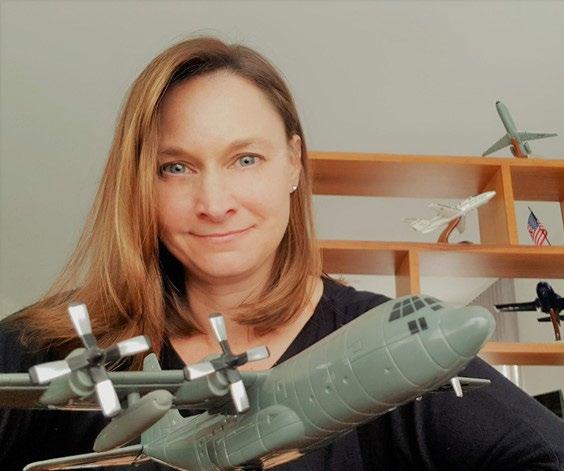
Cherish said equality in the workplace is an equal responsibility for all genders to advocate for, and further suggested conversations should centre more on the irrelevance of gender to task competency. It’s an idea she’s found has strong relevance to her new sector too.
“It comes down to people saying it doesn’t matter if you’re a male or a female. Whether you’re a pilot or an electrician, it doesn’t matter. An airplane is a metal object, and it has no idea if it’s a male or a female that is telling it what to do. There is no difference. It’s the same with wiring, for example,” said Cherish.
“Our mentality is purely our own mentality. It helps us to have men able to say, you know what?
I don’t care if it’s a man or woman doing this work,” she said.
Cherish says finding advocates and mentors remains important for this next phase of her career outside the military, and she encourages others to nurture their formal and informal networks of support.
“Since I’ve left the military, I’ve purposefully sought out females that are ahead of me. Maybe not necessarily where I want to go, but higher up the ladder,” said Cherish.
“I’ll sit down with them and ask questions. I’m not trying to replicate what they did, but to learn how, what decisions they made, how did they come to that decision, so I can give myself more information to go forward. It’s important to find people who support you and will be honest with you,” she said. “You have to have belief and confidence in yourself, and that’s only going to come from you.” Cherish herself is actively involved in developing the next generation of talent and supporting others. She’s the WA Chairperson of the Women in Aviation Australian Chapter, a member of Women in Technology WA Inc. (WiTWA), and the Commander of the first and only Veterans of Foreign Wars post in Australia, a global U.S. veterans organisation that undertakes community service and helps U.S. veterans find support with healthcare, medical issues and getting grants.
Thanks for sharing your incredible story with us Cherish – we look forward to seeing you soar with CET!
THROUGHOUT THE PAGES OF THIS EDITION OF NECA NEWS YOU’LL FIND STORIES FROM WOMEN WHO HAVE BEEN DOING INCREDIBLE THINGS WITHIN OUR INDUSTRY. CABAC BUSINESS DEVELOPMENT MANAGER, TRACY MILLER IS NO EXCEPTION. WITH MORE THAN 30 YEARS’ EXPERIENCE IN THE ELECTRICAL INDUSTRY, TRACY CERTAINLY HAS SOME COLOURFUL STORIES TO TELL, BUT OVERWHELMINGLY HERS IS ONE OF RESILIENCE, DETERMINATION AND AN INDUSTRY NOW EMBRACING DIVERSITY.
When we asked why she continued to press on with the trade despite these experiences, Tracy said, “I knew I could make a difference, I really wanted to be a sparkie and make good money and, to be honest – the more I was told I couldn’t do something, the more determined I became.”
challenges that sales brings. I love to tell people about how our products can make life easier for them through new and innovative lines, such as our Blue Monkey measuring tapes, Bardic lighting systems, or self-cutting cable ties. I’ve always been a talker, so sales seemed like a good fit for me.”

“Every time I go to site now, it’s fantastic. I see more and more women doing jobs across all levels of the trade,” said Tracy.
Beginning her apprenticeship back in the late 80s, Tracy was one of only two women completing an electrical apprenticeship at her trade school. Throughout her apprenticeship and early years on the tools, Tracy advocated to make life easier for female tradies, including the implementation of female bathrooms on worksites. Having endured some confronting experiences in the early years, Tracy has worked to pave the way for a more inclusive industry.
In the third year of her apprenticeship, Tracy took a 12-month break to have her son, but soon returned to continue her career. For Tracy, it was important to show not only her son, but other women in the trade, that they can do anything they set their mind to. Clearly her love for the industry and its challenges rubbed off, with her son now working as an assistant manager at an electrical wholesaler.
30 years on, and even though she’s now hung up the tools, Tracy can’t step away from the industry she loves. “I’ve been with CABAC for a while now, it’s a great team and I’m enjoying the
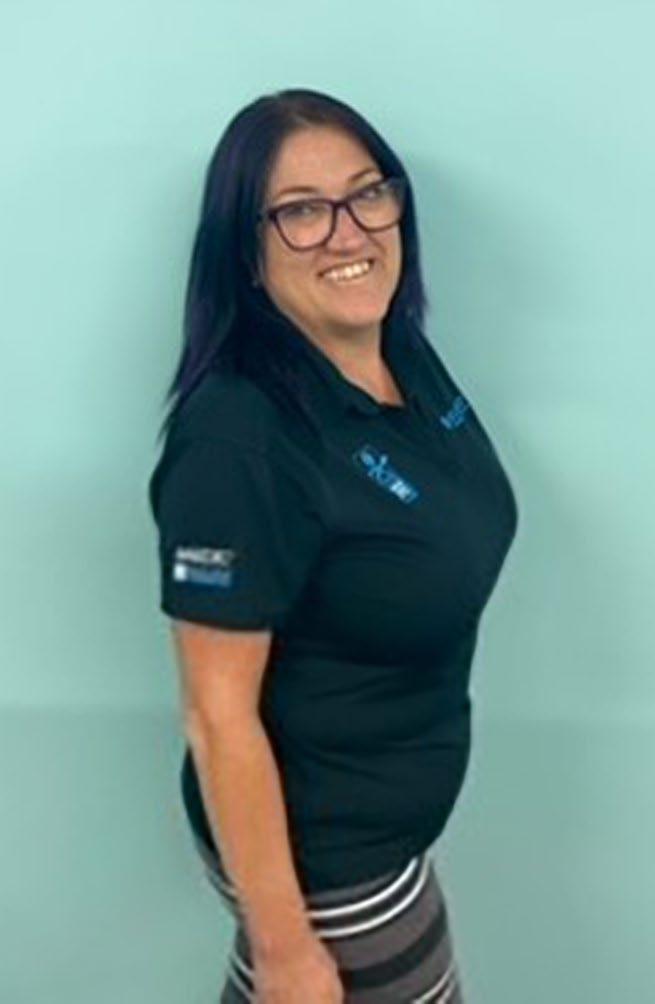

Tracy says she loves to see women succeed in traditionally maledominated areas. Her one piece of advice for someone considering a career as an electrician?
“Just do it. Once you have a trade, the possibilities are endless. Be confident and don’t think you’re any less than anyone else. We’re all equal and all deserve the same opportunities, so if there’s something you want in life go after it. You won’t be sorry you did.”
INTRODUCING
PHASE BALANCED LED DIMMER
PHASE BALANCED LED DIMMER
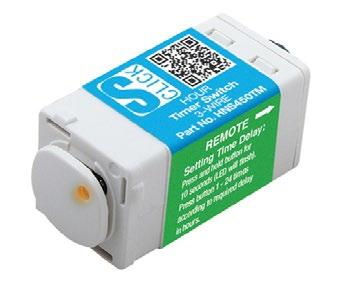
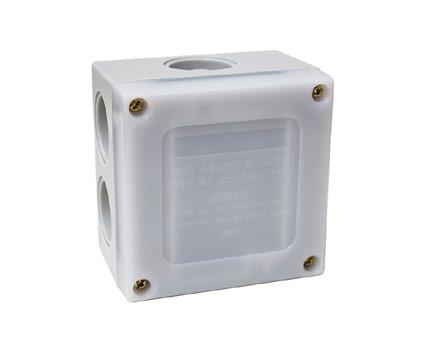
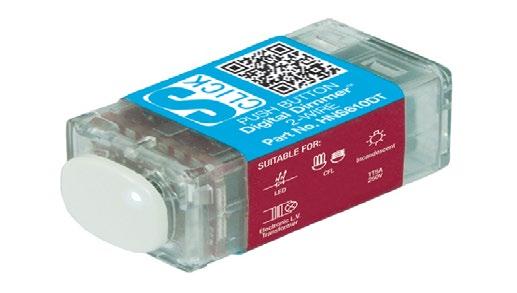
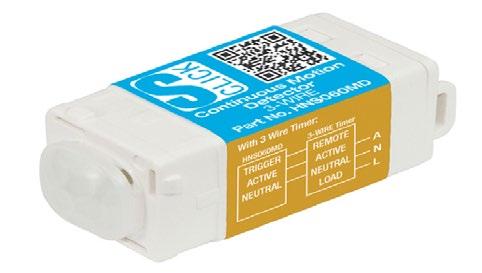
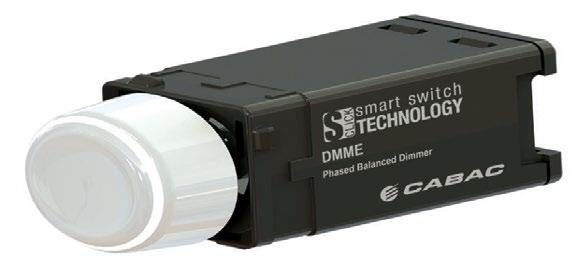
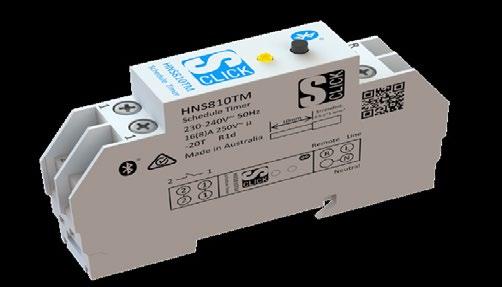
Part No. DMME
• Designed and engineered in Australia
• Rugged performance: over current, over voltage, and over temperature protection

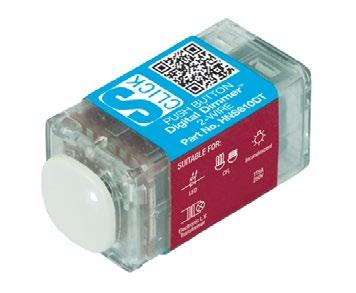
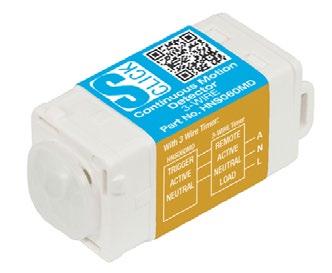



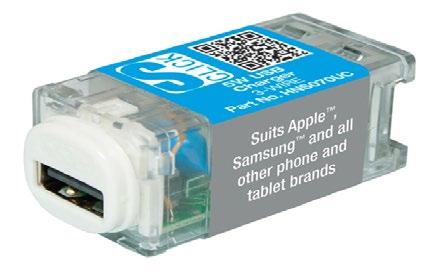


• Wide dimming range, with superior LED lamp compatibility
• Unique back and edge lit dimmer knob
DESIGNED FOR AUSTRALIAN ELECTRICAL CONDITIONS
INTRODUCING CABAC’S LATEST INNOVATION FOR AUSTRALIAN ELECTRICAL CONDITIONS
DESIGNED FOR AUSTRALIAN ELECTRICAL CONDITIONS
CABAC’S LIGHTING SYSTEMS RANGE
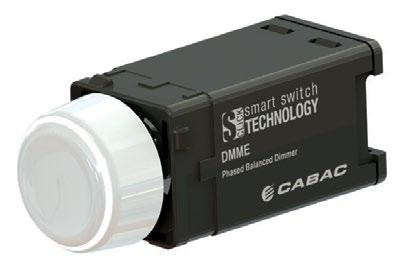



“At school, I always had an interest in the STEM subjects, and particularly liked biology and chemistry,” Julia said. “After leaving school I began studying medical science at university, before realising that wasn’t the career path I wanted to follow. I decided to take a gap year from my studies, and then Mum suggested that I look into an apprenticeship. Things just kind of took off from there.”
Julia settled on an electrical apprenticeship as it involved using physics and maths, and provided challenges in areas she already knew she enjoyed. “Once I had my mind made up, I started applying online to electrical companies to try and find employment,” Julia said.
FOR FORMER NECA APPRENTICE, JULIA BEDIN, 2022 WAS QUITE A YEAR. HAVING RECENTLY COMPLETED HER APPRENTICESHIP, JULIA ALREADY HAS A LONG LIST OF ACCOLADES TO HER NAME, BUT IT’S A SUCCESS STORY THAT VERY NEARLY DIDN’T HAPPEN.

Through NECA, Julia joined host employer Martin Donnelly, as their first female apprentice and she has gone from strength to strength ever since. “They never made me feel like I wasn’t good enough, or that things were any different being a girl. I was never treated differently and was really made to feel like part of the team.
“The first tradesman I worked with at Martin Donnelly was Jack Gervink. He was a great mentor, and the biggest role model I’ve had in the industry so far. It was a little daunting at first, being the only female and new to the job, but Jack was a fantastic support and really took the time to show me how things were done. He was very patient with answering my constant questions.”
In 2022, Julia took out the NECA ACT Apprentice of the Year award, the NECA National Apprentice of the Year (Commercial/Domestic) award, and the National Association of Women in Construction (NAWIC) Tradeswoman of the Year award. She is now working on the preliminary stages of the Australian War Memorial redevelopment, and Martin Donnelly has since employed another three female apprentices.
“It’s great to work alongside other women,” said Julia. “Since I began my apprenticeship in 2018 the number of women on site is growing every year, and construction sites are getting better and better at providing facilities to accommodate women. I often offer advice and reassurance to the younger
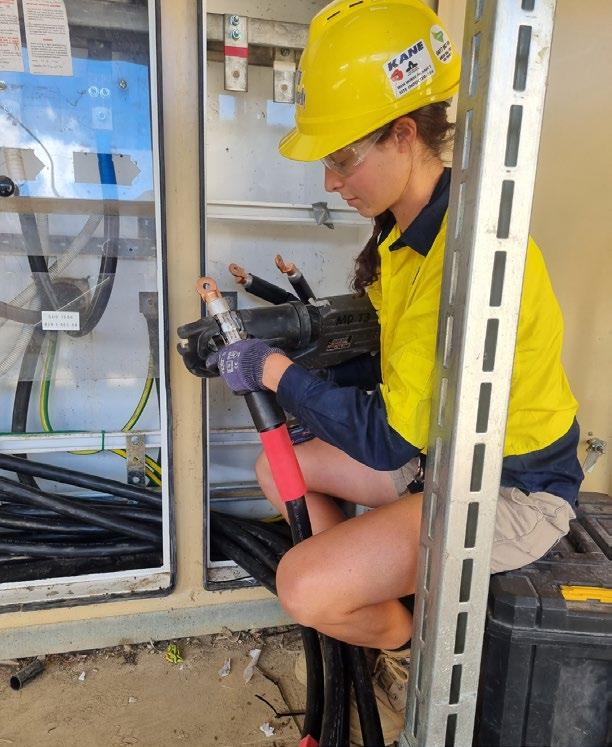
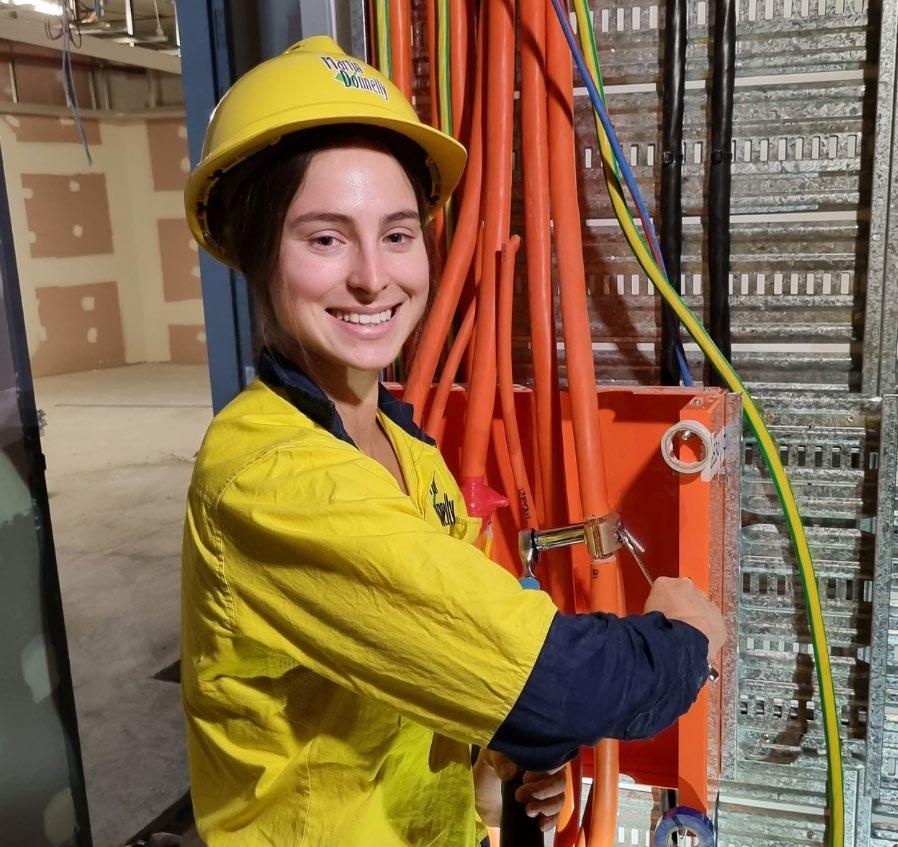
girls and hope that I can provide the same level of support to them as I received when I started in the trade.”
Julia will tell you that she loves the testing and commissioning phase of the job, and watching all of her hard work come together, but she already has her sights set on bigger things. “I’ve just enrolled in a Diploma of Construction Management course and am keen to get more involved in the Project management side of things.”
Julia’s advice to any woman considering an electrical career is, “Don’t be scared not to know things. You don’t have to be perfect to give it a go.”
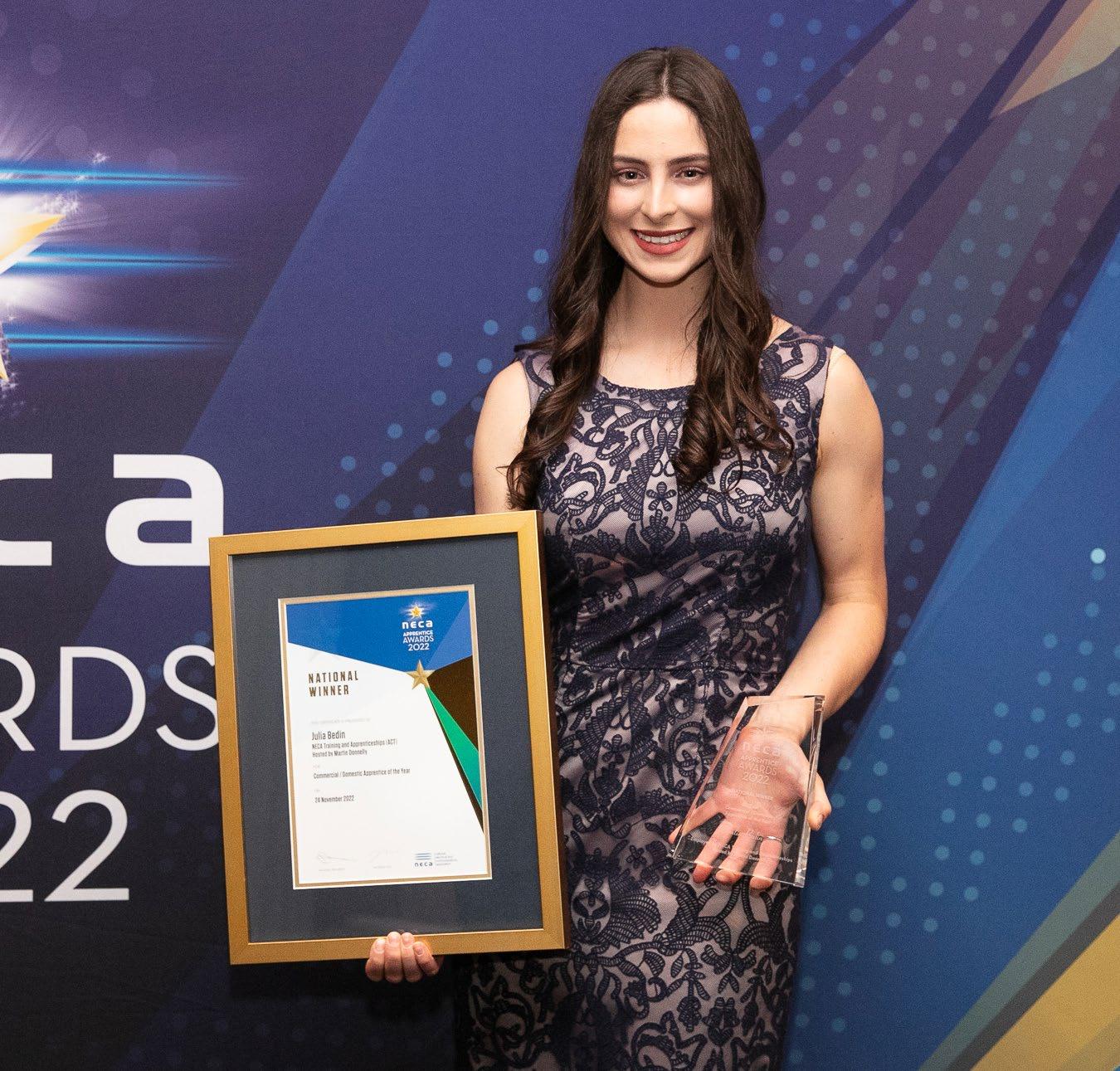
If you’d like to find out more about doing an electrical apprenticeship with NECA, contact your local NECA branch, or visit www.neca.asn.au
LGES “Check for Cheques”, as the name suggests, gives a monetary incentive for locating recalled LG Energy Solution batteries. There is a total prize pool of $100,000. Payment method will actually be more modern than a cheque!



1.Download on the app store.

2.Take a photo of a LG Home Battery serial number.
3.Register your details to win.
On a more serious note, the LG Energy Solution recall is important – affected batteries may catch fire, potentially causing property damage with risk of injury or death. We care about our customers, so we need your help.
Whether you are a homeowner, or visiting tradesperson, any opportunity you have to record the serial number of an LG or LG Chem branded battery earns you a chance to win a prize of $50, $250, $500, $1000, $2500, $5000 or $10,000!
For further information on the recall, call 1300 677 273 or email at productau@lgensol.com
Naila Alaoui began her career in Grenoble, Southern France, commencing an internship at Schneider’s research and development headquarters after completing a degree in automation engineering.

“As a child I was always interested in dismantling anything I could get my hands on,” Naila said. “I was always wanting to find out what was inside and how things worked.
“Everything my parents would give me would be taken apart, much to their despair. I had a set of walkie-talkies that were never used; I was more interested in finding out what was inside. I guess engineering was almost meant to be.”
Through making presentations about the innovations she was working on, Naila quickly realised that she also enjoyed the customer contact aspect of her job, and she moved into a business development role in connected solutions.
Soon after, Naila transferred to Australia and took on a role that combined her love of engineering and customer relations with a newfound passion for renewables and energy management, focusing primarily on new energy landscapes and microgrids.
“It’s super exciting to work in a field where everything’s new.
Everyone’s trying to figure out what’s happening around sustainability and renewable energy integration, and how we’re going to move forward.
“The shift towards renewable energy sources is not new and, at some point, we will no longer be able to rely on fossil fuels for our energy production. What we do know about our current methods is how to produce enough energy to satisfy demand. We are able to predict when to expect peaks, and the amount of electricity required to accommodate these loads. With renewable energy sources this becomes more difficult. We are unable to control when the sun will shine, or when the wind will blow, which presents the problem of being able to make renewable energy available at the times it’s needed, without it becoming prohibitively expensive or without people having to change their usage habits too much.”
With the increasing uptake of solar panels in Australia, many people who would have been electricity consumers, are now becoming electricity producers as well – known as ‘prosumers’. This may be a big step forward for consumer independence, but can be problematic when adding additional power back to the grid, impacting parameters such as voltage and frequency.
“Consumers will begin seeing more and more community batteries appearing to store the excess power being generated by households. This is an important initiative to ensure that surplus power is not wasted and disruption to the grid is kept to a minimum,” said Naila.
Schneider has a very focused approach to sustainability and energy transition, and has advanced microgrid solutions. Its aim is to allow users to gain visibility over what is happening within the microgrid, enabling control and optimisation by providing a complete end-to-end hardware and software solution. This allows the flexibility to prioritise whatever it is that is important to consumers, be that C02 emissions, cost reductions, uninterrupted supply, or any number of other usage cases.
“As this field expands, more and more employment opportunities are becoming available across many disciplines within the field. I would encourage anyone considering moving into this space, especially women, not to doubt yourself. It’s an exciting new field and you’ll really have the chance to help change the future of energy management,” said Naila.
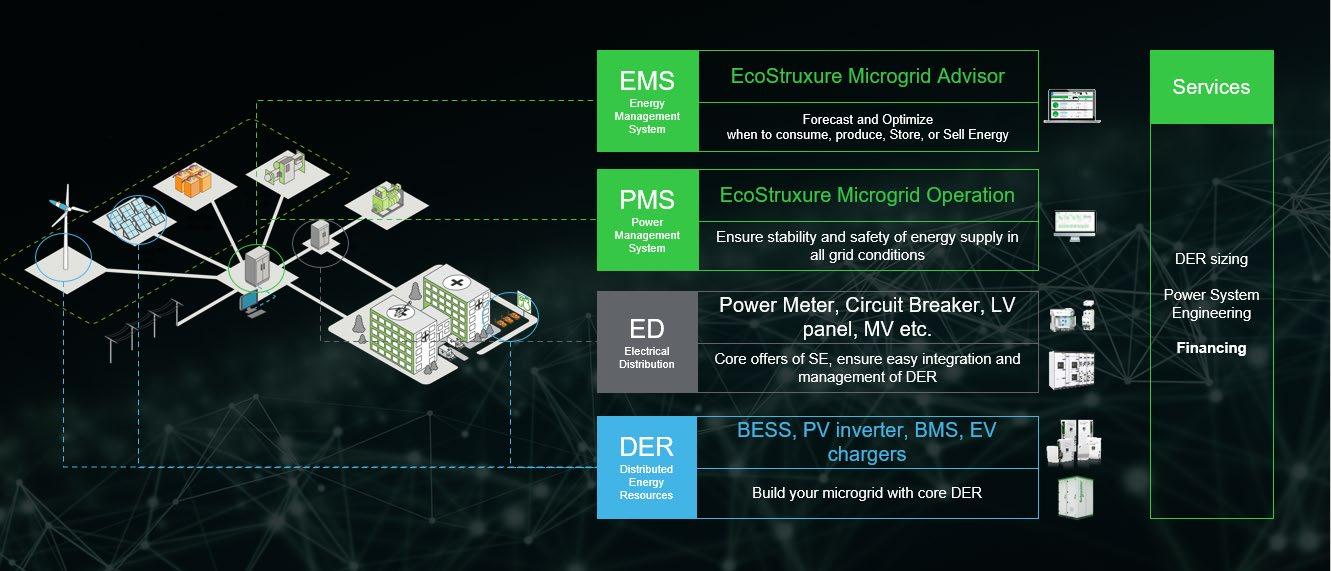
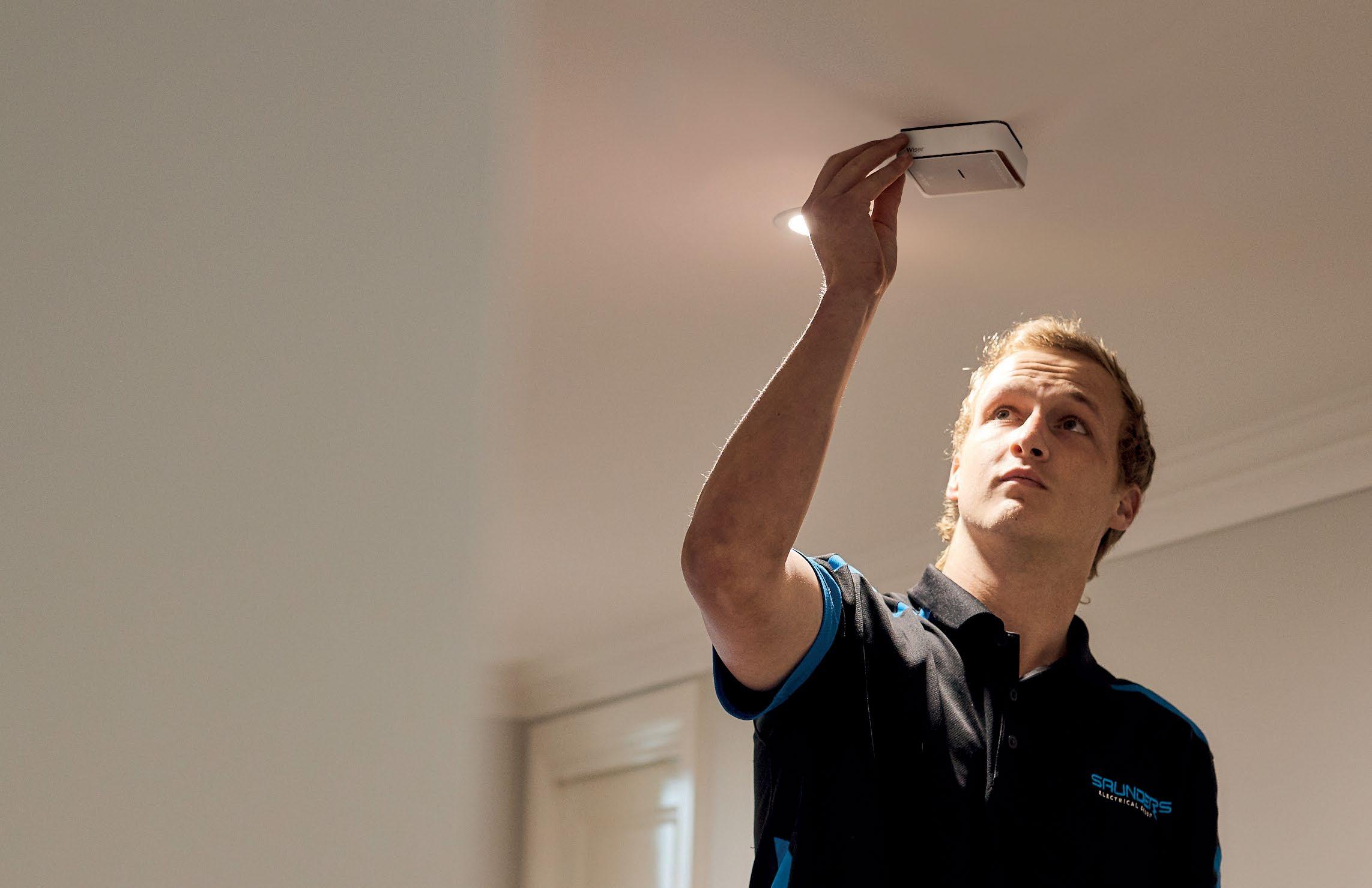
Introducing the new design award winning Clipsal Wiser Lithium Battery Smoke Alarm. Combining smart home functionality with important safety features to offer increased control and peace of mind for your customers.

Flexible applications with RF and Zigbee connectivity for use stand alone or with Wiser systems


Robust new dual spectrum smoke sensing technology
Wiser smart home app connectivity for automated control and notification alerts

Simple to install – slotted mounting holes and easy alignment

Order the new Wiser Smoke Alarms by requesting CLP599WSAL through your preferred wholesaler today. More models coming in 2023.
clipsal.com/wiser/electrician
CLP599WSAL
Welcome to the March edition of NECA News.
For this special edition of the magazine, I would like to take a moment to honour International Women’s Day by hijacking NECA QLD State Manager – Membership, Christopher Gradwell’s introduction.
Let us celebrate and recognise women who have made an outstanding impact in their respective fields! And what better way to start than to step back in time to over 100 years ago, where Florence Violet McKenzie led the way from being Australia’s first female electrical engineer to, in 1918, owning her own electrical contracting business, apprenticing herself to it.
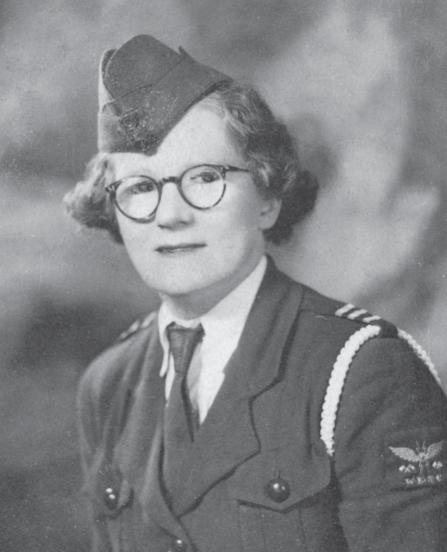
Over the years of working in the field herself, in the 1930s, Florence turned her attention to teaching other women about electricity.
Florence believed that electricity could save women from domestic drudgery, writing that:
To see every woman emancipated from the “heavy” work of the household by the aid of electricity is in itself a worthy object. And indeed, she was spot on!
Fast forward to today, and we have more women in the industry than ever before. We can proudly say that the number of women entering NECA, not only as apprentices but as industry leaders in this field, is growing each year, with women now representing over 15%.
Like all my colleagues at NECA, we are passionate about helping electrical contractors run their businesses better. We are dedicated to equipping them with the knowledge and resources necessary in today’s competitive and ever-evolving industry, as well as providing ongoing education and support that enables their businesses to grow.
Lastly, I would like to pay tribute to all females who continue to shape the industry with their insights. Whether they are in the office or on site, every woman plays an integral role in making our industry better. Let’s continue to strive towards a more diverse and inclusive industry, where everyone feels valued and respected. We are confident that with continued support, we can create an even better future for women in the electrical industry and an even better industry holistically.
Do you have a great story to tell about your recent project?
Nominations for the NECA QLD Awards are now open and we want you to show off what makes your business unique! Every NECA member has a chance to shine at the NECA Awards. Through three dedicated programs everyone from small businesses to larger established leaders in their field can celebrate excellence in our industry.

Excellence – The Excellence Awards provide members with the opportunity to showcase their best projects to their peers, industry, government and their local community. These awards are the ultimate recognition of being leaders in their field.
Small Business – For those businesses making an impact in the industry and deserve to be recognised at the highest level. This category has been created specifically around the work delivered by small businesses.
Apprentice – Recognises and rewards apprentices and their employers for outstanding performance and commitment to the industry. An excellent opportunity for employers who have dedicated time, effort and resources to the future of our industry.
This year we are excited to recognise and celebrate the accomplishments of those making a difference in energy by introducing two new award categories: Women in Energy (Individual) and Leaders in Diversity (Business). These serve as an inspiration for us all!
We know the industry is growing and we can’t wait to see what these award nominations bring – now is the time to celebrate all that you and your team have achieved.
Visit the NECA website for more details or connect with NECA Member Services.
NECA Qld State Manager – Membership, Christopher Gradwell, recently attended a social event hosted by Cetnaj (MMEM), with over 80 electrical contractors
gathered to kick back and watch an epic Super Bowl showdown. We received considerable positive feedback on the event, which provided an opportunity to informally network, while enjoying the showdown. Our thanks to all those members who attended and to Cetnaj for sponsoring this fantastic event.
Whilst at the Super Bowl event, amidst all the fanfare, a NECA member shared one of their recent experiences on a job site. They were completing some work previously done by another contractor, and found that the previous contractor had performed the works using unsafe practices that were not compliant with Australian Standards. Fortunately, the member contacted NECA’s technical team who supported them through their obligations as a contractor, including how to report the matter correctly so regulators could investigate further.

The issue sparked further conversations amongst our NECA team, in particular our technical experts and posttrade trainers, who are experienced electricians. They discussed their experiences of similar encounters with unsafe electrical works and how they navigated through their obligations.
Collectively, NECA’s team brings a wealth of experience combined with practical and compliance knowledge. If you find yourself in a similar situation, working on a non-compliant installation, we recommend that you connect with a NECA representative. As a NECA member you have unlimited phone and email support on Australia’s standards and rules, including the Wiring Rules, Service and Installation Rules, and Metering Rules, to ensure you always stay compliant.
Maintaining and growing a business requires time, energy and money; however, some circumstances lie beyond our control. To reduce risk in unforeseen situations, it is essential to consider your business obligations and select the appropriate insurance coverage.
Designed for small electrical businesses and sole contractors, The Essentials package offers comprehensive protection for both tools and accidental damage. This tier of cover can provide much-needed peace of mind as your business grows. If you would like to learn more about how NECAGuard can tailor your business insurance coverage, connect with a NECAGuard representative today.
What a great start to 2023 for NECA’s legal team. Recently our team helped a NECA QLD member recover $116,000 from a contractor who refused to pay for materials due to changes to a building design. The team took the matter to adjudication under the Security of Payments Act and submitted an application that outlined our member’s submissions, evidence and standing on the matter.
While the application was being reviewed, we received numerous settlement offers from the contractor’s legal representative. These offers were significantly lower than the total amount claimed and were rejected. Shortly after this, the adjudicator released the determination and our member was awarded the full amount of the payment claim. The adjudicator also determined that all of the adjudication fees were payable by the contractor.
NECA’s legal team are very experienced in debt recover matters and can assist you with a FREE NECA Member Letter of Demand. This letter is a formal notice tailored to your individual circumstances.
If you are having trouble receiving a payment, connect with our legal team for the recovery of your debt. As a NECA member, you receive unlimited basic phone and email enquiries with our in-house legal team on all matters including debt recovery, retention of monies, and drafting and reviewing contracts.
NECA is calling all members to be aware of the latest WorkSafe incident where an electrician was fined more than $100,000 for performing non-compliant and unsafe electrical work in South-East Queensland, in contravention of the Electrical Safety Act 2002 (Qld), over a 13-month period.
Our research shows nearly four out of five electrical contractors are at risk of fines due to unsafe electrical work. An alarming 87% lack a complete understanding of energised work or the appropriate safety controls to remain compliant. Almost half of all necessary electrical works don’t have safety observers present. On top of that, apprentice supervision is lacking with 6% of contractors leaving apprentices entirely unsupervised. Such disregard for industry regulations puts many businesses on course for compliance trouble.
To ensure that your business is complying with all safety regulations, NECA has included an annual NECA Confidential Safety Audit for all members as part of their NECA membership. If you would like to know more, scan the QR code to connect with a NECA representative.
Note: The review will identify any potential blind spots in your safety protocols to help you protect yourself, and your employees, from costly fines and injuries. All findings of the comprehensive review are confidential.
The death of a construction worker in late 2022, who was electrocuted when a metal shed frame contacted a high voltage overhead power line, has highlighted this often-overlooked risk that construction companies must address on site.
Enquiries by the ESO indicate the frame was being moved on site by a crane when the worker tried to stop it from striking a nearby vehicle. It was not known that the metal frame had made contact with an overhead power line at the time.
NECA warns members that the most common electrical risks associated with working near overhead power lines are:
½ electric shock causing injury or death;
½ arcing, explosion or fire causing burns (arcing, explosion or both occur when high fault currents are present); and
½ fire causing property damage.
Hazards from overhead power lines may arise from:
½ something the person is holding, or is in contact with, coming too close to them;
½ operating plant such as a crane being too close to them; or
½ building structures being close to them.
It is important to be vigilant when working anywhere near overhead power lines, and effective control measures for working near overhead electric lines need to be put in place. This includes eliminating the risk of electric shock by de-energising or re-routing the electricity supply with the relevant electricity entity.
If it is not reasonably practicable to eliminate the risk of contacting overhead power lines by de-energising or re-routing, you must consider using a combination of control measures.
If you must work near power lines, you should follow these steps:
½ develop a safe system of work before you start work;
½ avoid going into exclusion zones (within three metres for up to 132 kV lines and six metres for up to 330 kV lines) – remembering that power lines sag or sway in hot or windy weather;
½ keep your workers and contractors informed about electrical safety.
NECA reminds members when working on site to identify hazards and manage risks to health and safety in accordance with WHS Standards and Regulations including Work Health and Safety Act 2011, Work Health and Safety Regulation 2017, and the Codes of Practice for construction work (PDF, 1014.41 KB) and work near overhead power lines (PDF, 3569.89 KB).

Sorting your SWMS need not be a tedious task. NECA Members can download SWMS specific to your worksite needs from NECA Member’s Knowledge Base including:
½ Overhead Powerlines SWMS
½ Electrical SWMS
½ Work at Heights SWMS
½ Asbestos SWMS
½ General Trade Work SWMS
½ Ladders SWMS
½ Electrical Installation SWMS
½ Verification Testing SWMS
½ Cable Installation SWMS
For more information, speak to a NECA Representative.
the
Hydrogen is a versatile fuel gas that can be used to produce heat, light or power. It is derived primarily by splitting water or reacting with other fuels with steam or controlled amounts of oxygen. While hydrogen has served mostly as an input into various industrial processes, it has the potential to be used across a number of applications.
Hydrogen industry businesses may be involved in projects that require electrolysers as part of a hydrogen production installation or designing and installing hydrogen fueling stations (refuellers).
Regardless of where electrolysers are sourced, in order to meet Queensland regulatory installation requirements, they must comply with Australian Standards and all electrical equipment used, designed, manufactured, imported and supplied must be electrically safe. This means electrical installations or equipment in a hazardous area must be designed, constructed, operated and maintained so they cannot release enough energy to cause an ignition.
The NECASafe team reminds members that in Queensland all electrical installations in hazardous facilities need to engage an accredited auditor appointed under the Electrical Safety Act to sign off the installation before it can be energised.
A NEW centralised hub of the best source of industry information, available only to NECA members. The NECA Member’s Knowledge Base (MKB) includes health, safety, quality and environment (HSEQ) documents and safe work method statements, industry Australian Standards, toolbox talks, and hundreds of other templates including legal, human resources and industrial relations.
Speak to a NECA representative for a virtual tour.
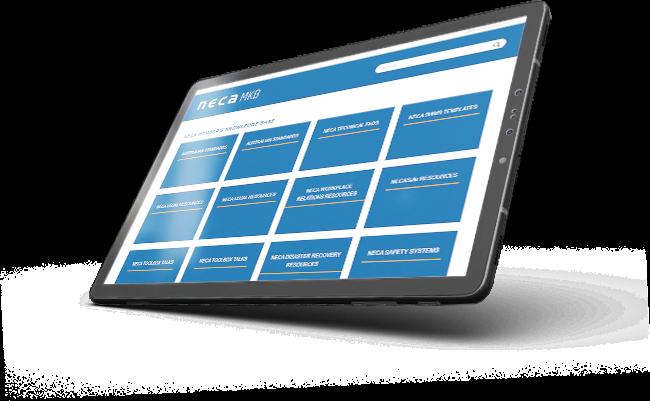


THE CODE OF PRACTICE 2022 (THE CODE) WILL COMMENCE ON 1 MAY 2023. THE CODE OUTLINES HOW PERSONS IN CONTROL OF A BUSINESS OR UNDERTAKING (PCBUS) CAN MANAGE RISKS ASSOCIATED WITH RESPIRABLE CRYSTALLINE SILICA (RCS) AT THE WORKPLACE, AND WHAT THEY NEED TO DO TO COMPLY WITH LEGISLATION.
As well as construction work, the code applies to the manufacturing of all construction elements, materials or products that contain one percent or more crystalline silica. These include:
½ cement, concrete, and aggregates, including precast concrete products such as fibre-cement sheeting;
½ bricks, tiles, blocks, pylons and pavers;
½ grout, mortar, asphalt, sand and stone;
½ wall panels; and
½ geosynthetics.
The Code includes references to the Electrical Safety Act 2002 and Electrical Safety Regulation 2013
One of the most common areas where electrical work involves silica is drilling holes into silica-containing materials. The Code requires the following for handheld and stand-mounted drills (including impact and rotary hammer drills):
½ use a drill equipped with a commercially-available shroud or cowling with a dust collection system;
½ operate and maintain the tool in accordance with the manufacturer’s instructions to minimise dust emissions;
½ the dust collector must provide the air flow recommended by the tool manufacturer, or greater, and have either:
½ a tool-mounted high efficiency particulate air (HEPA)filtered dust collector; or
½ an on-tool capture hood connected to a dust extractor/vacuum rated to either M or H-Class in accordance with AS/NZS 60335.2.69.
½ when cleaning holes, use a vacuum rated to either M or H-Class in accordance with AS/NZS 60335.2.69.
Silicosis, is a debilitating, and often fatal disease caused by exposure to RCS dust. Cases of silicosis have been rare in Australia for the past 60 years; however, cases are now on the rise with an increase in the use of engineered stone. In response, the Australian Government created the National Dust Disease Taskforce.
The Taskforce developed a national approach to prevent, identify, control and manage occupational dust disease in Australia. In 2021 they provided their final report to the Australian government before ceasing operation, and in April 2022 the Australian, state and territory governments released their response to their report. The response shows a strong commitment from all governments to reduce incidences of silicosis and other dust disease among workers, and to increase the quality of life for those people and families affected by the disease.
In Queensland, work around RCS is deemed as high-risk construction work, making SWMS a requirement. The requirement for a silica SWMS is now necessary across most parts of Australia. This is a welcome step in protecting workers from silicosis. However, it is important that all PCBUs across Australia are aware of the risks associated with silica dust exposure and take steps to ensure their workers are protected.
NECA’s High-Risk Construction Work Silica SWMS has been updated to reflect the changes. The updated SWMS includes new formatting and updated controls, such as the use of water suppression systems and wearing appropriate respiratory protection. By implementing these controls, workers can help to reduce their exposure to silica dust and reduce the risk of developing a potentially deadly lung disease.
Exclusively to NECA Safety subscribers, the silica SWMS is now available via Safety GEN and EmploySafe. The benefits of a NECASafe system include:
½ additional support and services from the HSEQ Team;
½ full access to the NECA Safe Library with the latest versions of policies, procedures, SWMS etc, which includes the most up-to-date information and guidance on managing health, safety, environment and quality within your workplace;
½ the ability to save time and money by having all the information you need to comply with the relevant health and safety regulations in one place;
½ the peace of mind that comes from knowing you are doing everything you can to protect your workers.
NECA Confidential Safety Audits, conducted on businesses that have subscribed to one of our NECASafe systems, have shown improvements in their overall safety and compliance.
With the changes to work health and safety reforms underway, it is now more important than ever for businesses to have an updated silica SWMS in place. The benefits of having a NECASafe system are numerous, but if your business is not yet ready for such a system, there are other options available to help improve safety standards.
Your NECASafe Advisor can help you find the best solution for your business so you can stay compliant with the latest regulations. In fact, you can select and purchase from all NECA’s health and safety documents to customise and build your own health and safety systems. No matter what route you choose to take, ensuring that your employees are safe should always be a top priority.
If you’re looking for more information on the updated silica SWMS, NECASafe systems, or if you need assistance with understanding the new regulations the best place to start is by contacting NECA Member Services. They’ll be able to put you in touch with your
NECASafe Advisor, who can provide you with all the details you need.
NECA members can download a free industry-specific copy of the PPE Register from the NECA Member’s Knowledge Base (MKB), which allows businesses to document when ‘special items’ are issued to their workers. The PPE Register (special issue items) lists the PPE provided to the workers and needs to be signed off by the worker to state that they have
received both the PPE and the correct training to use the equipment provided.
NECA Trade Services stocks a range of industry PPE that is compliant with recommended standards and regulations. It prevents exposure to silica dust and includes PPE for head, body, respiratory, hand, eye, and hearing protection.
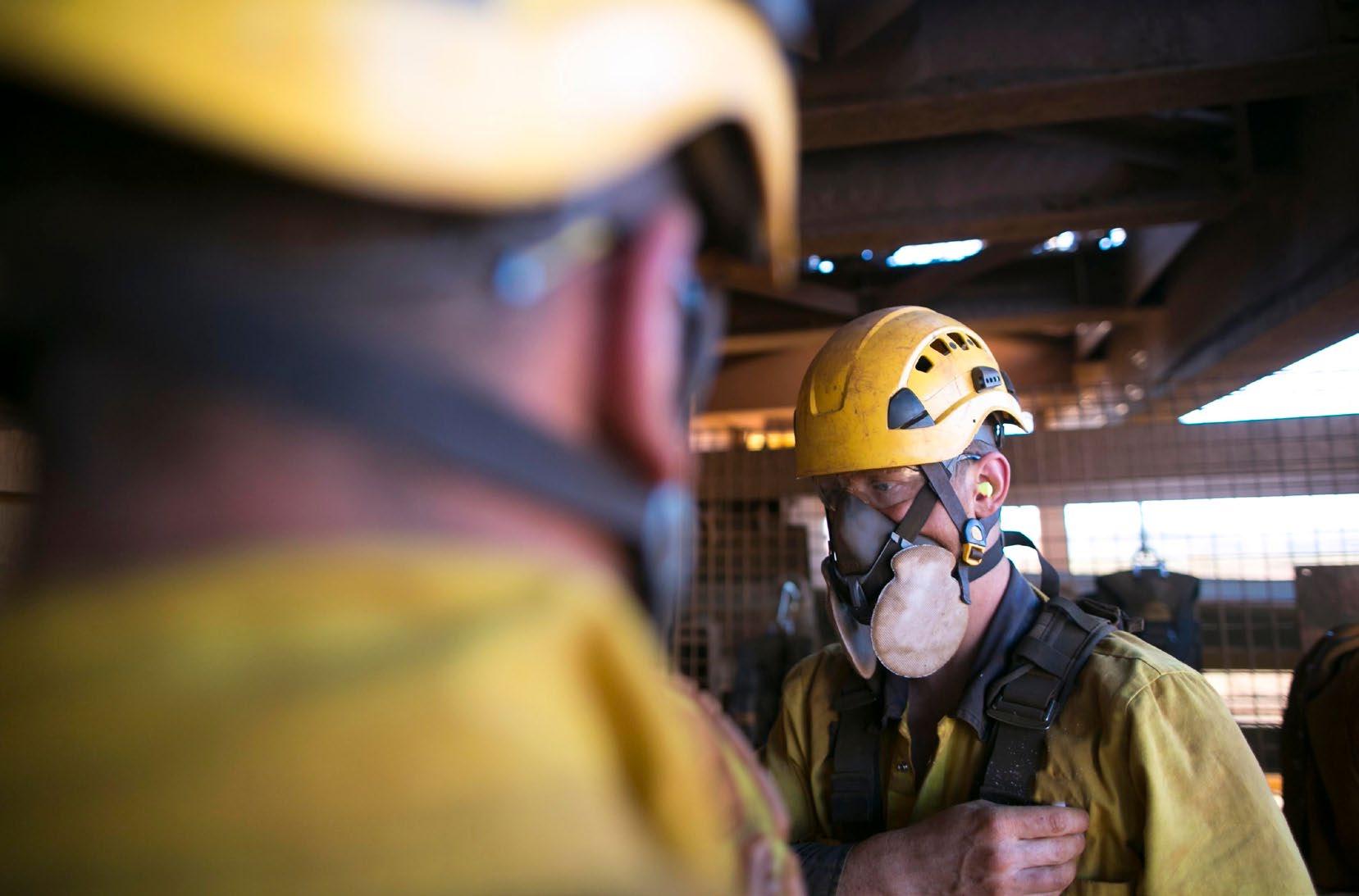
Visit www.safetyspecialists.com.au to purchase and ask about special NECA member pricing.
The NECASafe team, specialises in assisting our members in the electrical industry with their questions and challenges. We provide a range of extra services including document development, workplace audits and inspections, root cause investigations and toolbox training.
Ask about our free NECA Member Confidential Safety Audit
All findings of the comprehensive review are confidential and will identify any potential blind spots in your safety protocols to help you protect yourself and your employees from costly fines and injuries.
After an extremely successful nine years as NECA SA/NT’s Business Relationship Manager, Leah Burgess (nee Boyce) has decided to pursue a new career challenge.


Leah is looking forward to giving back to the community in her new role as Communications and Digital Marketing Manager at the Jodi Lee Foundation; a charity that is extremely close to her heart. In addition to this, Leah will be setting up her own events management business – an endeavour we know will thrive due to her dedication, expertise, and passion in this area.
Leah is very much a part of the NECA SA/NT family and we will miss her friendly, kind-hearted, and vibrant personality and the dedication she showed to our members. The team would like to wish Leah all the best with her future endeavours.
As I step into this role, and acknowledge the big shoes I have to fill, I’d like to take this opportunity to introduce myself and welcome you to reach out should you have any enquiries. I have a master’s degree in marketing and am experienced in business development, client support, marketing, communications, and event planning. In previous roles I have assisted tradespeople across a range of areas, and I’m really looking forward to getting out and meeting you, our NECA members. Please feel free to get in touch via jamie.phillips@necasa.asn.au or on (08) 8272 2966 should there be anything I can assist with.
As this edition of NECA News is a celebration of women in the electrical industry, I have been asked to write the SA/NT section of the magazine. At NECA SA/NT our aim is to help our members with the everyday running of their businesses, and overcoming the challenges that emerge when operating in this everchanging world. Your membership fees
allow us to employ skilled professionals who are equipped to provide you with the advice, tools and assistance you need to run your business. We understand that your time is best spent in your business earning an income, so when you have a query or issue, please think of us as your first port of call and we will endeavour to assist you. If we don’t have an answer for you straight away, it is our role to get the answer for you as quickly as possible. Your needs are our priority, and we hope you will continue to be a part of our association so we can support you through 2023 and the years to come.
With this year in mind, I wish to provide information on just a few of the initiatives we are working on.
Around the time that this edition is printed and mailed out to our members, we will be running our 2023 Crucial Women in Construction (CWIC) High Tea, which we have not been able to run since early 2021 due to COVID-19, so we are very much looking forward to this year’s event.
The Annual High Tea brings together like-minded women and men who support the fantastic work that women undertake in this industry. The event provides opportunities to listen to guest speakers, network, interact with a panel of industry leaders, win prizes and enjoy some light refreshments on a Friday afternoon. The High Tea follows the theme of International Women’s Day, which this year is Embrace Equity, so we are sure there will be great discussions to be had on this critical subject.
We look forward to showcasing our amazing CWIC High Tea on our socials and in the next edition of the magazine.
We are pleased to announce that our Roadshow Seminar Series is back to full capacity in 2023! The seminars will kick off in Wallaroo on 20 March and conclude in Port Lincoln on 16 May, covering 13 locations across South Australia. We will have some great technical updates from the Office of the Technical Regulator and SA Power Networks. Plus, NECA will be speaking about the Continuous Professional Development (CPD) program that we are working on with Consumer and Business Services (CBS) for electricians. Of course we will have our dedicated sponsors at each event displaying their latest products and services, and NECA staff will be there to chat to you about what we can do for you and your business.
Further information is provided on page 38. Alternately you can visit our website and click on the Roadshow banner.
Our group training organisation, NCA, is now in its sixth year of operation, and currently has 111 apprentices and one office administration trainee. Almost 30 apprentices graduated last year, and it was fantastic to see them all kicking off this next chapter in their careers. We are looking forward to a big year ahead as we continue to employ new apprentices every 6-8 weeks, depending on industry requirements.
At the end of 2022 NCA farewelled Ben Morgan who left to take on a new challenge. Thanks to Ben for his great work over the past four or so years,
he was instrumental in setting up our Dual Trade apprenticeship and our Northern Territory status. We wish him all the very best for his future.
Early in 2023 we welcomed Troy Swan to the role of Field Officer. Troy has an extensive background in Group Training Organisations and we are very excited about having him on board.
Don’t forget that NECA and RACCA members also receive a discounted charge-out rate on apprentices with NCA, which is just another benefit of being a member. If you have any queries about NCA and what they can do for you, contact Craig Mitchell on (08) 8272 0799 or visit www.necaapprentices.com.au
Our Excellence, Small Business and Apprentice Awards nominations are now open for 2023 and there are a number of exciting changes this year, including the introduction of a Women in Energy Award and a Leaders in Diversity Award.
The NECA Excellence Awards recognise the accomplishments of individual electrical and communications companies for their work on various projects across the country. We know that our members do some outstanding work every day, so we want you to get involved, and importantly get recognised for it.
The NECA Small Business Awards is an awards program designed for small businesses who are making an impact in the industry, and deserve to be recognised at the highest level. NECA wants to celebrate small businesses across the country.
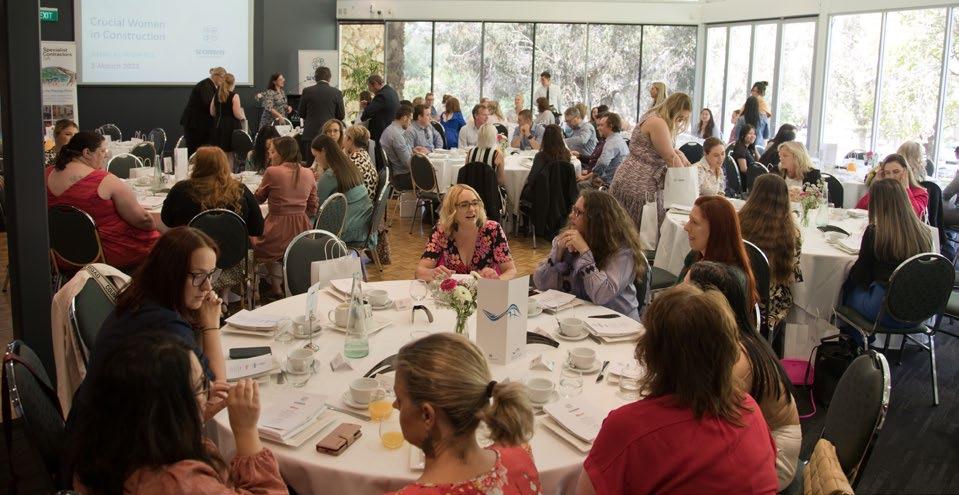
Nominations close on the 9 June 2023 for the Excellence Awards and Small Business Awards.
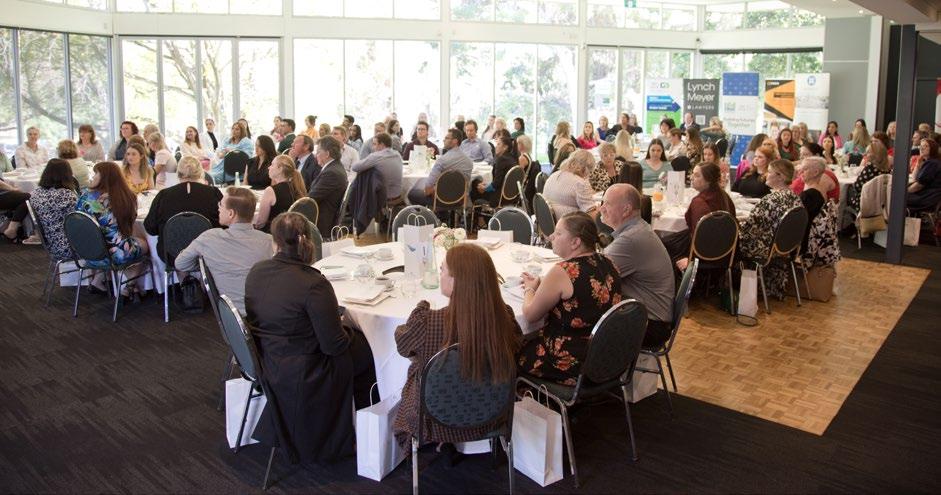
The NECA Apprentice Awards are designed to acknowledge apprentice achievements in personal development, effort, academic attainment and workplace competency. There are many benefits for being involved in the Apprentice Awards, including prizes, networking and industry recognition, but above all it is a great experience that looks good on the resume. If you have an apprentice who is worthy, then please get your nominations in to NECA SA/NT by 7 July 2023
If you would like to know more or need any assistance, please do not hesitate to get in touch with me at NECA SA/NT. Alternatively you can visit our website for all the awards program information: www.bit.ly/NECA2023Awards
For further information or assistance with any of the above please contact the NECA SA/NT team on (08) 8272 2966.
NECA SA/NT ARE PLEASED TO ANNOUNCE THE ROADSHOW SEMINAR SERIES IS BACK TO ITS FULL SCHEDULE IN 2023! THE 2023 SEMINAR SERIES WILL BE HELD ACROSS SOUTH AUSTRALIA FROM MARCH TO MAY IN 13 LOCATIONS. WE HIGHLY ENCOURAGE ALL ELECTRICAL CONTRACTORS AND THEIR WORKERS TO ATTEND TO ENSURE THEY ARE UP-TO-DATE WITH ALL THE LATEST DEVELOPMENTS WITHIN THE INDUSTRY.
This annual seminar series is a significant training resource for the electrotechnology industry. The event this year is designed to provide licensed electricians with a greater understanding of the following topics:
½ NECA SA/NT: on the upcoming Continuous Professional Development (CPD) program.
½ SA Power Networks: on their export programs, compliance and the Service and Installation Rules.
½ The Office of the Technical Regulator: on updates to Australian Standards, smart meter requirements, test results and electronic certificates of compliance (eCoCs), frequently asked questions and more.
Thanks to the Office of the Technical Regulator and SA Power Networks for their support and involvement in this initiative.
Suppliers, manufacturers and wholesalers will be on location with their new products and service displays, and NECA SA/NT staff will also be on hand to answer your questions about what NECA can do for you and your business.
To attend the NECA 2023 Roadshow Seminar Series, please register via Eventbrite here: www.bit.ly/NECA2023Roadshow
Alternatively, you can visit our website www.neca.asn.au/sa, click on the Roadshow banner and complete the hard copy registration form.
For further information please phone NECA SA/NT on (08) 8272 2966 or visit our website.
We look forward to seeing you there!
2023
Wallaroo
Monday, 20 March 2023
Coopers Alehouse
Port Pirie
Tuesday, 21 March 2023
Port Club Rooms
Adelaide
Monday, 27 March 2023
Arkaba Hotel
Hahndorf
Wednesday, 29 March 2023
Adelaide Hills Convention Centre
Naracoorte
Monday, 3 April 2023
Naracoorte Golf Club
Mount Gambier
Tuesday, 4 April 2023
Commodore Motel
Elizabeth
Wednesday, 12 April 2023
Grand Central
McLaren Vale
Monday, 1 May 2023
Serafino Wines
Morphettville
Wednesday, 3 May 2023
The Junction
Barossa
Monday, 8 May 2023
Nuriootpa Vine Inn Hotel
Berri
Tuesday, 9 May 2023
Berri Hotel
Whyalla
Monday, 15 May 2023
Westland Hotel-Motel
Port Lincoln
Tuesday, 16 May 2023
Port Lincoln Hotel
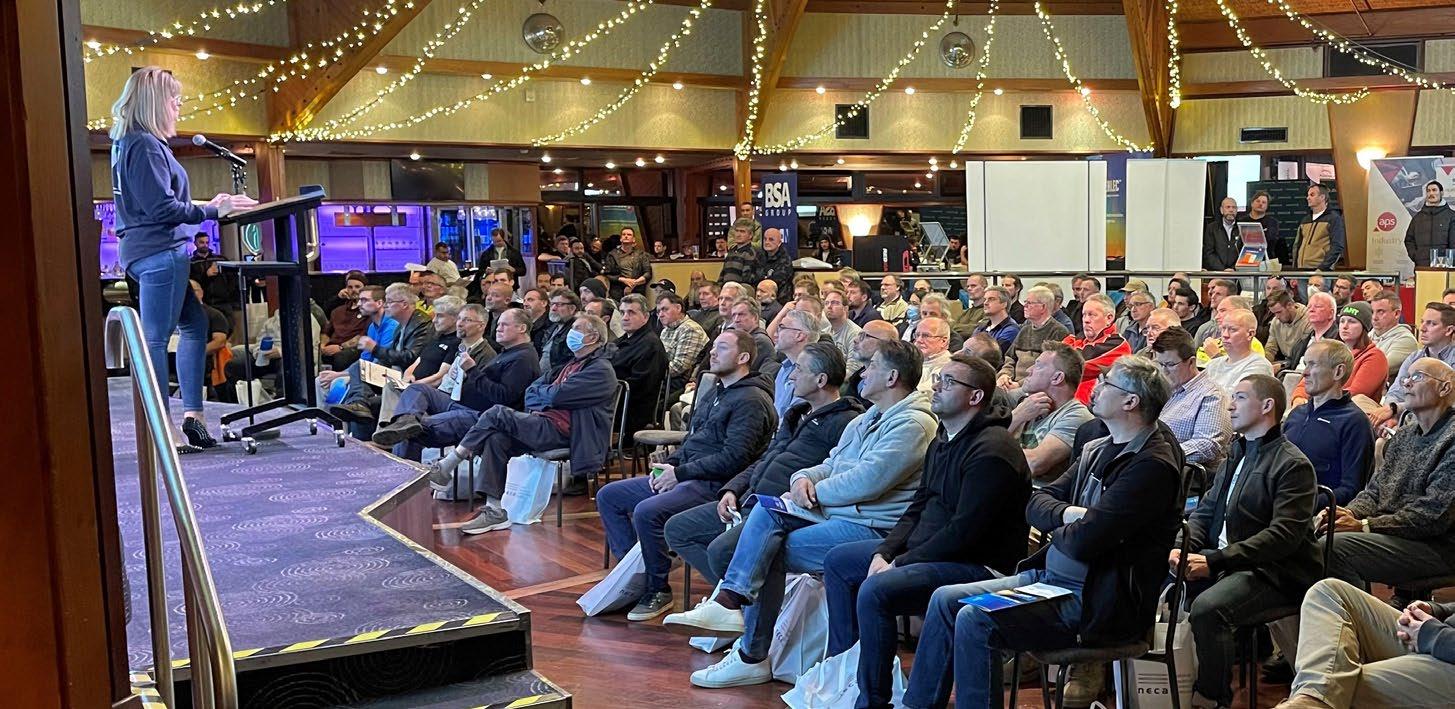
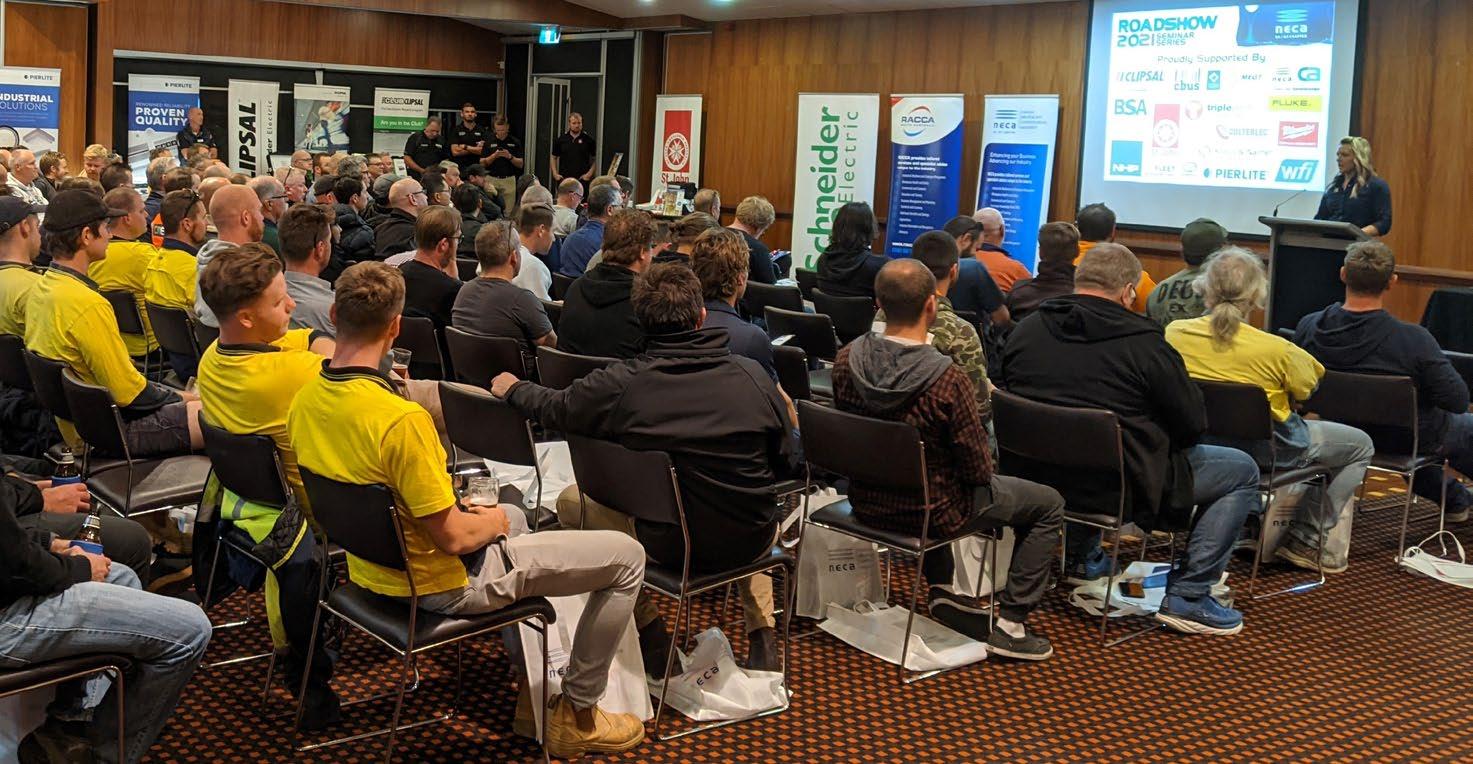
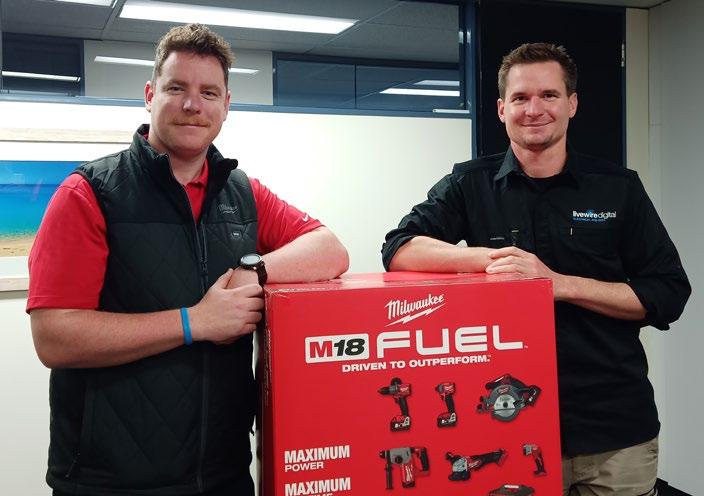
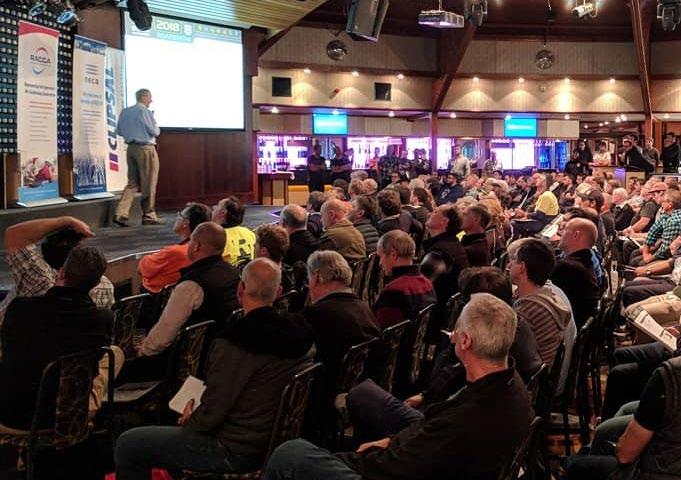


I would like to take this moment to celebrate the strength and accomplishments of all women on International Women’s Day.
Some industry players may be of the old adage that, ‘ay, electrical work is not a women’s job’. It’s clear that our educational and family upbringing can shape the career expectations of boys and girls, but what additional factors are holding the electrical industry back from recruiting more women?
The number of females representing Tasmania’s electrical industry is still low, but it is steadily increasing. Women across the industry continue to challenge stereotypes and strive for ambition. It is no secret that working within this industry isn’t always easyfemales often face resistance when it comes to breaking into such fields. Yet, the women’s stories provided earlier in this issue, serve as an inspiring reminder of what can be accomplished with grit and determination!
Progress has been made and we are starting to see the results and benefits not only with more women on the tools, but from increased numbers
of female industry experts, improved government funding, and businesses and training organisations (such as NECA Education & Careers and Keystone Tasmania) providing career opportunities for women in our industry.

International Women’s Day is an important day for the industry to come together and acknowledge the achievements of all women in our electrical industry, whether it be behind the scenes – in the office, on a job site or supporting a partner.
It’s time to recognise the hard work, resilience, and dedication that countless females have put into breaking down barriers and paving the way for more diversity. Take a moment on March 8 to appreciate the women who have helped shape our industry and continue to champion new initiatives that will make a real difference.
Happy International Women’s Day to all the inspiring women of the electrical industry. We are grateful for your contributions.

We have had an exciting few months planning and preparing for our upcoming Industry Nights, with the NECA team working diligently behind the scenes to get these events up and running. The Industry Nights provided a great learning experience for everyone involved and every electrician that attended received four CPD points towards their Continual Professional Development. We look forward to seeing our long-term members again and welcoming our new NECA members.
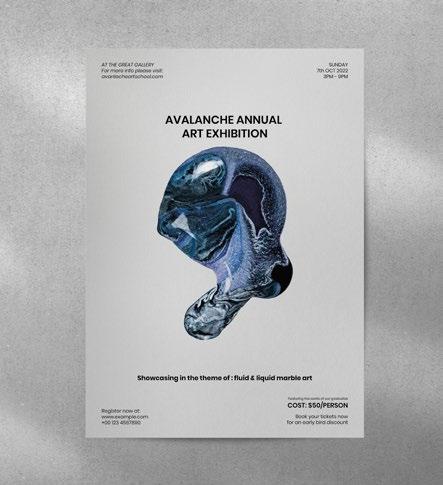
At the Industry Nights our speakers discussed changes to the Occupational Licensing (Electricity Consumption Metering) Code of Practice 2022, mean that contractors must now be aware of their responsibilities to ensure they remain compliant with the new regulations.

NECA Award nominations are now open, and this year we are thrilled to introduce the ‘Women in Energy’ and ‘Leaders in Diversity’ Award categories. NECA recognises the women and businesses who have made, and are continuing to make, tremendous contributions to our industry. The Women in Energy category recognises individuals who are championing change for women in the electrical and communications industry. The Leaders in Diversity category recognises businesses making a difference in this space.
The Women in Energy Awards will highlight women who:
½ have shown leadership, courage and resilience in their actions;
½ serve as a role model to other women looking to advance their career in the industry; and
½ can demonstrate their actions and efforts have resulted in positive outcomes for women in their business and/or the wider industry community.
The Leaders in Diversity Award focuses on businesses who have introduced changes that support greater diversity and inclusion in their workplace, and have achieved exceptional
results. Their outcomes may be demonstrated in a variety of ways. We encourage you to apply for this year’s awards.
Recently, a member experienced a situation where they were completing work previously done by another contractor who had used unsafe practices that were not compliant with Australian Standards. This member contacted NECA’s technical team for advice on navigating their obligations. Taking on work previously completed by another electrical contractor can present an unsafe situation. NECA’s technical experts have summarised the key points when identifying noncompliant or unsafe electrical work:
½ report shocks and tingles on exposed conductive parts of an electrical installation to the distributed network service provider (DNSP);
½ identify electrically unsafe or non-compliant works. They must be likely to cause any or all of the following factors: fire, shock or proterty damage;
½ carry out actions to make safe: isolate and repair, or isolate and lock out in a manner that requires the use of tools to re-energise;
½ assess the installation’s risks to determine the level of isolation required (if it cannot be repaired immediately);
½ advise clients where unsafe or noncompliant portions of the installation
have been found and the reasons for the actions taken (safety);
½ take care to ensure life support facilities are not impacted by isolations;
½ complete a detailed report on the findings;
½ share the report with a regulator as required;
½ issue an Electrical Safety Certificate.
Please note, this guide can vary. If you are faced with a similar situation, we recommend that you connect with our technical experts who will guide you through your obligations as a contractor.
As a NECA member, you have unlimited phone and email support on all Australian Standards including the Wiring Rules, Service & Installation Rules and Metering Rules to ensure you always stay compliant with industry standards.
Scan the QR code to submit an enquiry and a NECA Representative will be in touch.
The safety of those around us is of the utmost importance. That’s why safety switches exist to help protect people from electric shocks, which can cause serious injury and sometimes even death. When a current leakage is detected, these essential devices will immediately stop the circuit before it has a chance to do harm.
To assist you with your compliance requirements for safety switches, CBOS has published an Electrical Compliance Guide on RCDs, also known as safety switches. The guide provides guidance for electrical contractors and practitioners when selecting, purchasing and installing RCDs.
The Electrical Regulatory Authorities Council (ERAC) has published a document on alterations and RCDs. The document’s purpose is to provide a consistent approach across Australia and New Zealand to the interpretation and implementation of Clause 2.6.3.2.5 Alterations to installations and replacement of switchboards — Australia only.
The Tasmanian Government is encouraging people to have safety switches installed, and regularly tested, by a licensed electrician (if they haven’t already). As a licensed electrician, people may ask you to check whether their property has safety switches and/or to install them.
You have expertise in electrical safety and are the best person to talk to your customers about the importance of safety switches. You can do this by:
½ when you’re working at a property, check whether it has safety switches. If it doesn’t, or not all circuits are protected, encourage the owner to have safety switches installed on all circuits supplying socket outlets, lighting and electrical equipment;
½ ·if you’re installing safety switches, make sure your customer knows what they are, why they’re important and how to test them. Encourage them to test their safety switches at least every three months;
½ promote the importance of safety switches through your own advertising;
½ talk to your customers about electrical safety more broadly. Offer to check the safety and condition of their electrical installations, especially if their property is older. Remind them to always use a licensed electrician for electrical work.
Make sure that you’re up to date with the latest requirements for safety switches. For more information and a copy of the Electrical Compliance Guide, visit the Tasmanian Government website.

Get your business moving with Toyota’s exclusive NECA member fleet discount!
The end of financial year is just around the corner and access to Toyota’s exclusive NECA member’s fleet discount can help you get your business ready.

NECA membership unlocks fleet discounts across a great range of Toyota vehicles to help you find the right car, within the right budget for your business requirements. You’ll be prepared in no time to take your business to a whole new level. The discount offers exceptional savings on Toyota’s most popular vehicles, so you can upgrade, expand or refresh with confidence.
Take advantage of these discounts and save thousands on your next Toyota vehicle purchase. Speak with a NECA Representative and see for yourself just how easy it can be to access these exclusive deals.
Develop the skills you need to thrive in our industry and gain CPD points today!
NECA has a new online training portal that provides members with free access to CPD training courses. For non-members accessing the same training opportunities, there is a fee applicable per course.
The portal has been launched with 15 courses, each worth two CPD points. All successfully completed courses will be automatically lodged with CBOS for you.
Discover a number of CPD topics that are related to industry specialisations and tailored entirely to meet industry’s educational requirements and needs, with topics such as:
½ Safe Work Method Statements;
½ Working at Heights in Construction;
½ Managing Workplace Bullying;
½ Workplace Health and Safety (WHS) Programs in the Construction Industry;
½ Working in Confined Spaces in the Construction Industry;
½ Wellbeing at Work.
Deepen your knowledge and professional network with information acquired through these instructive and insightful programmes.
Invest in yourself and your team’s expertise, and make the most of NECA’s CPD Online Training Portal. Further courses are under development based on members’ questions and the feedback received by our technical managers.
Designed with a single log on capability, it allows members to use the same log in details for the online training portal as the NECA Members’ Knowledge Base. If you require assistance, please contact NECA Member Services.
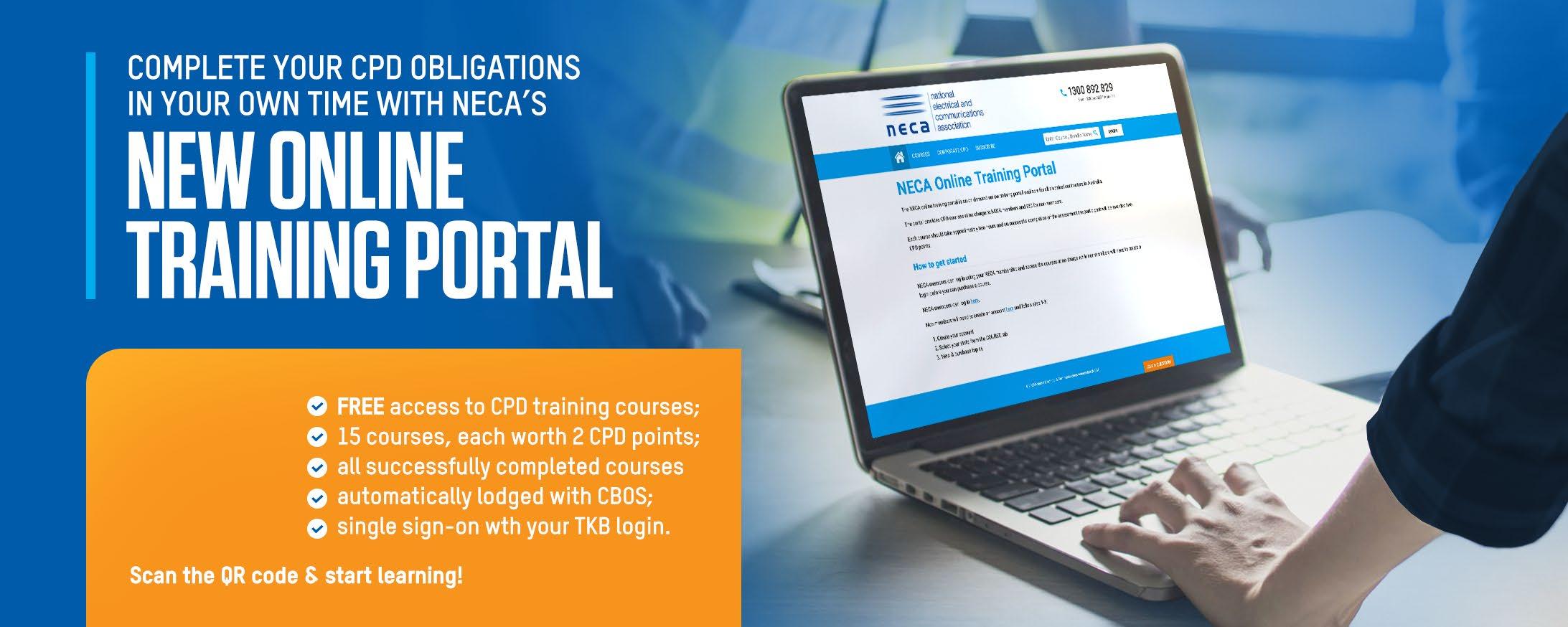
Is it time for you to pass your industry knowledge to the next generation of electrical contractors?
If you have been thinking of moving off the tools, but are unsure of what to do
next, then you may want to consider becoming an industry vocational teacher. Passing on your industry knowledge, skills and wisdom will help to shape the next generation.
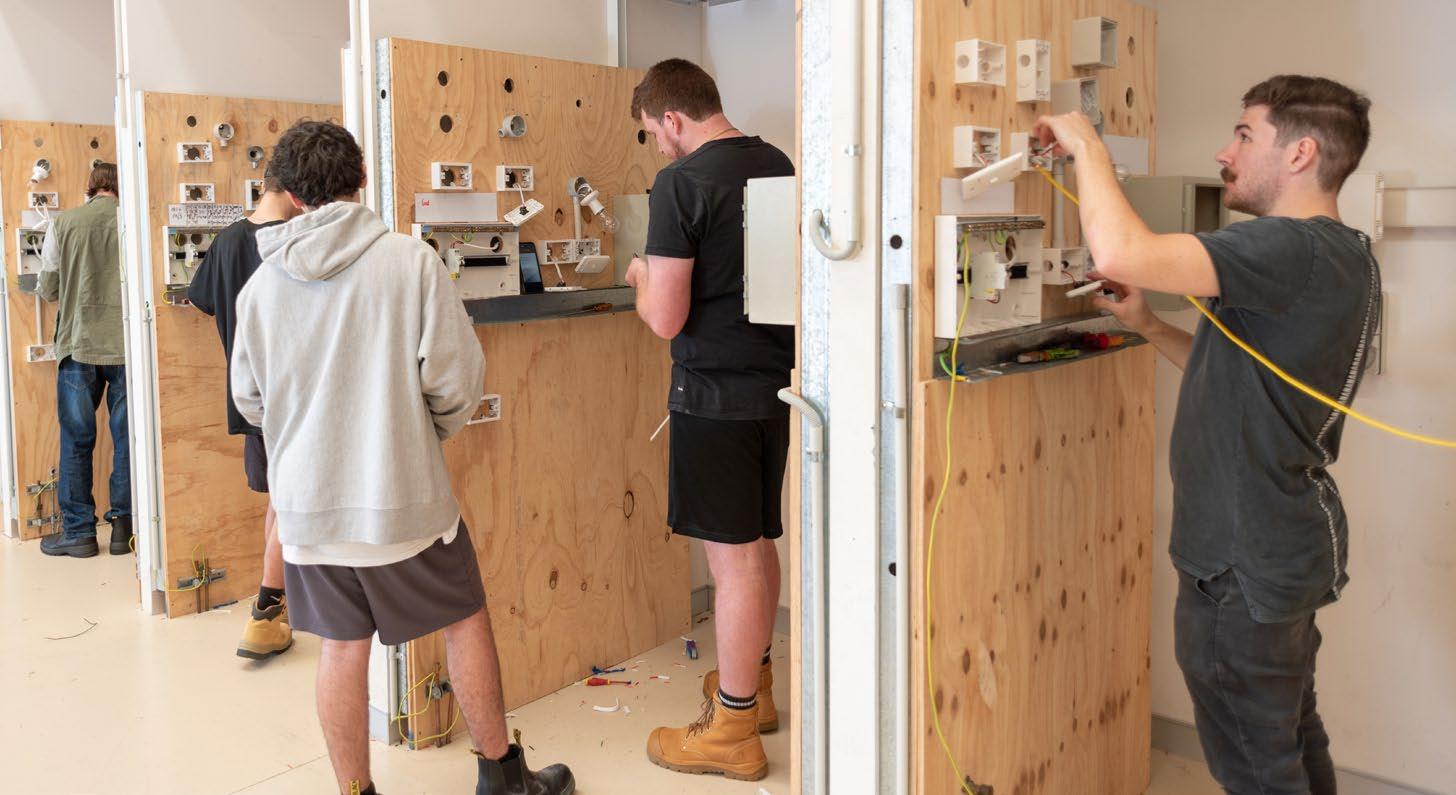
TasTAFE are now calling for expressions of interest for their Vocational Teacher Preparation Program where you will learn to design, develop and deliver engaging and effective sessions. This short course will assist you to develop digital skills for use in teaching practice, and study skills to better prepare you for the full vocational education training (VET)
teaching qualification. The course will also provide an insight into how the VET sector works in Australia, as well as providing basic presentation and work skill instruction skills.
This program is fully governmentsubsidised as part of the Energising Tasmania initiative to deliver quality training to workers in areas of priority needed to support energy, infrastructure and related sectors in Tasmania.
Contact TasTAFE for more information.

Welcome to all our NECA News readers, and a particularly warm welcome to the new members of the Victorian community who have joined us over the last few months.
If you’ve been a longtime reader of this magazine, you’re probably accustomed to reading the introduction from NECA Victoria’s Executive Director Pawel Podolski and President Dean Spicer. In honour of International Women’s Day this month, we thought it’s fitting to provide you with a female perspective for this special edition.
As you may have picked up from earlier in the magazine, women only represent 2-3% of the industry. This is an alarming statistic and one that needs to be addressed. Thankfully, we are starting to see some traction in the industry.
At an industry level, we see NECA Education & Careers leading the way with the Women and Their Trade (WaTT) initiative, which commenced at the end of 2021 to provide career opportunities for women in the electrical industry. Funded by Victorian Government’s Apprenticeship Innovation Fund, this program will help
remove barriers to women entering historically male-dominated trades. The program sees 25 women over a 2-year course engage in their electrical apprenticeship. This program provides a great introduction to the trade and is a fantastic contributor to the 16.6% female participation rate that NECA Education & Careers (VIC) has amongst its apprentices.
At a community level, NECA hosted its 5th annual International Women’s Day on Friday, 10 March to support the initiative.
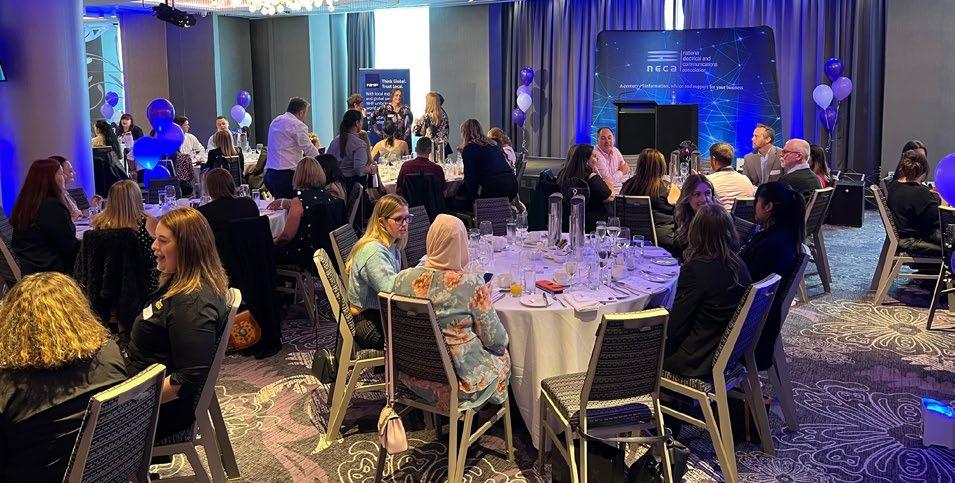
In support of the theme #embraceequity, for the first time since its inception, we opened participation to male supporters who stand by this mission. It was great to see several men partake as true advocates of the cause, driving and supporting the message of equity and inclusion within what is a very male dominated industry.
This has positioned NECA as one of the more passionate and impactful organisations in both attracting and retaining women to the industry, which currently sits around the 2-3%. NECA has not only been talking about this issue – we have been leading by example, with our own organisation across both the membership and education side of the business very diverse.

We were joined by the Honorary Gayle Tierney, the Minister for Training and Skills and Higher Education, and Projects and Workforce Development, Tasneem Chopra, the Australian Ambassador for Women of Colour and internationally recognised comedian Doug Chappel. You can see photos of this event on Facebook.
NECA Victoria is deeply committed to fostering diversity and inclusion. I’m proud to share that 50% of our leadership team and the majority of our workforce in general is made up of women. Coming to work every day is both exciting and fulfilling, a true testament to the importance we place on creating a safe, supportive and equitable workplace. Women have taken the lead in NECA Victoria’s legal arm, Constructive Legal Solutions, with their Director, Principal Lawyer and Commercial Lawyer all being female.
NECA Victoria is deeply dedicated to creating a workforce culture that values equity, respect and fairness. We understand the importance of diversity in our team, which carries into how we
conduct ourselves with members, partners, and stakeholders ensuring everyone feels respected, acknowledged, and valued.
Following the success of the solar mentoring pilot program for Licensed Electrical Inspectors (LEI) last year, NECA in collaboration with Solar Victoria is proud to announce that we are now on track to deliver more sessions across both regional and metropolitan Victoria.
The response to the pilot program was immensely positive, with every mentee expressing appreciation for having access to support. NECA is pleased to be able to provide solar and battery installers and inspectors with this service and is committed to helping them continuously improve their skill set.
If you are interested in finding out more about this initiative visit www.bit.ly/necatechnicalmentoring or contact NECA Victoria’s technical team via email at technicaltraining@neca.asn.au.
An overwhelming demand from NECA Victorian members has prompted us to proudly present our much-awaited, in-person member conference in 2023! The program is complete with thought-provoking industry discussions, networking, and exciting team-building activities allowing you to Get the Edge, for today, tomorrow and beyond!

Create a personalised experience by choosing from over 30 presentations across three streams and make the most of your night at our networking functions, where you can connect with like-minded individuals while enjoying delicious food, refreshing drinks and laughter!
You can find out more about the event at www.bit.ly/necaedge2023
On behalf of the whole NECA Victoria Team, we are immensely appreciative of all our members and annual business partners who have provided us with unwavering support. We look forward to witnessing how this year unfolds.
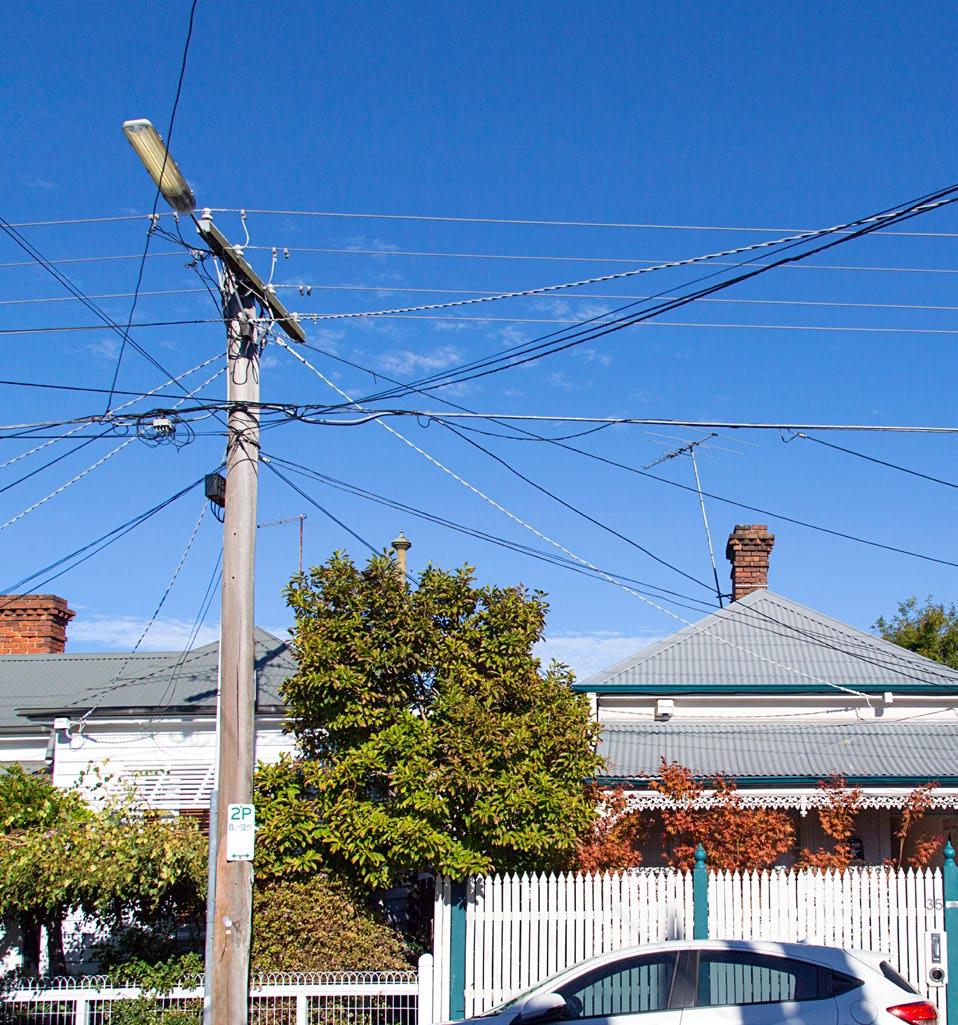

ENERGY SAFE VICTORIA (ESV) IS URGING INDUSTRY TO TAKE BETTER CARE WHEN WORKING AROUND POWER LINES
FOLLOWING AN INCREASE IN DANGEROUS INCIDENTS IN 2022.
During the past 12 months, ESV investigated 232 incidents where people or machinery came into contact with power lines, an increase on the 214 recorded in 2021.
Of the 232 incidents, 173 involved heavy machinery (cranes, tipper trucks), 31 were related to people making direct contact with power lines and four involved farming equipment.
Another 24 cases involved either scaffolding or construction works located too close to power lines or people interfering with power lines.
A man was killed when he came into contact with power lines while trimming back a dead tree in the front of a Malvern East property in February 2022.
Already in 2023, ESV has been called to an incident in Combienbar in the state’s east on 20 January when a man climbed onto a power pole from a tractor, suffering an electric shock.
Most incidents where people or machinery come into contact with power lines are avoidable, simply by taking the time to understand potential risks before commencing work.
The impact of these incidents can be devastating, not just for the victim, but also their families, co-workers and friends.
The need to get work done quickly is no excuse for not taking the proper precautions.
ESV’s Look Up and Live campaign educates industry on the dangers of working around power lines.
The campaign reminds Victorians that if a piece of machinery does hit power lines and you are inside the vehicle, to stay inside.
If you’re not inside the vehicle, keep at least eight metres away, as you can still be shocked when approaching the vehicle.
Below are a few simple safety tips to avoid an incident occurring:
½ understand No Go Zones, rules and distances for safety clearances near overhead power lines;
½ ensure an ESV-registered spotter is on hand when working near overhead power lines;
½ display Look Up and Live stickers on any machinery or equipment, which is raised overhead;
½ remember that power lines are more difficult to see at dawn and dusk.
For more information go to
www.bit.ly/esvlookupandlive
Employers now have a ‘positive duty’ to proactively prevent and address sexual discrimination and harassment in the workplace. To fulfill this obligation, they should evaluate their potential risks for such incidents. Actions they can take may include:
½ examining past reports, exit interviews and codes of practice;

½ conducting formal training with all employees that highlights appropriate workplace behaviour and workplace expectations;
½ conducting thorough risk assessments using information
from focus groups, surveys and workplace consultation, and include it in a risk register along with other health and safety matters;
½ implementing effective measures to address sexual harassment, starting with the most impactful;
½ gathering feedback from workers on risks through anonymous survey;
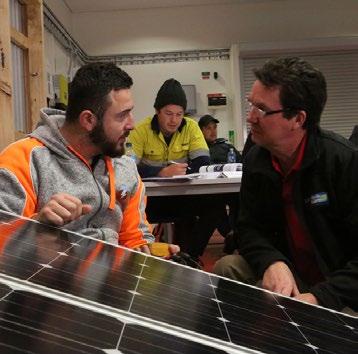
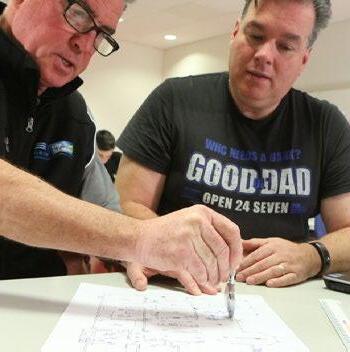
½ making sexual harassment a priority in all safety meetings.
To ensure compliance, employers should establish or review a comprehensive policy on sexual harassment and discrimination. Staff training is also
crucial in raising awareness and preventing incidents from occurring. For further information or assistance, contact the NECA Victoria Workplace Relations Team on 1300 300 031.

I have been working with NECA at a state and national level for more than five years and it has been a pleasure to be part of an association that genuinely cares about improving gender equity, increasing diversity and supporting women to be leaders in their fields, with 56% of managers in WA being female.


The female participation rates for electrical apprentices at Electrical Group Training and the College of Electrical Training are both above the national electrical industry average of 2%, comprising 5.5% of EGT apprentice employees and 5.7% of apprentices studying at CET. Although these numbers have been on a consistently positive trend line for the last decade, there is still a long way to go.
Increasing female participation in Australia’s electrical industry can only make it stronger and more sustainable, not only in relation to our industry’s ongoing severe skills shortage, but also as we rise to meet the challenges of the rapidly changing electrical landscape – with new technologies, carbon emission targets and the rise of green energy demanding increasingly innovative solutions and ideas – something a highly diverse workforce is better equipped to provide.
We continue to work on strategies and initiatives that aim to close the gender gap in our industry, to encourage more girls and women to consider the electrical trade as a suitable career pathway, to provide support and a sense of community to female apprentices and tradespeople and to highlight their achievements.
I am honoured to be directly involved in several new initiatives at NECA that support these objectives, shine a spotlight on women in our industry and explore the many opportunities that a diverse workforce can unlock.
In the last issue, we announced the launch of registrations for the inaugural NECA WA Women’s Industry Forum at The Westin Perth on 8 March, International Women’s Day. We are thrilled by the response so far to this event, with only a few tables remaining for registration. Although this event will have taken place by the time this issue goes to print, we look forward to bringing together women from across the WA electrical industry to learn from Sharon Warburton, a leader in the WA construction industry, and a panel of industry experts as they share their experiences, challenges and pathways to success.
We will shortly be launching a WA Women’s Advisory Council, a powerhouse group of individuals who are advocates for women in the electrical and communications industry. We welcome the participation of women who are solution-focused and passionate about driving positive change for women in our industry. Please contact the NECA WA office for more information on (08) 6241 6100.
The NECA Awards program is the ultimate project showcase, but this year we are also introducing two exciting new categories: Women in Energy and Leaders in Diversity. These awards are designed to draw out the incredible stories of individuals and businesses who are champions for change. They are about celebrating the individuals and businesses who are leaders in advocating for gender equity and diversity in the workplace. We look forward to receiving submissions from WA members and learning from these trailblazers.
Our popular NECA Industry Nights are back for 2023, providing a convenient way for everyone in the electrical industry to learn about the latest changes and news directly from the network providers, industry regulator and suppliers in your local area.
The first event was held in Geraldton in early February. We will be holding close to 20 of these events throughout the year in conjunction with Building and Energy, Western Power, Horizon Power and our valued business partners.
Ascot
Thursday 16 March, Swan River Hotel
Northam
Thursday 4 May, Northam Country Club
Albany
Thursday 11 May, Hilton Garden Inn Albany
Busselton
Thursday 18 May, Esplanade Hotel
Cockburn
Thursday 15 June, Cockburn CRC
Karratha
Wednesday 28 June, Ibis Styles Karratha
Port Hedland
Thursday 29 June, The Esplanade Hotel
Kununurra
Wednesday 26 July, The Kimberley Grande Resort
Broome
Thursday 27 July, Oaks Broome Hotel
Manjimup
Wednesday 16 August, Manjimup Tigers Football Club
Esperance
Thursday 31 August, Comfort Inn Bay of Isles
Mandurah
Thursday 14 September, Mandurah Offshore Fishing and Sailing Club
Hillarys
Thursday 12 October, Hillarys Yacht Club
Kalgoorlie
Thursday 19 October, Rydges Kalgoorlie
Bunbury
Thursday 2 November, Quality Hotel Lighthouse
Narrogin
Thursday 16 November, Duke of York Hotel
To register, visit www.bit.ly/memberarea_events
The Federal Government’s new Secure Jobs, Better Pay legislation bill has raised some concerns within the industry, especially in regard to the threat of companies being forced into multi-employer bargaining.
Whilst this is a particularly complicated issue, the majority of WA members will not be affected as it does not apply to businesses with less than 20 staff.
If your business, or group of companies, has more than 20 staff, then we encourage you to seek advice from ECA Legal on how the multibargaining process may affect you.
There is more detail on this new legislation, including the multibargaining provisions, in this edition of NECA News, but we confirm that if you are a member whose business has less than 20 staff, you will not be affected by this part of the new legislation.
This legislation is a new and complicated piece of law, so please contact ECA Legal for some free advice on how it could impact your business on (08) 6241 6129 or ecalegal@ecawa.org.au
EGT has hit the ground running in 2023 and all the signs are pointing to another busy year with high demand for electricians and apprentices combined with market shortages for both.
Between November 2022 and January 2023 EGT employed 35 new electrical apprentices, increasing their overall number to 510. Their latest induction included one female apprentice, one Indigenous apprentice and five mature age apprentices. EGT are hopeful that the additional funding from the Construction Training Fund (CTF) will assist in increasing the diversity of their workforce.
The State Government has also funded up to 300 apprentices through the Group Training Wage Subsidy (GWS) program, which seeks to fund 100% of the (junior) wage component for apprentices who started their apprenticeships in 2022 or 2023, and are working on State Government programs. This funding is
worth over $134,000 per apprentice over four years. EGT successfully placed 25 GWS apprentices in 2022 and have been allocated another 20 for 2023. If you are, or will be, working on WA State Government jobs in 2023 and would like to take advantage of this funding, please contact EGT on (08) 6241 6178 or placements@egt.net.au as soon as possible. Information on the WA Government’s pipeline of work can be found at www.bit.ly/3HZ3Oh5
If you have been considering hiring an apprentice from EGT in the near future, we recommend getting in contact with them ASAP to start the sign-up process. Although EGT are recruiting new apprentices every few weeks, there can still be a delay in receiving an apprentice due to the very high demand. A representative from EGT will meet with you to go through what is required and collect the necessary documentation. The sooner you have completed your sign-up, the sooner they can add you to the queue to receive the next available apprentice. Call (08) 6241 6100 to speak with Kat about becoming an EGT host or email egthostenquiries@egt.net.au
Demand for electrical apprenticeships remains strong, and while the team at CET are feverishly working to get everyone into class, the ongoing impacts of the pandemic and unprecedented apprentice numbers continue to result in longer than normal commencement times. CET thanks you for your patience during this time.
CET is working with a number of industry stakeholders across several ‘new energy’ sectors, including hydrogen, batteries and LNG, as we start to move into Industry 4.0. Training pathways and new electives are being developed, after extensive engagement highlighted skills and knowledge gaps that require plugging to meet the needs of the future workforce. Some areas, such as future batteries and automation, are expecting worker demands in the tens of thousands over the next 10-15 years, so the future is bright for our current apprentices and for those who wish to move into these areas as they become mainstream.
DID YOU KNOW THAT A ‘PERSON CONDUCTING A BUSINESS OR UNDERTAKING’ (PCBU) HAS NEW RESPONSIBILITIES UNDER THE WORK HEALTH AND SAFETY (GENERAL) REGULATIONS (2022) WHEN IT COMES TO IDENTIFYING AND MANAGING PSYCHOSOCIAL HAZARDS? FIND OUT WHAT YOU NEED TO DO TO COMPLY WITH WA’S RULES AND REGULATIONS.
The importance of protecting workers from psychosocial hazards has significantly increased in recent times – not only in WA, but at a national and international level. Protecting workers from psychosocial hazards is now recognised as being of equal importance to preventing physical injuries.
The Work Health and Safety (General) Regulations (2022) outline the requirement for PCBUs to identify psychosocial hazards in the workplace, implement control measures and regularly monitor these controls to ensure their effectiveness. This means that if you are a PCBU in WA, you are now legally required to protect your workers from these types of hazards.
Psychosocial hazards are aspects of work that have the potential to cause psychological or physical harm.
Common workplace psychosocial hazards include:
½ inadequate organisational management where job demands are too high or too low;
½ poor leadership practices –from allowing unacceptable behaviour, to failing to genuinely consult with workers;
½ a negative workplace culture and poor social interactions;
½ fatigue and burnout;
½ environmental factors such as noise, temperature and working in a remote or isolated location.
Everyone has a role to play in preventing workplace injuries and maintaining a safe workplace on a physical level – and the same applies for psychosocial hazards. The specific requirements for different types of roles are detailed in the Code of Practice – Psychosocial hazards in the workplace.
PCBUs have the highest level of responsibility to ensure they are providing a safe and healthy working environment for their workers. As such, it is the responsibility of the PCBU to manage and control psychosocial risks as far as is reasonably practicable. Keep in mind that the standard of ‘reasonably practicable’ in workplace health and safety only applies to a PCBU. Other workers may be required to meet different standards. For example, officers must exercise ‘due diligence’, while workers and others at a workplace must take ‘reasonable care’. More information on how to determine what is reasonably practicable to meet a health and safety duty is available below.
Managing psychosocial risks can be achieved by implementing the same kind of communication and consultation risk management approach that is recommended for physical safety. The process involves:
½ identifying the potential and existing psychosocial hazards and risk factors in your workplace;
½ assessing these risks;
½ controlling these risks by making the changes necessary to eliminate the hazards or risk factors or, if not reasonably practicable, minimising the risk of harm;
½ regularly monitoring and reviewing the effectiveness of these controls and adapting them where necessary.
You should also consider what additional training and resources may be beneficial for your staff to help manage these kinds of hazards. Depending on the size of your business, it may be appropriate to provide support to employees internally via an employee assistance program (EAP) or ensure they have the details of other external agencies that could provide assistance such as Beyond Blue. It may be beneficial to provide managers and supervisors with effective leadership training, or engage a specialist in workplace stress management and resilience to coach your staff. It all depends on what psychosocial hazards you identify.
½ Work Health and Safety (General) Regulations 2022 | www.bit.ly/3KdgsL8
½ Code of Practice – Psychosocial hazards in the workplace | www.bit.ly/3Sd9S9y
½ Code of Practice - Workplace behaviour | www.bit.ly/415j4R4
½ Code of Practice - Violence and aggression at work | www.bit.ly/3S9y8ZT
½ Interpretive Guideline - How to determine what is reasonably practicable to meet a health and safety duty | www.bit.ly/3xw9xF9
½ Mental health helplines | www.bit.ly/3IbeOXJ
If you have any questions about how to identify and control psychosocial risks in your workplace, please contact safety on (08) 6241 6100 or email safety@ecawa.org.au
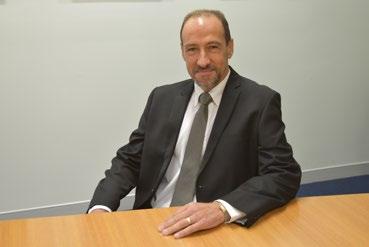
PREVIOUSLY, UNDER THE NATIONAL EMPLOYMENT STANDARDS OF THE FAIR WORK ACT, ELIGIBLE EMPLOYEES WERE ENTITLED TO REQUEST FLEXIBLE WORK ARRANGEMENTS. IN RESPONSE, EMPLOYERS COULD ONLY REJECT SUCH REQUESTS ON REASONABLE BUSINESS GROUNDS.
If an employer refuses a request or fails to give a written response within 21 days, the employee may refer this dispute to the Fair Work Commission (FWC). The FWC is then empowered to resolve the dispute, including by arbitrating the dispute.
From 6 June 2023, this entitlement to flexible work arrangements will be strengthened by further changes to the Fair Work Act
Specifically, in addition to employees with carer responsibilities, a disability, or those older than 55 - an employee experiencing family and domestic violence may also request flexible working arrangements.

Moreover, once a request is made, employers must discuss this with the employee and genuinely try to reach an agreement before refusing an employee’s request. The employer must then provide their response within 21 days of the request, providing detailed reasons for any refusal. If refused, the employer must also inform the employee of the alternative working arrangements they are willing to make as opposed to meeting the employee’s request.
Without limiting what constitutes “reasonable business grounds” for refusing such a request, this includes:
½ the new working arrangement would be too costly;
½ there is no capacity to change it;
½ it would be impractical;
½ the request would largely result in a significant loss in efficiency or productivity; or
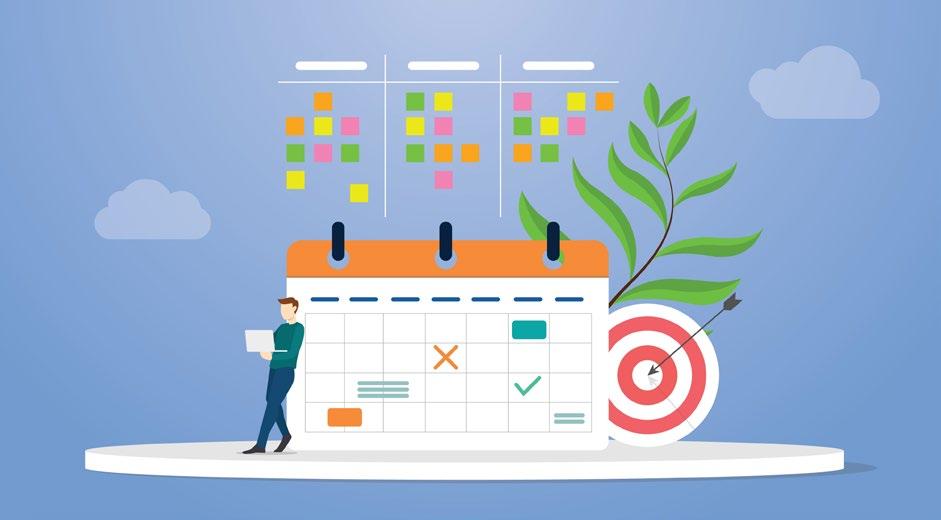
½ it would likely have a significant negative impact on customer service.
The FWC may make orders such as confirming that the employer had reasonable business grounds for refusing the request or, did not have reasonable business grounds for doing so. It may also order the employer to grant the request or, make specified changes in the employee’s working arrangements to accommodate the request.
The circumstances and fairness between the employer and the employee must be considered by the FWC in deciding. If a person contravenes any term of an order made by the FWC, they may be fined for breaching a civil penalty provision.
NECA membership isn’t a luxury, it’s a business essential.
We have the experts in-house to provide you with the support you need to thrive in this industry.
NECA MEMBERSHIP INCLUDES:
Free 24/7 access to view technical standards at your fingertips with TKB, NECA’s Technical Knowledge Base
Free access to Technical experts for on the job support
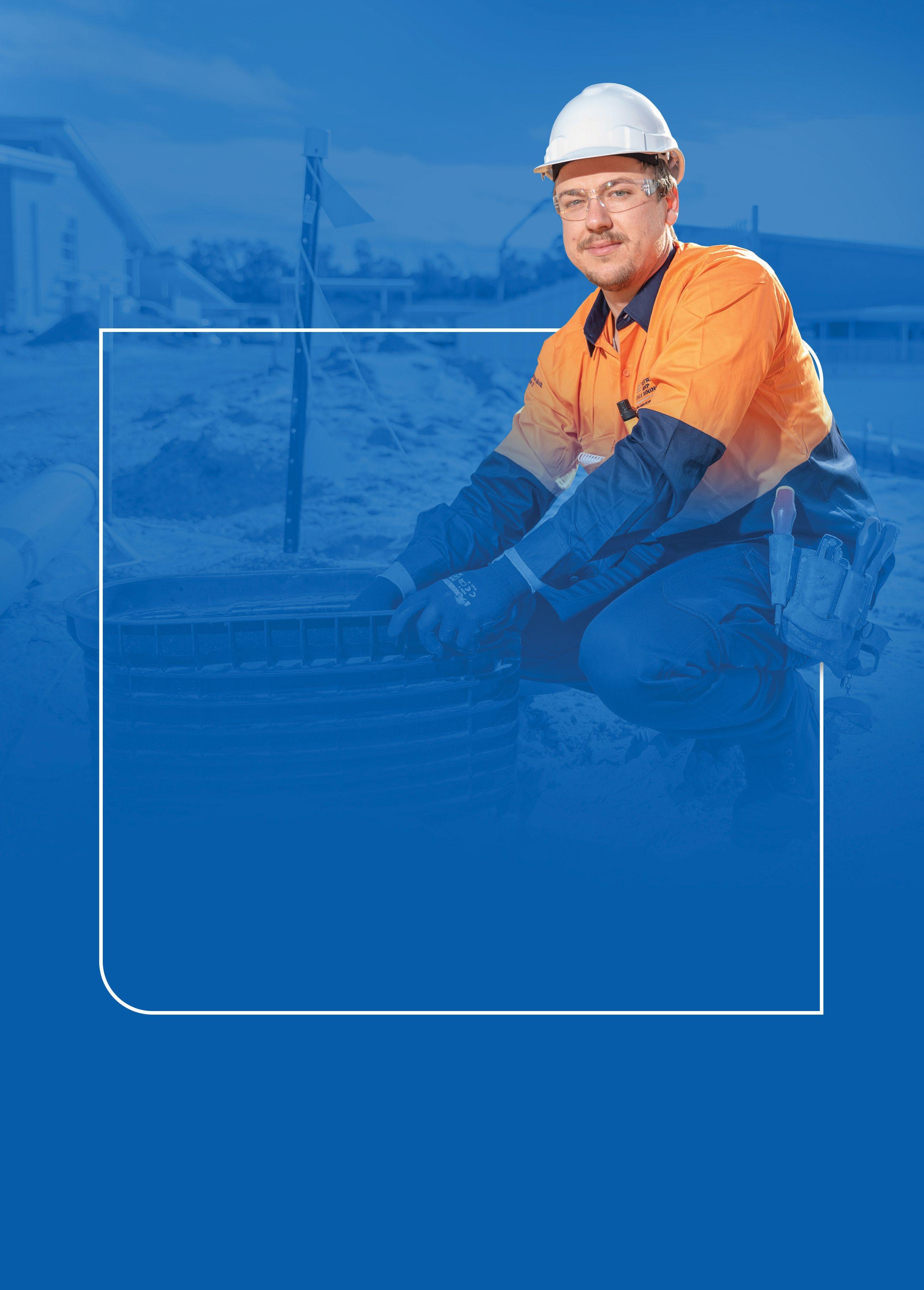
Free access to NECA Workplace Relations specialists
Free access to Workplace Health and Safety advice
Expert Legal advice on contract disputes and negotiation, debt recovery, and representation
Access to discounts or benefits for Fuel, Fleet, Insurance, Health Cover and Mobile
Industry representation at all levels of Government and key industry groups
Access to education and training events, workshops,seminars and industry conference
Access to enter NECA’s prestigious Excellence and Apprentice Awards
Access to industry networking opportunities
MEMBERSHIP STARTS FROM PER WEEK $ 10 .50
NOT A MEMBER? GIVE YOUR LOCAL NECA BRANCH A CALL
Western Power proudly joins the global community to celebrate International Women’s Day (IWD) on 8 March. We recognise, shine a light on, and applaud the social, economic and political achievements of women, and whole heartedly campaign for gender equity.

At Western Power we share the passion and see the enormous potential that comes from valuing and supporting individual differences in our workplace. We’re committed to driving gender balance and fostering a culture of diversity, equity and inclusivity so we can have a workforce that better reflects the community we serve and live in.
Through the work being led by our Gender Equity Employee Network Group, and through our employees, we’re driving actions and outcomes that develop, advocate and celebrate women at Western Power. We’re also actively working to encourage more young women into the electrical engineering and (Science, Technology, Engineering and Maths) STEM space through scholarships and mentoring. We’ve made positive progress in advancing women in energy. Four out of six of our Board members are women. We’ve increased the number of women in leadership roles to 31% and senior leadership roles to 46%. Women now occupy 10% of all engineering
roles in our business, with 20% of these in engineering leadership roles – surpassing the national average. Seven out of 31 of our recently recruited electrical and line workers apprentices were women, and 7% of our electricians are women – exceeding the 2% national average.
We appreciate the challenges that arise in traditionally male-dominated field workforces (more than 50% of our workforce) and are determined to make the changes required to improve diversity and equity.
In celebrating the IWD movement, we’re proud to shine a light on our own talent.
Janica Lukas Distribution Grid Strategy & Planning Manager
Amy is a cable jointer based at the Balcatta Depot’s Customer Connection Services. She left her salesperson role as a 19-year-old to join our 2019 apprentice intake, following in the footsteps of her father and brother.

“I was looking at doing an apprenticeship but wasn’t sure what I wanted to do. I didn’t even know what cable jointing was at the time, but I thought Western Power was a good company and so it went from there,” she said.
“I am really happy here, which is why I have accepted full-time ongoing employment and I am glad this is how it worked out.
“I like how we’re doing something different every day and are able to work outdoors. The people here are pretty cool. I work with a good bunch of people who are very welcoming and inclusive.”
Amy Hunt was awarded Western Power Apprentice of the Year 2022. Amy is a highly respected member of her team and was recognised for her commitment, maturity and helpfulness.
As Western Power’s Distribution Grid Strategy & Planning Manager, Janica Lukas is charged with planning for the rapidly changing future of the distribution network. With an engineering background and more than 18 years’ experience with Western Power, Janica and her team are using engineering expertise to drive an innovative and optimised evolution of the network to support customers’ energy choices.
“I started work at Western Power as a graduate engineer back in 2005. If I had a time machine back then to look at this future, I wouldn’t have believed the amazing transformation of the energy industry. In the last 18 years, I’ve seen Western Power evolve into a dynamic, community focused business that is driving industry leading solutions and technologies to improve the lives of our customers. The people at Western Power are our biggest strength; their combined knowledge, passion and drive never ceases to amaze and inspire me. It is an exciting future to be a part of,” she said.
“Women in engineering are still a small minority within the industry, so it is important to be a representative for younger girls coming through. Hopefully over time there will be more and more women in engineering and it will become the norm rather than an exception.”
WHILE 11 PAGES OF WA’S ELECTRICITY (LICENSING) REGULATIONS 1991 ARE DEDICATED TO THE FUNCTIONS OF WA’S ELECTRICAL LICENSING BOARD (ELB), THE WORK OF ITS EIGHT MEMBERS ULTIMATELY COMES DOWN TO TWO WORDS.
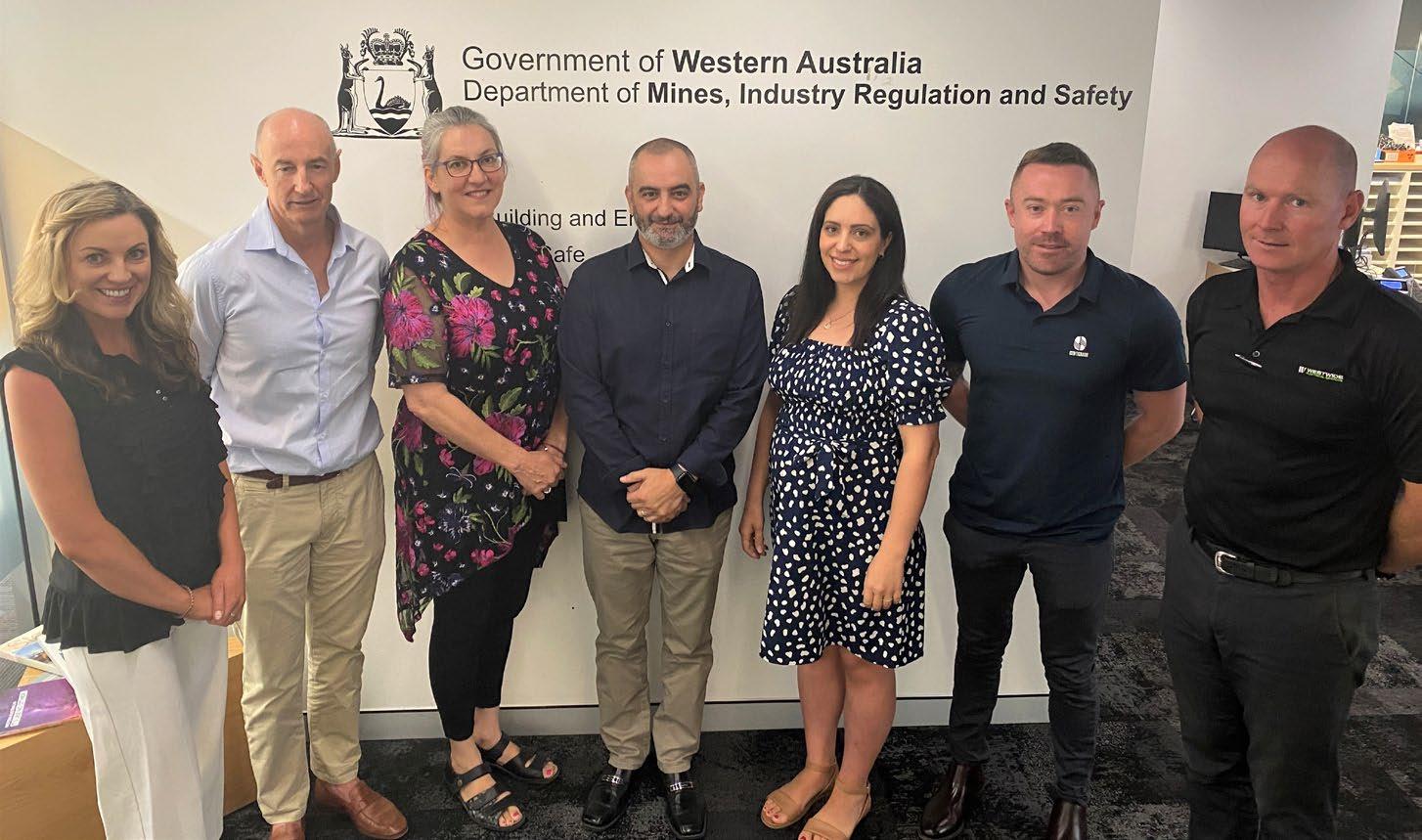

“Community safety,” says ELB Chair Peter Beveridge, who brings almost 40 years of industry experience to the role.
“This is at the heart of the licensing and training matters we oversee. Our primary function is to determine the competence of applicants and holders of electrical licences and permits.
“There are some misconceptions about the Board’s function, but essentially it’s to make sure that
electrical regulations and electrical licensing are aligned, and to ensure the consistency of training to meet those requirements.”
Appointed by the Commerce Minister for three-year terms, each ELB member represents the interests of a particular stakeholder group, including all electrical licence types as well as residential and business consumers. The Board’s determination of electrical licence applications now involves a
stronger emphasis on “fit and proper person” criteria, which includes consideration of the applicant’s criminal or compliance history and the likelihood of improper conduct.
“Fit and proper used to be a small component of the agenda and now it’s front and centre at the start,” Peter says. “All Board members receive training on fitness and propriety requirements and how to assess these for each application.”
The ELB also monitors the training of current and prospective electrical licence holders to ensure they meet competency requirements.
“Our job is to make sure the training packages are delivered in a safe manner and the registered training organisations (RTOs) have the equipment and ability to deliver the training, including a robust on-the-job component,” Peter says.
For example, the Board manages the Capstone assessment, which is part of the final evaluation of electrical apprentices by RTOs. COVID-19 prompted the ELB to allow apprentices to begin their Capstone assessments six months prior to their apprenticeship completion date, compared to three months previously.
Via the Utilities, Engineering, Electrical and Automotive (UEEA) Training Council, the ELB also liaises regularly with trainers, employers and other stakeholders to ensure integration of the Board’s decisions.
Peter Beveridge
Chair
Christopher Sweeting
Representative for licensed electrical contractors
David von Kelaita
Representative for licensed electrical workers
Luke Murphy
Representative for electrical workers with restricted licences
Baldwin Richard Javangwe
Representative for consumers (large electrical businesses)
Lyndsay O’Connell
Representative for consumers (small electrical businesses)

Gillie Anderson
Representative for consumers (residential)
Melissa Mammone
Representative for the Director of Energy Safety
WA’S ELECTRICAL LICENSING BOARD NOW HAS THREE WOMEN AMONG ITS EIGHT MEMBERS.
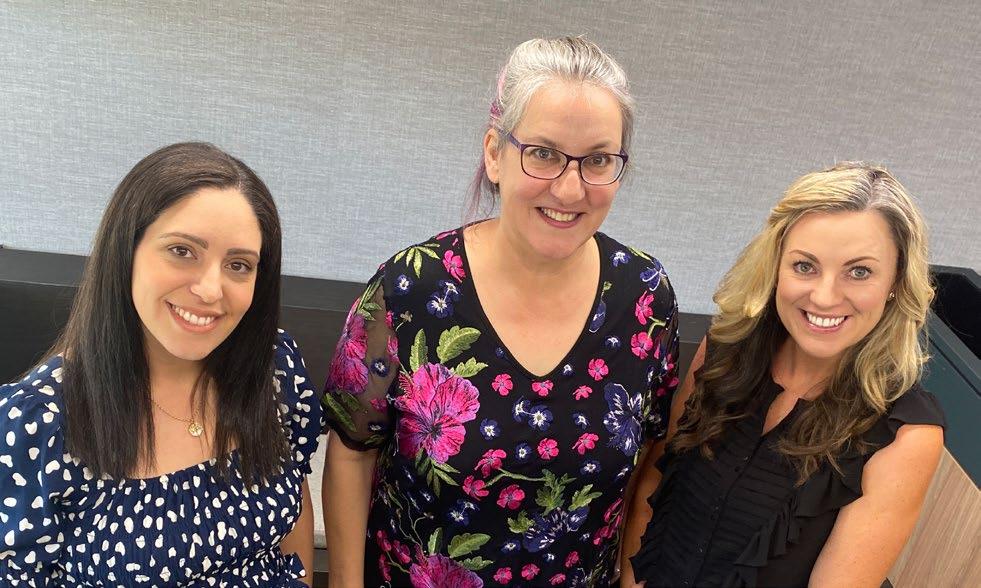
The ELB’s residential consumer representative, Gillie Anderson, comes from a legal and policy background, while Lyndsay O’Connell represents small business consumers, drawing on her property services experience. Melissa Mammone, a chartered accountant and Building and Energy’s market analysis manager, represents WA’s Director of Energy Safety.
“We are all residential consumers, so my primary consideration is the safety of the community,” Gillie says. “I’m not trained as an electrician or directly involved with the industry so I can bring an impartial perspective.” Lyndsay believes empowerment of women as leaders, board members and decision-makers benefits the community and economy.
“Organisations cannot afford to ignore 50% of the potential workforce and expect to be competitive in the global economy,” she adds.
Melissa notes that while the electrical industry is male-dominated, half the consumers in WA are women.
“Alongside the technical issues, the female members may have a closer eye on wording and procedures as well as issues such as personal safety when someone is working in a home,” Melissa says.
WA’s Director of Energy Safety, Saj Abdoolakhan, agrees that the Board’s demographics should mirror the community.
“It’s pleasing to see more diversity on the Board,” he says.
“There is still a lot of work to be done with other organisations and stakeholders towards greater female participation in the electrical contracting industry.”

This edition we are recognising International Women’s Day, an annual event that celebrates the social, economic, cultural and political achievements of women. At the forefront of our mission to improve the electrical industry, is diversifying its participants, and we’re determined to open up apprenticeship opportunities for all Australians regardless of gender!
Increased female participation is integral to re-shaping and enlivening the industry. We thank the women already working in industry for their incredible work, and for their passion, dedication and inspiring stories. We hope that in celebrating International Women’s Day we can continue to provide opportunities for women looking to make a difference, and make sure their voices are heard and valued.
As a mother to a daughter, on International Women’s Day, I embrace the chance to show my daughter how powerful and influential women can be. By acknowledging these incredible role models in our lives - mothers, grandmothers, sisters and daughters – I am teaching her that gender equality is essential for a stronger future of balance and opportunity.
Designed to reward the outstanding achievements of NECA members and apprentices within the electrical industry, entering the nationally recognised awards program provides an opportunity for your company and team to be acknowledged for their outstanding commitment to industry excellence and professionalism.

The NECA Awards are open to all NECA members, regardless of size or scope, and their apprentices. Whether you are a small business or a large established leader in your field, the awards celebrate achievements across the entire industry through three dedicated programs: the Excellence, Small Business and Apprentice Awards. This
year we introduce two new categories for Women in Energy (Individual) and Leaders in Diversity (Business).
We understand that it takes a lot of hard work and commitment to stay at the top of your game, so now is the time to celebrate all that you and your team have achieved. For more information, visit the NECA website.

Persons conducting a business or undertaking (PCBUs) in the ACT will soon face on-the-spot fines of $20,000. The fines will apply if they breach their duties, under subsections 43(1) and (2) of the ACT Work Health and Safety Act 2011 (the WHS Act), to ensure regulated tasks (like those requiring high-risk work licences) are only carried out by workers who are authorised to do so. Additionally, bodies corporate that are prosecuted under the provisions can be fined up to $100,000.
The section 43 offences are among more than 30 offences that have been added to the long list of those attracting infringement notices under the ACT Magistrates Court (Work Health and Safety Infringement Notices) Regulation 2011 The changes were made by the Magistrates Court (Work Health and Safety Infringement Notices) Amendment Regulation 2023 (No 1), which takes effect on 20 March 2023.
The $20,000 on-the-spot fine for section 43 breaches is much higher than those available for other offences, which, for bodies corporate, range from $720 to $6,000.
Individuals will face $4,000 infringement notices for section 43 breaches – again much higher than those available under other provisions.
The explanatory statement for the Amendment Regulation says offences under section 43 carry higher penalties than other infringement notice offences, “due to the significant safety risks that [these] breaches may involve.”
The statement says:
Breaches of sections 43(1) and 43(2) of the WHS Act may result in serious risks to the safety of workers or other people. The ability to issue infringement notices for these offences offers an option for early intervention and deterrence. A matter under these sections that warrants more serious intervention may be prosecuted through the courts in instances where the work safety regulator has deemed this as the more appropriate course.
NECA Members are taking proactive steps towards complying with safety regulators through our free Annual Confidential Compliance Audit as part of their membership.
The audit identifies where your business processes are at risk and makes recommendations. If you are unsure if your business is complying, we recommend that you scan the QR code to connect with a NECA Representative today!
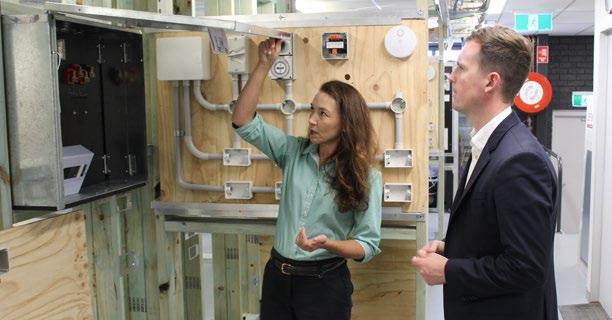
ACT Minister for Skills, Mr Chris Steel, Skills Canberra Acting Executive Branch Manager, Mark Harriott, and Apprentice Employment Network NSW/ ACT Executive Officer, Jason Sultana, recently took time out of their schedules to meet with apprentices and inspect the facilities at NECA’s ACT Centre of Excellence.
The group discussed labour shortages within the construction sector, differences in apprentice subsidies between states and territories and the urgent need to expand NECA’s ACT facility to accommodate the growing demand for electrical apprentices.
Tom Emeleus, General Manager, NECA Training and Apprenticeships said, “The demand is there to immediately double our capacity. We are providing the industry with world-class apprentices, and achieving completion rates and female participation rates that are well above industry benchmarks.
“The issue is that even with our first graduates only just completing, we have simply run out of space to accommodate the number of people wanting to take on an electrical apprenticeship.”
silica exposure prevention with
NECA Training provides the 10830NAT Course in Crystalline Silica Exposure Prevention comprising the nationally endorsed and recognised unit of competency 10830NAT – Course in Crystalline Silica Exposure Prevention.
The course will provide you with all the necessary knowledgewhat silica is, where to find it on the job, and most importantly its associated risks - so that workers can stay safe at work.
Cost: $330 per person.
This cost applies prior to the ACT Training Fund Authority (TFA) subsidy, which can be accessed by eligible businesses. The cost after applying for the subsidy is $230.
Class size: 16.
Unit of competency:
NAT10830001 - Prevent crystalline silica exposure.
Classes are filling quickly, so we recommend registering your expression of interest. A NECA Training Representative will be in touch. Scan the QR code to register.
In our December issue, we wrote a guide for controlling silica dust on construction sites. As the 1 July 2023 deadline looms closer, ACT workers who are likely to encounter materials containing silica dust are required to complete training. Knowing how to protect yourself and your employees from silica dust is not only important, it’s mandatory.
The ACT Government introduced reforms to the Work Health and Safety Regulation 2011 for activities relating to silica dust in July 2022. They are using a staggered approach during this transitional period.
The first reforms introduced under the new WHS amendments explicitly outline dry cutting of engineered stone as prohibited, and the cutting of crystalline silica materials as ‘high risk construction work’.
Persons conducting a business or undertaking (PCBUs) must provide silica awareness training to workers and implement the following control measures to manage silica dust exposure:
½ wet method/suppression systems;
½ on tool dust extraction;
½ segregation of work areas; and
½ respiratory protective equipment.
PCBUs will also be required to keep records of silica dust exposure levels and undertake regular monitoring.
A wide range of occupations, including air-conditioning, building trades, engineers, locksmiths and welders are required to complete 10830NAT – Course in Crystalline Silica Exposure Prevention.
The training for silica awareness must be completed by 1 July 2023. It should be nationally accredited and delivered by a registered training organisation (RTO).

This edition is something special. In celebration of International Women’s Day, we have provided a unique perspective from the women in our industry. For me, International Women’s Day is a day to acknowledge the contributions of all NECA’s female workers who tirelessly work to assist members.
Hi, I’m Julia Cassar, you may have spoken to me at some point as a NECA Member Services Representative. Recently I started a new role at NECA as Account Manager for the Sydney Metro area. I work alongside Mynas Leontios, Sydney Metro Membership Manager. My new role involves looking after small to medium businesses, making sure you are kept up to date about the support offered to you and your business. I also deal with queries regarding insurance, technical support, legal, NECASafe and all other services vital to the operation of your business. Like the rest of the NECA team, I am always happy to help you with any queries you may have.
Throughout the year, I will be conducting one-on-one NECA Membership Health Checks with members within the Sydney Metro area. Our dedicated Membership

Health Checks help you identify any business challenges and barriers, and connect you with NECA’s experts who can provide guidance and support to overcome any issues you may be facing. Through this process we can help you achieve your business goals and objectives, and ensure that you have the necessary tools to be successful. We are also planning our next series of Industry Nights. These events are designed to bring together our leading industry experts and partners in innovation, with plenty of time for networking with like-minded professionals. I am looking forward to meeting you there. Please keep an eye out for our email invites.

NECA Award nominations are now open, and this year we are thrilled to introduce the ‘Women in Energy’ and ‘Leaders in Diversity’ Award categories.
NECA recognises the women and businesses who have made, and are continuing to make, tremendous contributions to our industry. The Women in Energy category recognises individuals who are championing
change for women in the electrical and communications industry. The Leaders in Diversity category recognises businesses making a difference in this space.
The Women in Energy Awards will highlight women who:
½ have shown leadership, courage and resilience in their actions;
½ serve as a role model to other women looking to advance their career in the industry; and
½ can demonstrate their actions and efforts have resulted in positive outcomes for women in their business and/or the wider industry community.
The Leaders in Diversity Award focuses on businesses who have introduced changes that support greater diversity and inclusion in their workplace, and have achieved exceptional results. Their outcomes may be demonstrated in a variety of ways.
We invite you to nominate individuals or businesses who are making a positive impact in the electrical and communications industry and inspiring others to do the same. Let’s celebrate those leading the way towards an inclusive and equitable workforce.
Visit the NECA website for details or connect with a NECA Representative to learn more about these categories.
Sydney Metro Member Manager, Mynas Leontios, recently had the pleasure of meeting with Steve Boromand from Rycon Electrical Services to discuss the value that NECA can bring to his business. From the first moment we met, it was clear that Steve is a professional and cheerful individual who values his customers and looks out for their best interests. He is passionate about providing a quality service to all his customers and takes pride in seeing them get a great outcome from every project he works on.
Being new to the Rycon team, Steve wanted to learn more about the ways NECA can support his business through our core services from technical, workplace health and safety, legal, workplace relations, post-trade training and our range of member benefits. Conducting a NECA
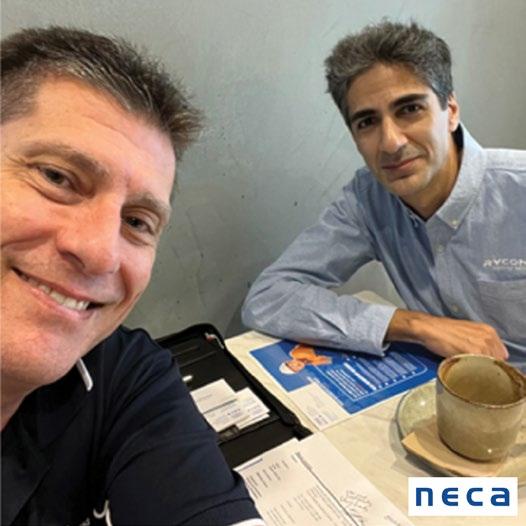
Membership Health Check was a great way to show how these services can be applied to the business and identify any areas that needed further support.
If you would like a site visit or simply to chat with me about how NECA can better support your business, then scan the QR code to submit your details.
NSW Fair Trading are carrying out random compliance checks across NSW and are issuing $500 fines for each breach.
NECA reminds members that under section 37 of the Gas and Electricity (Consumer Safety) Act a CCEW must be completed and submitted to the customer for all electrical work that you carry out. This includes all repairs, upgrades and new work. In certain circumstances the CCEW must be submitted to the network operator and/or NSW Fair Trading. A copy of the CCEW can be downloaded from the NSW Fair Trading website.
Visit www.legislation.nsw.gov.au to view the Gas and Electricity (Consumer Safety) Regulation 2018 – NSW Legislation. If you have a query about complying with this legislation, we recommend you connect with NECA’s Technical experts for advice.
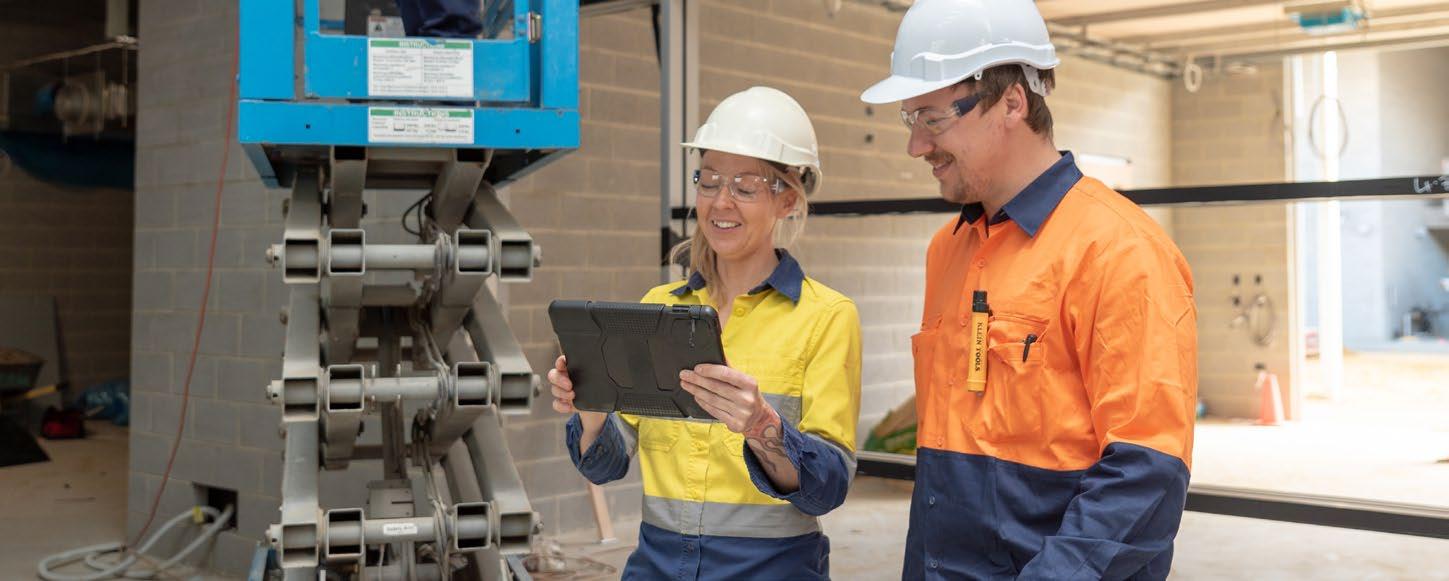
Employers may be in breach of the law if they underpay their employees’ wages, and it’s a serious issue that affects many workers across Australia.
NECA’s legal team recently held a webinar discussing the legal aspects relating to changes to the Fair Work Act 2009 (the Act) on the underpayment of wages, including:
½ what constitutes wage underpayment;
½ how employers can avoid it;
½ what measures employers and employees should take to ensure wages are paid correctly; and
½ the consequences of not complying with legislation.
The webinar can be viewed on the NECA Member’s Knowledge Base.
Underpayment of wages refers to a situation where an employer fails to pay the minimum monetary amounts due to an employee including wages, allowances or penalty rates prescribed by the applicable instrument. An employee can recover any underpayment of wages and/or entitlements under section 539 of the Act. The employee is able to lodge a complaint with respect to an underpayment of wages and/or entitlements to the Fair Work Ombudsman (FWO), or if the employee is a member of a union, they can request their union to instigate an underpayment of wages claim. Where an employer is prosecuted for the recovery of an underpayment, the employer may face penalties of as much as $6,600 per contravention for an individual and $33,000 per contravention for a body corporate.
The Queensland and Victorian Governments passed legislation in 2022 and 2021 respectively to criminalise wage theft. This decision reflects the shift in
characterising wage theft as a criminal act as opposed to an administrative error.
Please note that the NSW Government has tabled a proposed scheme to include criminalising wage theft, but has yet to pass it into law. If this legislation is passed, NSW will follow their eastern border counterparts. The most egregious conduct to systematically and intentionally underpay employees will fit the definition. We will update our members if and when this comes to pass.
As of January 2023, Super Retail Group Limited, which is home to brands such as Rebel Sport, Super Cheap Auto, BCF, Rays Outdoor and more, is facing legal action relating to underpayments of more than $1 million following the discovery of serious contraventions of the Act.
The legal action, which is brought by the FWO, is focused on a specific group of 146 employees, who, between January 2017 and March 2019, were underpaid a total of $1.14 million.
The core of the breaches relates to salaried staff being paid a wage that did not adequately cover their minimum entitlements under the applicable award, or account for their actual overtime worked. Some individual staff were receiving $34,500 less than what they were entitled to.
Employers who do not meet award obligations, including in respect of annualised salaries, are at risk of prosecution and substantial fines.
Underpayments can be calculated as far back as six years, so even where the weekly underpayment may appear trivial, over an extended period these underpayments can grow into substantial sums, which can have serious business impacts.
Employers should act swiftly to remedy any errors. When an employer identifies an error, legal advice should be sought immediately to ensure that the problem is rectified correctly and swiftly.
Underpayment of wages can often happen because of a misunderstanding of the law, a mistake or payroll error.
Before you start trying to fix an underpayment make sure you check the relevant award, enterprise agreement and employment contracts. You will need to consider the worker’s pay slips and time and wages records, information about tax obligations and super guarantee contributions.
Using the pay records, find out during which pay periods the underpayment happened. You will need to calculate how much the employee should have been paid in total during the underpayment period. This should be based on the employee’s pay rate, the number of hours the employee worked and when, compared against what the employee is owed under the applicable industrial instrument including penalty rates, overtime or allowances, leave payments or leave loading or any other entitlements.
Once you determine how much the employee has been underpaid, arrange for a time to speak with your employee about the underpayment. You should explain what happened to cause the underpayment and how it has been fixed. If the underpayment amount is more than the business can afford in a single payment, you may work out a payment plan with the employee. If the employee agrees, you need to make a written agreement, signed by you and the employee, which includes the amount and frequency of the payments and the method of payment.
It is recommended that you contact NECA’s Workplace Relations team as soon as you become concerned about a potential underpayment.
We recommend our members conduct an urgent review of your employee pay records to ensure you are in compliance. To assist members, NECA provides an annual Confidential Wage Audit as part of your NECA membership, which will identify any potential issues in your management of staff and their pay entitlements. Scan the QR code to connect with our legal team for a free NECA member Confidential Annual Wage Audit. All findings of the comprehensive audit review are confidential.
NECA IS CALLING ALL MEMBERS TO BE AWARE OF THE UPCOMING ELECTRICAL SAFETY BLITZ ANNOUNCED BY SAFEWORK NSW IN EARLY 2023. LAST YEAR’S WORKING AT HEIGHTS BLITZ SAW ELECTRICAL CONTRACTORS HIT WITH HEFTY ONTHE-SPOT FINES OF UP TO $3,600 PER BREACH.
Whilst these “blitzes” might seem like a distraction from your work, they are a timely reminder of the dangers our industry faces each day. Tragically, two fatalities occurred last year across New South Wales: one being a 35-year-old man killed while handling energised wires beneath a house.
Our research shows nearly four out of five electrical contractors are at risk of fines due to unsafe electrical work. An alarming 87% lack a complete understanding of energised work or the appropriate safety controls to remain compliant. Almost half of all necessary electrical works don’t have safety observers present. On top of that, apprentice supervision is lacking with 6% of contractors leaving apprentices entirely unsupervised. Such disregard for industry regulations puts many businesses on course for compliance trouble.
Over the coming weeks, NECA will provide members with updates on SafeWork’s blitz.

Individuals and corporations can now be handed infringement notices of $720 and $3,600 respectively for:
½ failing to ensure electrical equipment is tested by a competent person to determine whether or not it is energised before electrical work is carried out on it;
½ not ensuring electrical risks associated with the supply of electricity to electrical equipment through a socket outlet are minimised by the use of an appropriate RCD;
½ failing to ensure, so far as is reasonably practicable, that no person, plant or thing at a workplace comes within an unsafe distance of an overhead or underground electric line (or failing to implement prescribed controls where this isn’t reasonably practicable); and
½ breaching asbestosrelated clauses around signage and barricades, clearance inspections, and clearance certificates.
Individuals and corporations also can now be handed on-thespot fines of $432 and $2,160 respectively for:
½ failing to ensure any unsafe electrical equipment at a workplace is disconnected or isolated from its electricity supply, and, once disconnected or isolated, is not reconnected until it is repaired or tested and found to be safe, or is replaced or permanently removed from use;
½ using, or directing or allowing a worker to use, high-pressure water spray or compressed air on asbestos-containing materials; and
½ allowing the uncontrolled use, on asbestos-containing materials, of power tools, brooms or other implements that cause the release of asbestos into the atmosphere.

If you need advice or support to comply with WHS regulations, we encourage you to connect with our safety experts.
As a NECA member, you receive unlimited phone and email advice on all safety issues. Our team specialise in the electrical industry to assist members with their questions and challenges. We provide a range of extra services including document development, workplace audits and inspections, root cause investigations and toolbox training.
To help you identify areas of non-compliance within your job sites, all NECA members have access to an Annual Confidential Safety Audit. The review will identify any potential blind spots in your safety protocols to help you protect yourself and your employees from costly fines and injuries. All findings of the comprehensive review are confidential. Scan the QR code to register your interest.
Anna Hahm Senior Associate, NECA Legal Emily Boesen Senior Paralegal,NECA Legal
NECA ELECTRICAL APPRENTICESHIPS HAS JUST RECRUITED 193 NEW APPRENTICES IN THE LATEST RECRUITMENT PERIOD, ACROSS NSW, THE ACT AND QLD. WE WELCOME THESE YOUNG MEN AND WOMEN TO THE ELECTRICAL CONTRACTING INDUSTRY AND WISH THEM A LONG, SAFE AND REWARDING CAREER. THIS LARGE NUMBER OF QUALITY CANDIDATES HAS BEEN A WELCOME RESULT FOR OUR GROUP TRAINING ORGANISATION, GIVEN THE CHALLENGING RECRUITMENT ENVIRONMENT THAT FOLLOWED THE COVID-19 PANDEMIC.
Over 173 fourth-year apprentices recently completed their training; almost all took up trade employment immediately with either their host company or another NECA member. Seeing this large group of apprentices go through to completion this year reflects the quality of NECA’s apprentices, which is primarily driven by the excellent on-thejob training opportunities our host companies have provided.
This year we welcome 28 new female apprentices to NECA. NECA Electrical Apprenticeships is proud to be driving up female participation, with our current recruitment cohort including an above-industry average of 14.5%.
Group training is a uniquely Australian model developed in the 1980s to support a whole industry’s future workforce needs. Many employers can’t be sure they’ll have four years of steady, suitable work for an apprentice, or perhaps the whole variety of work required to complete a trade. Others may hold back due to the risks associated with employing apprentices, or the complex administration that apprenticeships involve.
Anyone employing an apprentice has to pay for their recruitment, training, personal protective equipment, uniforms, wages, superannuation, workers compensation and more. Like other employees, apprentices accrue annual and sick leave. NECA Electrical
Apprenticeships charges rates that are close to the total cost of employing an apprentice, but spread only across their productive days. We pay them while they’re at college and on leave. We also take on most of the employment risks. NECA’s model also addresses a common concern: that you’ll train someone up, and they’ll be employed elsewhere. With group training, we manage the apprentices’ training, and at completion, you have the opportunity to employ them. NECA Electrical Apprenticeships only exists to provide quality apprentices. In most cases, our apprentices are just as much part of your permanent team as directly-employed apprentices, and they are working towards becoming your future tradesperson.
NECA Electrical Apprenticeships is a registered not-for-profit and education charity, so its funds are put back into the apprentices to fund training. This includes our purpose-built training facilities, and funding specialist courses that support apprentices in pursuing their chosen career path. With this approach, NECA Electrical Apprenticeships can provide the specialists and future leaders NECA’s members need.
Have you got a question about employing apprentices or would you like to enquire about becoming a host? Call your local NECA Electrical Apprenticeships office via the details opposite, or email us at contact@necatraining.com.au
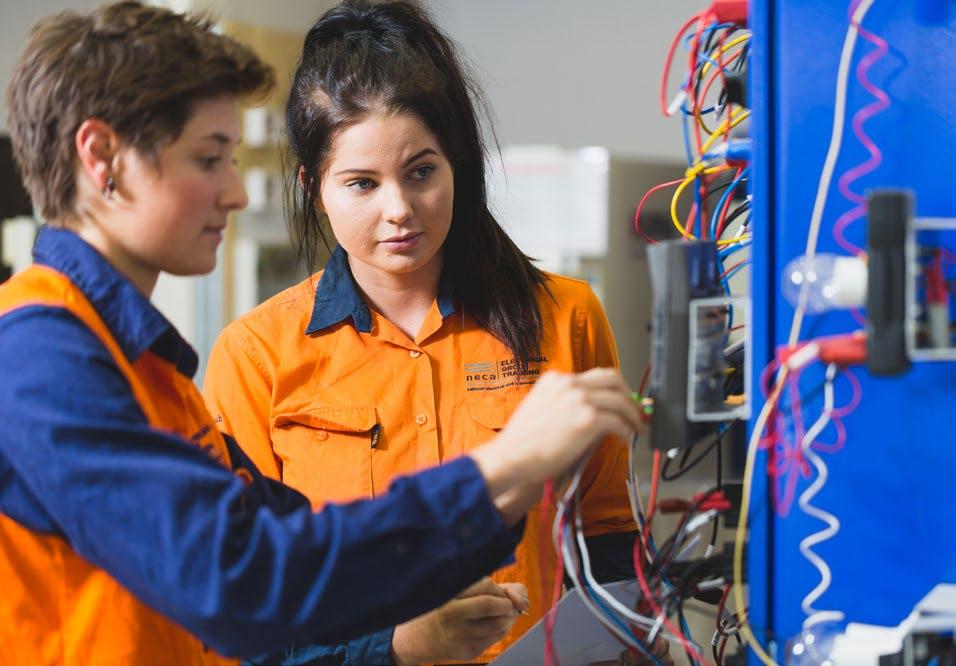
The Australian Cabler Registration Service (ACRS) continues to grow the number of registered cablers that use its services to assess requisite training and provide registration. It is mandatory to have your cabler registration in order to undertake work in data and telecommunications cabling.
While registration numbers are going up, the number of registered cablers who fail to renew their registration when it expires remains a concern. Anyone who continues to work on data and telecommunications cabling while not registered, is operating with high risk. Firstly, there is a risk of enforcement action from the Australian Communications and Media Authority (ACMA). Secondly, if something goes wrong, the work performed may not be covered by insurance, potentially leaving an unregistered worker with a significant financial liability that could cripple their business.
This is all at a time when technology is advancing in such leaps and bounds, that data and telecommunication cabling work is becoming more important to business improvements as well as home accessibility.

In this regard, home automation is becoming increasingly popular, with new systems offering both convenience and energy efficiency. Connected entertainment systems, have opened the door to smarter homes that provide improvements to comfort, convenience, and control.
With the rising cost of living, homeowners are becoming increasingly aware of the impact that energy bills have on their budget. Heating and cooling systems are major home energy costs, as are appliances, hot water and lighting. Using smart products is a great way to optimise home energy efficiency, while also adding comfort to homeowners’ lifestyles.
At this time, we are also starting to see a return to a more ‘normal” lifestyle, with a combination of work from home and work from offices being the norm. People are starting to travel again, but the economy is suffering from high inflation and interest rate rises.
There has also been an unwelcome growth in hacks and scams. ACMA has been active in introducing tighter rules on businesses and telcos in particular, in order to better protect people’s information and actively seek to block scams.
According to ACMA, since the Reducing Scam Calls and Scam SMS Industry Code came into effect in December 2020, Telcos have blocked more than 955 million scam calls and more than 90 million scam SMSs. Both businesses and individuals need to be forever vigilant. When in doubt, if you think a call or SMS might be a scam then you should treat it like it is, and contact the business listed through their normal phone channels.
The Electrical Safety Office (ESO) has announced that it will be applying the wiring rules published in AS/NZS 3000 Amendment 2 from 30 April 2023, with no exemptions for existing projects.

ESO advises that installing an incorrect safety switch type, or installing fixed equipment without checking if the safety switch on the circuit is suitable, may leave the electrical installation unsafe. If this occurs, then ESO considers that you have not met your duties under the Electrical Safety Act and you will face enforcement action.
AS/NZS 3000 Amendment 2 was published on 30 April 2021 and ESO allowed a transitionary period of 24 months from the publication date. This will expire on 30 April 2023.
Under the transitionary period either Type AC or Type A RCDs could be installed. From 30 April 2023, Type AC RCDs must not be installed.
Electrical contractors should review their current projects to ensure RCDs installed after 30 April 2023 comply with this requirement. If you have any Type AC RCDs, return them to your wholesaler or retailer from this time.

SITTING IN MY TRADE CLASS, I WAS FIRST INTRODUCED TO THE CHALLENGE THAT MANY WOMEN FACE ENTERING A MALE-DOMINATED INDUSTRY. TO SET THE SCENE, I HAD A FEMALE TEACHER, AND, ONE OF THE STUDENTS SITTING IN MY ROW WAS ALSO A WOMAN! BUT THAT WASN’T THE CHALLENGE.
The challenges were many, but best represented by the rest of the class – a group of 18-24-year-old males. As males had made up the vast majority of all classes in our college for many years, our college didn’t have a female toilet in the block. The hairdressing one did of course. As did the administration block. But our block was built in an era where women in trade was not a term men conceived, let alone used. The facilities, the terminology and yes, some men, were not prepared for the presence of women in trades – that was the challenge. By the end of the year however, the female student was top of the class, the trainer one of the very best I’ve ever had, and the world hadn’t changed. Maybe that’s the problem. Over three decades later, I’m sitting with my recently graduated daughter, who just commenced her cyber security course, another industry with low female participation rates. She’s enjoyed a great life that’s come off the back of her father’s trade. When she was younger, she came to sites (where it was safe and appropriate of course) and had fun. She saw the projects I worked on, the places the trade took me. Yet with an almost guaranteed start in my trade, she showed little to no interest in becoming a sparky. Why?
Over a coffee, she explained – it’s a longer course, way too much maths, concerns over employment and how supportive her potential employer would be. She admits that cyber security is probably not all that different, but she’ll have her first qualification in a year, she makes three times what an apprentice does an hour working casually in retail, and class starts at 11am.
I sold her the dream – money, toys, holidays, long-term career prospects. What did I do wrong?! But maybe the dream isn’t what we need to sell. What we need to do is change the reality. Our trade takes four years to complete. The electrical trade does have a lot of maths, or STEM as we now refer to it. The wages are low compared to retail, and yes – we start early!
Now for around 2% of our workforce, that’s not been a barrier. Female participation in trades has sat around that number for a long time. Despite numerous programs, incentives and education, the rate remains stubbornly fixed. Why?
While attitudes are clearly still an issue, the fundamentals of the industry present barriers to female participation. Recently I was asked to provide comment on

another paper commissioned by the Federal Government around improving the female participation rate. The same things we’ve been saying for decades about the construction industry were once again the subject. The industry doesn’t really make it easy for females. Day care centres don’t open early enough, amenities are not accommodating, even the way tools are designed can make pursuing the trade less desirable than other career options.
The dream we sell, the utes, jet skis, boats and the like, offset the inconvenience of working on sites. But when that dream is unappealing to most women, as a 2% participation rate clearly indicates, those inconveniences stop being that, they become barriers to entry. Maybe that dream is over, time to dream another dream.
Support for women in trades requires more than money, assurances or changing attitudes. It requires wholesale change to break down the barriers, and then the dream we sell will be whatever our future sparkies wish to pursue, both at work and out of it. They’ll find their dream; we just need to provide the foundations for them to build it on.
Steve Hall General Manager, College of Electrical Training
ABORIGINAL

ABORIGINAL PROCUREMENT & ELECTRICAL WHOLESALING WE OFFER est nergy


US NOW US NOW
US NOW US NOW
product
In Joint Venture with Australia’s largest electrical/industrial and renewable energy produc supplier MM Electrical Merchandising.
In Joint Venture with Australia’s largest electrical/industrial and renewable energy product supplier MM Electrical Merchandising.
In Joint Venture with Australia’s largest electrical/industrial and renewable energy product supplier MM Electrical Merchandising.
In Joint Venture with Australia’s largest electrical/industrial and renewable energy product supplier MM Electrical Merchandising.
www.KimakaMM.com.au
In Joint Venture with Australia’s largest electrical/industrial and renewable energy pro supplier MM Electrical Merchandising.
one










Kimaka MM is committed to being the number one Aboriginal wholesaler for all electrical, communications, data, solar lighting products, domestic appliances and associated electrical components.
Kimaka MM is committed to being the number on Aboriginal wholesaler for all electrical, communications, data, solar lighting products, domestic appliances and associated electrical components.

Kimaka MM is committed to being the number one Aboriginal wholesaler for all electrical, communications, data, solar lighting products, domestic appliances and associated electrical components.
Kimaka MM is committed to being the number o Aboriginal wholesaler for all electrical, communications, data, solar lighting products, domestic appliances and associated electrical components.
CONT
MMEM HAS OVER 320+ BRANCHES TRADING ACROSS ALL STATES
MMEM HAS OVER 320+ BRANCHES TRADING ACROSS ALL STATES
a a tted to being the number one Aboriginal wholesaler for all electrical, communications, data, solar lighting products, i i i ed electrical
MMEM HAS OVER 320+ BRANCHES TRADING ACROSS ALL STATES
MMEM HAS OVER 320+ BRANCHES TRADING ACROSS ALL STATES
Kimaka MM is committed to being the number Aboriginal wholesaler for all electrical, communications, data, solar lighting products domestic appliances and associated electrical components.


&
Metal Manufactures Pty Limited, with a 100+ year history, trading under the trusted brands within NSW such as, TLE Electrical, Cetnaj, Go Electrical & Greentech.

MMEM HAS OVER 320+ BRANCHES TRADING ACROSS ALL STATES
ABORIGINAL PROCUREMENT & ELECTRICAL WHOLESALING WE OFFER www.KimakaM












MMEM HAS OVER 320+ BRANCHES TRADING ACROSS ALL STATES
Me fa t his y, di g t d brands with NSW such as, TLE Electrical Cetnaj Go Electric Greentech.


THE NEW PAID PARENTAL LEAVE AMENDMENT (IMPROVEMENTS FOR FAMILIES AND GENDER EQUALITY) BILL 2022 (THE BILL) WAS PASSED THROUGH THE HOUSE OF REPRESENTATIVES ON 9 FEBRUARY 2023.
Pending passage through the Senate, the Bill will need to be passed by March 2023, so parents expecting to give birth or adopt, on or after 1 July 2023, have the option to pre-claim to receive their government entitlement as soon as they are eligible.
These changes to the Bill aim to improve gender equality by supporting women’s workforce participation and addresses the common assumption that the primary carer, usually the mother, is the lower income earner in a relationship.
The main changes
½ from 1 July 2023, the Parental Leave Pay (18 weeks) and Dad Partner Pay (2 weeks) schemes are combined to create a single parental leave payment (PLP) available for 20 weeks. This is paid at the current minimum wage;
½ couple parents cannot claim more than 18 weeks PLP each;
½ single parents will be eligible to claim the full 20 weeks;
½ there is flexibility for both parents to access two weeks of PLP concurrently;
½ the Bill removes the three categories of primary, secondary and tertiary claimant, and the requirement that the primary claimant must be the birth parent;
½ there is now flexibility for fathers and partners to claim PLP in their own right;
½ the income limit has increased to $350,000 for the family assessment if the parents do not meet the individual income test. This will be indexed from 2024.
The PLP income test is now a family income test with an increased limit to $350,000. Families can be assessed if they do not meet the individual income test.

One effect of the changes in the Bill, is that a single parent who fails the individual income test shall be assessed against the new family income limit.
The changes to Division 4 of part 2-3 PPL introduce new income testing arrangements, under the new proposed section 37, with parents being eligible:
a. If the person’s income is not more than the individual PPL income limited proposed subsection 37 (1);
b. If the person does not have a partner and their income is not more than the family PPL income limit proposed subsection 37 (2); or
c. If the person has a partner and the total of the persons’ income and the partner’s income is not more than the family PPL income limit proposed subsection 37 (3).
This amendment allows fathers and partners to claim a payment without the birth parent having to make a successful claim first.
Fathers and partners will be eligible to make a claim for PLP in their own right.
Anna Hahm Senior Associate, NECA Legal
PLP claimants must satisfy a work test and residency test.
A claimant must have performed 330 hours of qualifying work over a period of at least 295 days (approximately 10 months) within their work test period. The work test period is a 395day period (approximately 13 months) prior to the expected or actual date of birth or place of child for adoption.
A claimant must be living in Australia when their child is born or adopted, and they must have Australian Citizenship, a permanent visa, or certain visa categories.
There will be a newly arrived waiting period for migrants who may have to wait two years before they are eligible for PLP.
Further legislation will be introduced to progressively increase the PLP scheme by two weeks from July 2024 to 26 weeks by 2026.
NECA Legal is here to assist all our members navigate through upcoming legislative changes to ensure legislative compliance.
Please do not hesitate to contact the legal team in your state or territory should you require assistance.

The proposed Workplace Gender Equality Amendments (Closing the Gender Pay Gap) Bill 2023 (the Bill) is before the Senate and was circulated by the Minister for Women, Senator the Honourable Katy Gallagher.
Since the start of 2023, the government has legislated Paid Family and Domestic Violence Leave, introduced the new Paid Parental Leave Scheme and now the Workplace Gender equality amendments, which seek to close the gender pay gap. Rest assured, there will be more legislative changes to follow.
The gender pay gap data, as published on Workplace Gender Equality Agency (WGEA), notes Australia’s national gender pay gap is currently 14.1%. This was an increase of 0.03% from the previous six months (www.wgea. gov.au). This is not just Australia’s problem but a global issue.
As of May 2022, on average weekly ordinary full-time earnings across all industries and occupations, women earn $263.90 less than men each week.
When women make up 50% of the workforce, it is imperative that the gender pay gap is narrowed to help reduce the disparity between men and women, and increase Australia’s productivity.
Across different states the gender pay gap data shows that Western Australia has the widest gender pay gap of 22.4%, and South Australia has the smallest gender pay gap of 7.4%. This is due to the larger share of the mining and construction industry in WA, which has relatively high earnings and low representation of women. In South Australia and the ACT, the public sector workforce is larger than other states and this has a lower gender pay gap and more balanced gender representation.
Once passed, the Bill will apply to relevant employers. The Workplace Gender Equality Act is expected to have a new section 4, which will define the criteria of a relevant employer as follows:
1. A registered higher education institution that is an employer; or
2. A natural person, or a body or association (whether incorporated or not), being the employer of 100 or more employees in Australia; or
3. A commonwealth company that is an employer of 100 or more employees in Australia; or
4. A commonwealth entity that is an employer of 100 or more employees in Australia.
The Bill will require medium and large businesses, as defined by the Fair Work Act 2009, to prepare a public report, detailing aggregate pay information for each reporting period (the 12-month period from 1 April to 31 March for private companies or entities), for the purpose of showing employer performance and progress in achieving gender equality. This report will subsequently be published, in a push for transparency and an action to close the gender pay gap.
The Bill sets out six gender equality indicators against which employers must report:
1. gender composition of the workforce;
2. gender composition of governing bodies;
3. equal renumeration between women and men;
Dina Ladki Paralegal, NECA Legal
4. availability and utility of employment terms, conditions and practices relating to flexible work arrangements;
5. consultation with employees on issues concerning gender equality in the workplace; and
6. sex-based harassment and discrimination.
The Bill aims to amend the existing gender equality indicators to encompass broader definitions, and improve strategies and policies to bridge the gap to strengthen the existing minimum standards.
Previously, companies of a certain size reported renumeration data to the WGEA, excluding individual employee renumeration. Currently, public data sets show a breakdown of the gender pay gap according to industry rather than at an individual company level.
If implemented, the changes will mean individual company pay rates will be reported to the WGEA and available for viewing by the public.
You don’t need to do anything yet. The Bill is being debated in the Senate and is yet to pass. However, keeping up to date with any changes to the Bill will ensure you are equipped to implement any future changes within your business.
SOME OF THE CHANGES MADE TO THE FAIR WORK ACT AND IMPLEMENTED BY THE SECURE JOBS BETTER PAY ACT, SUCH AS PROHIBITING SEXUAL HARASSMENT OF WORKERS, WERE AIMED AT ENSURING AUSTRALIA COMPLIES WITH INTERNATIONAL LABOUR ORGANIZATION CONVENTION NUMBER 111 DISCRIMINATION (EMPLOYMENT AND OCCUPATION), WHICH WAS EXECUTED IN GENEVA ON 25 JUNE 1958.
Under section 527D of the amended Fair Work Act, a person must not sexually harass another person who is a worker, or seeking to become a worker, or a person conducting a business or undertaking. The penalty for non-compliance with this civil penalty provision is up to $16,500 for individuals and $82,500 for a body corporate. These changes took effect on 6 March 2023.
Employers may be liable under this Part of the Fair Work Act for actions performed by their employees or agents. Vicarious liability, however, does not apply if the employer proves that it (or he/she in the event of a principal) took all reasonable steps to prevent the sexual harassment.

Applications may be made to the Fair Work Commission (FWC) to deal with a dispute about an alleged contravention of this Part, including by making a stop sexual harassment order.
When an application is made to the FWC to deal with a sexual harassment dispute, and the FWC considers there is a risk that the aggrieved person will continue to be sexually harassed, it can make a stop sexual harassment order. Alternatively, the FWC can address the matter in another way, such as through conciliation or by making a recommendation. Such an application to the FWC must be made within 24 months of the alleged conduct. However, the FWC
is unable to make an order for payment of a pecuniary amount. In most cases, a dispute about an alleged contravention of this Part is only dealt with by a court if the dispute was not resolved by the FWC.
A person who has brought such an application to the FWC must not make a sexual harassment court application unless certain requirements are met. If the parties agree to the FWC arbitrating
the dispute, a sexual harassment court application cannot be made.
There is also a limitation on bringing an application to the FWC in circumstances where the complainant has already lodged a complaint with the Australian Human Rights Commission, unless that complaint is withdrawn or has failed for want of jurisdiction.
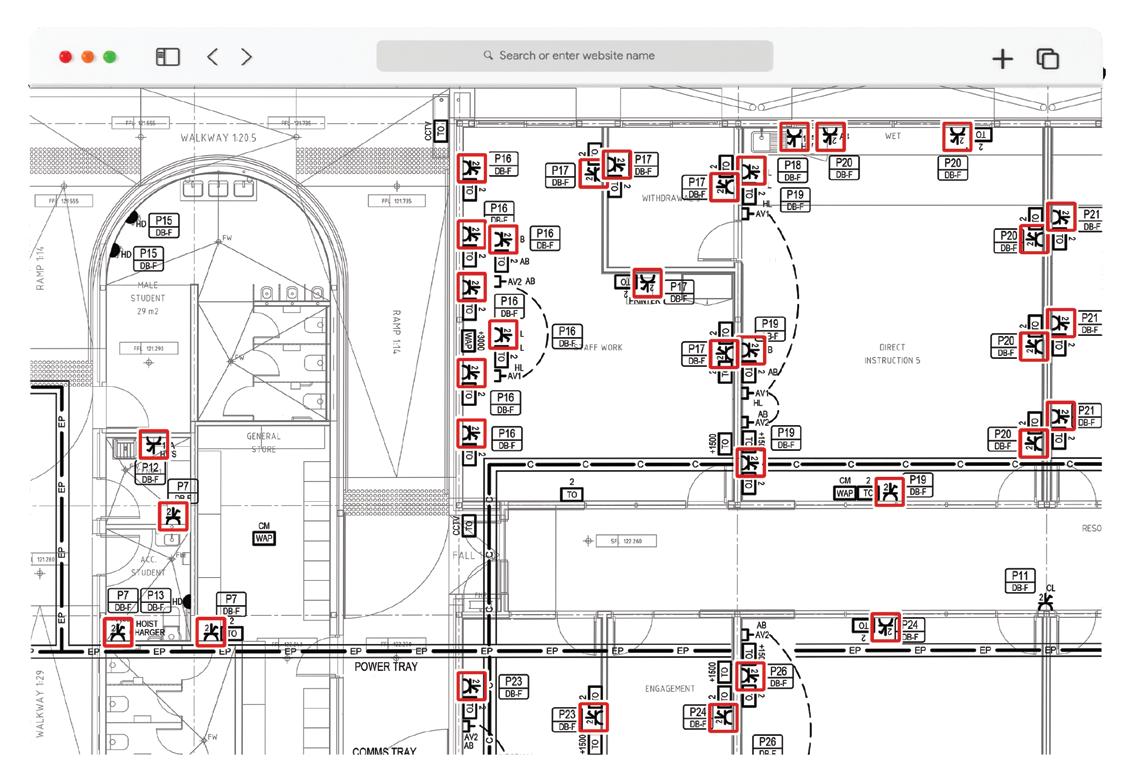

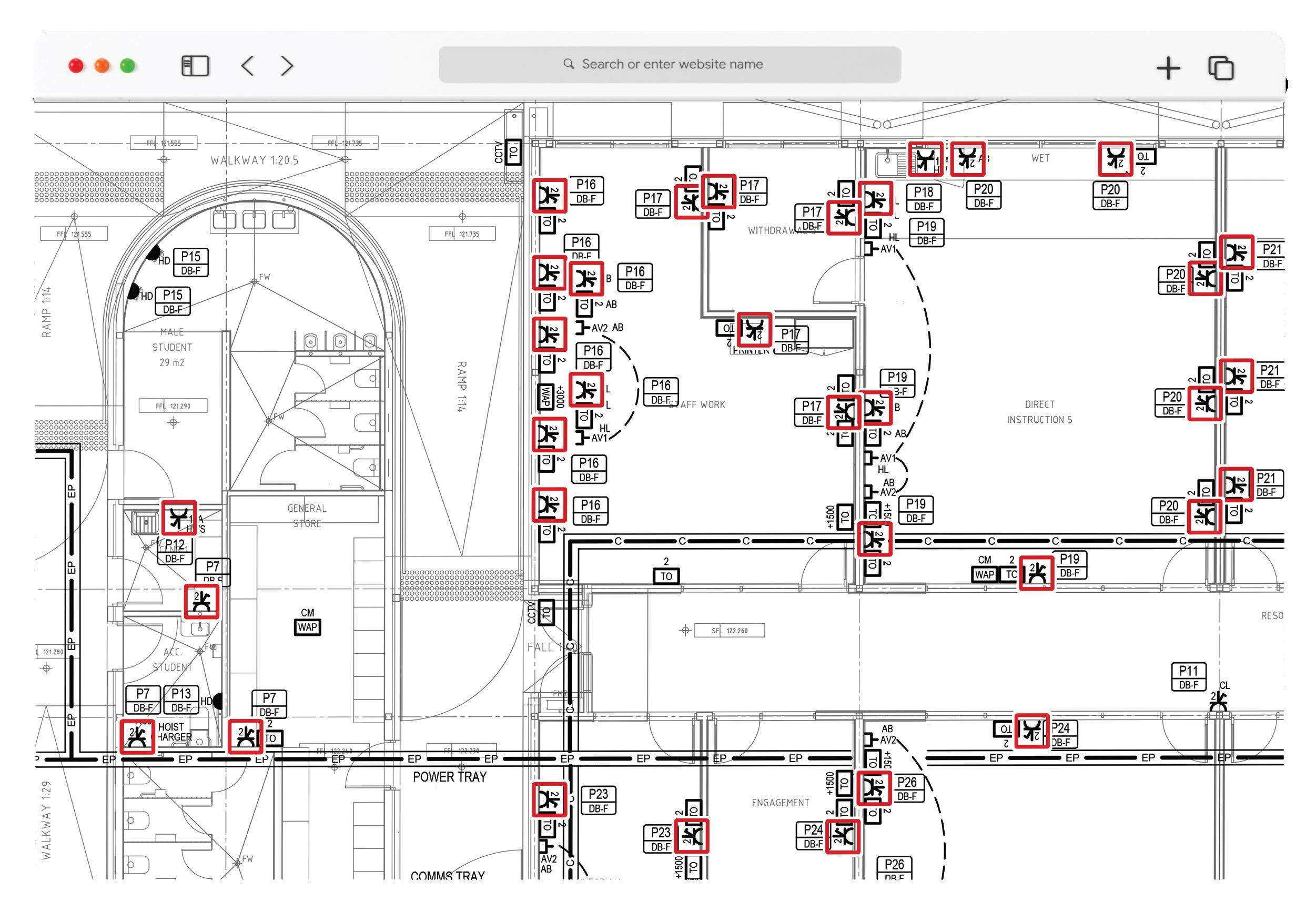

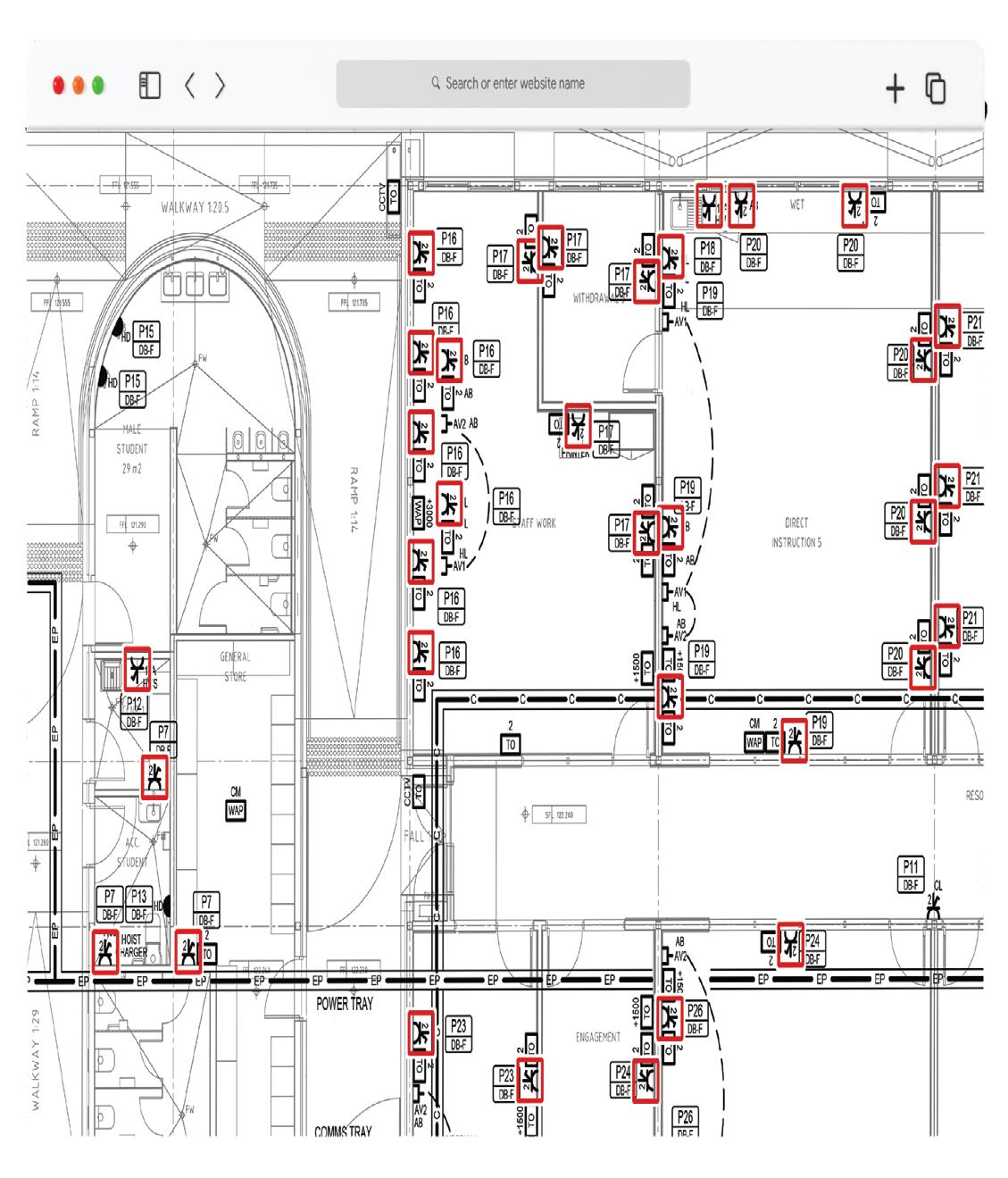

PERFORMANCE MANAGEMENT, DISCIPLINARY ACTION AND TERMINATION OF EMPLOYMENT ARE THE MOST COMMON YET MOST CHALLENGING AND RISKY PROCESSES FOR BUSINESSES. EMPLOYERS OFTEN STRUGGLE TO ADDRESS THE SITUATION WHEN THEIR EMPLOYEES ARE UNDERPERFORMING, AND DON’T KNOW HOW TO HANDLE DISCIPLINARY ACTION OR TERMINATION OF EMPLOYMENT. HOWEVER, IT IS CRUCIAL FOR EMPLOYERS TO ADDRESS ISSUES OF UNDERPERFORMANCE TO AVOID NEGATIVE EFFECTS ON THEIR BUSINESS.
This article will provide a guide on managing underperformance, undertaking disciplinary action and effecting termination of employment in a manner that will minimise risks of claims being successfully taken against employers.

Performance
Managing performance and behaviour effectively in the workplace is beneficial for both employees and employers.
Underperformance occurs when an employee is not doing their job properly or is behaving in an unacceptable way at work. It may include not carrying out their work to the required standard or not doing their job at all, not following workplace policies, rules or procedures, and disruptive or negative behaviour
at work. Note that underperformance is separate to serious misconduct, which is discussed below.
To address underperformance, the employer should first consider if there are any rules to be followed under any applicable award or registered agreement, contract of employment or a workplace policy. A workplace policy may provide an outline of any performance management systems in place and the steps that need to be taken.
Secondly, the employer should meet with the employee privately to discuss the underperformance. In this meeting the employer must be upfront about the issues or concerns and give the employee a chance to respond. The meeting should be documented as well
as any solutions and outcomes that have been agreed between the parties.
Employers should also consider the best way to prevent underperformance, including having clear position descriptions outlining behavioural and outcome expectations, having regular performance reviews, encouraging employees to address issues with their manager and promptly dealing with any issues that arise.
An employer may decide to take disciplinary action against an employee including issuing a warning. We note that this will depend on the circumstances, and recommend seeking independent legal advice prior to taking any disciplinary action, as there are a number of claims an employee may commence to challenge these actions.
If an employer decides to issue a warning, this warning should be in writing and outline the issue or concern and the action that must be taken by the employee to address it. The warning must be fair and reasonable in the circumstances. The warning should also clearly explain the possible consequences of not addressing the underperformance including further disciplinary action or termination of employment.
Employers should ensure that they are proactive in following up any underperformance including holding regular followup meetings to track progress.
If the employee continues to underperform, employers may consider
further meetings with the employee, issuing a warning or additional warning, providing the employee with additional training and/or termination of employment as a last resort.
There is no general rule on the number of warnings that must be given to an employee before ending their employment; however, generally an employer should give the employee an opportunity to fix any performance issues before terminating their employment. If they don’t, then this may be taken into consideration by the Fair Work Commission in any unfair dismissal application made by the employee.


If an employer decides to terminate an employee’s employment, then they must make sure the dismissal is not harsh, unjust or unreasonable as this might then constitute an unfair dismissal.
Employers should give reasons for termination and give the employee a chance to respond. The termination should be confirmed in writing and appropriate notice given. The employer must also ensure that the employee is given the right final pay, including payment for accrued entitlements. Again, we recommend seeking independent legal advice prior to termination.
In any meeting where termination of employment is a possibility, an employer must not unreasonably refuse to allow an employee to have a support person present.

Serious misconduct is when an employee causes serious and imminent risk to the health and safety of another person, or to the reputation of profits of their employer’s business, and deliberately behaves in a way that’s inconsistent with continuing their employment. This can justify termination without notice (summary dismissal). However, the employer must still follow a fair process before effecting the termination. This includes providing the employee with the opportunity to respond to the allegations.
If an employer is a small business owner it is important that they follow the Small Business Fair Dismissal Code (the Code) when terminating an employee’s employment. A small business is defined as any business with less than 15 employees.
The Code requires (other than in a case of summary dismissal for misconduct) that an employee is warned about performance concerns and be given the opportunity to respond and rectify any concerns.
The Code provides that it is fair to dismiss an employee without notice or warning where the employer believes, on reasonable grounds, that the employee’s conduct is sufficiently serious to justify summary dismissal. The employer must show that they had reasonable grounds to hold the belief. This can be established by showing the steps taken by the employer, which might include an investigation into the facts.
Employers should exercise caution when dealing with misconduct, underperformance, disciplinary action and termination of employment. It is
recommended that employers seek legal advice to ensure the process is conducted properly to minimise any claims against their business.
Our workplace relations team can assist you with all aspects of managing employee performance and behaviour including specific advice in relation to:
½ current performance and misconduct matters;
½ the laws that apply when managing an employee’s performance and considering termination of employment;
½ reviewing policies and processes; and
½ drafting warning and termination letters.
If you need assistance with disciplinary action, employee management or employee termination please contact the Workplace Relations Advisor at your local NECA branch. If further action is required, we can refer you to your local NECA legal team.

WHEN I WAS YOUNG AND JUST STARTING MY FIRST JOB, I WORKED IN A SOIL-SCIENCE LABORATORY, WHICH WAS PART OF THE UNIVERSITY OF ADELAIDE’S, AGRICULTURAL RESEARCH INSTITUTE. I DIDN’T KNOW MUCH ABOUT SOILS, BUT I KNEW CHEMISTRY FROM SCHOOL AND WAS GRATEFUL TO HAVE THE OPPORTUNITY TO EXPERIENCE WORK IN A REAL SCIENCE LABORATORY.
I was one of four school leavers hired at the same time and the only female. The department was all male too, except for the secretary, Jan (Yes, we still had one). A similar ratio of female to male numbers permeated the entire research institute. The highest concentration of women workers was in the typing-pool (Wow; and yes, we still had one of those too).
Having come from an all-girls school, it was a surprise to find the favourite topics of conversation at morning and afternoon-tea included sex, porn stars and girls. The guys were not at all self-conscious about this. They were a happy bunch and thought nothing of joking behind Jan’s back about the time a research student asked her for two large “floppies”, (5 ¼’ computer diskettes) and she replied she only had a couple of small ones. A “joke” that kept them entertained for at least a week.
They generally treated me like one of the guys, included me in their banter and played practical jokes on me, like the day they physically attempted to put me in the chemical-lift to see if the cable would hold. They taught me to drive a manual car, included me on field trips and showed me some fun things to do with liquid nitrogen. I didn’t drink beer, so wasn’t at the “keg on the hill” event, but was happy to sometimes go to see the rugby team play on a Saturday and to socialise at the occasional quiz night.
Looking back, it’s a work environment that simply couldn’t exist now in 2023. Its time was up even in the
90s. And about the same time as the typing pool were packing their bags to depart the building forever, my 12-month contract was up too, and it was time for me to start university.
Mostly I’ve looked back on that time with warmth and humour. Some genuinely funny stuff happened that year. But decades on, as I reflect on the experience more fully, I’m aware there was more to it, and it wasn’t always easy. I was part of a female minority working in a male-dominated environment. I wanted to fit in and be liked by my male co-workers and achieving this required emotional labour, mine.
I frequently sat in silence, being absolutely “ok” with everything that was
going on around me. There were times I preferred not to be around tea-time talk. Then I’d stay in the lab doing extra work rather than socialising. It didn’t occur to me to challenge the talk and I perceived it risky to do so. I didn’t want to be excluded from the group: better to let things be.
Emotional labour is the often invisible and unpaid work done to fulfil the emotional expectations of a job. It usually involves surface acting, or expressing emotions we don’t feel. (Fosslien & West-Duffy, 2019 pp. 197)
It’s fair to say all employees, male and female alike, perform at least some emotional labour at work. However,
women and minorities are generally under more pressure to appear non-threatening, empathic and totally ok with their work culture. So extra emotional labour is a psychological impact of being a woman working in a male-dominated workplace. This extra emotional effort can contribute to burnout and ultimately turnover, which creates difficulties that businesses everywhere are striving to avoid.
The most recent Women in the Workplace report by McKinsey (2022) noted women are switching jobs at unprecedented rates right now. They want to work for companies who are serious about Diversity, Equity and Inclusion (DEI). The old ways, no matter how well we survived them, cannot be sustained. And women don’t want to simply survive; they want to thrive without expending extra energy on emotional labour at work.
To achieve this and avoid the associated staff turnover, workplaces need to foster work cultures where people can bring their authentic selves to work and feel a genuine sense of belonging.
Women working in male-dominated industries have an important role to play in embedding such cultures. The McKinsey report goes on to highlight the willingness of women leaders to undertake the work required to implement DEI strategies and support employee wellbeing. However, they need to be rewarded for such efforts, especially as part of regular performance planning and review.
So, what are we aiming for? Workplaces that are genuinely diverse and where
people feel valued for their uniqueness. Workplaces where such diverse voices may be expressed (inclusion) and workplaces where they are heard (belonging). Also, for workplaces that are equitable where barriers to access and advancement are removed.
It’s a big and compelling vision and wherever you are in a business there’s a part you can play. Here are some ideas:
½ if you are a leader, think beyond DEI training sessions. These may contribute to the emotional distress of under-represented groups, who sometimes feel they cannot express their experiences of “bias”, whereas the group with majority numbers is free to articulate theirs. Embedded DEI starts with onboarding practices and is followed through into every aspect of how things get done thereafter;
½ at meetings identify missing voices by asking attendees who they wish had been part of the conversation, then find a way to involve them later. It’s a way of taking care of people even when they are not in the room;
½ if someone says something that makes you cringe, or makes someone else visibly upset, or if
they say something you know you couldn’t get away with saying in that setting, don’t ignore it. Find a private moment to have a kind but courageous conversation with the person after about the potential impact of their words;
½ if you are involved in recruiting, talk to new hires about why you’re excited that they are joining the team, and what unique skills you look forward to them contributing;

½ acknowledge the challenges a person may face at work could be more complex than gender alone. The population of working women is diverse too and it’s important to be aware of the experiences of all.
In Australia, women are still underrepresented in many sectors, including construction-related trades. Historically there has been a high emotional cost to being part of a minority group in the workplace. The cost is experienced as emotional labour, that is expended to navigate workplace social structures where work cultures do not fully support individual needs within an increasingly diverse workforce.
Women are increasingly choosing to work with businesses who successfully foster a positive and flexible work culture that values DEI, and embeds it into the way things get done. Women in such workplaces feel a greater sense of belonging, experience greater levels of job satisfaction and are overall more mentally healthy.

DEI needs everyone’s involvement. Women and others in minority groups cannot bring about healthier environments alone. There is much that can be done to bring about workplaces where people can bring their whole selves to work and thrive.
Wishing everyone a happy International Women’s Day 2023. #embraceequity
THE NEW YEAR IS WELL UNDERWAY, WITH THE FEDERAL GOVERNMENT MOVING FAST TO LOCK IN A PATH TOWARDS A MORE RENEWABLE ENERGY NATION, INCLUDING A SIGNIFICANT TRANSMISSION NETWORK UPGRADE, FOCUS ON ELECTRIC VEHICLES AND MOVING TO AN ALL-ELECTRIC NATION. OUR INDUSTRY MUST KEEP PACE WITH THE CHANGES (INCLUDING EMPLOYING MORE ELECTRICIANS), TO ENSURE WE’RE AT THE COALFACE OF THIS MONUMENTAL SHIFT IN THE WAY WE TALK ABOUT ENERGY IN AUSTRALIA. THESE ARE EXCITING AND CONFRONTING TIMES, AND THROUGH ALL OUR CHANNELS, NECA IS WORKING HARD TO GET THE BEST OUTCOMES FOR OUR INDUSTRY.
There were 69 new and updated Australian Standards released between August 2022 and January 2023. There were 293 updated Australian Standards, below are the changes that we believe most impact our members.
AS 11801.1:2019 Amd 1:2022
AS/NZS 3001.1:2022
AS/NZS 3001.2:2022
AS/NZS 3017:2022
AS/NZS 60335.1:2020 Amd 2:2022
AS/NZS 60335.2.106:2022
Information technology - Generic cabling for customer premises, Part 1: General requirements (ISO/IEC 11801-1:2017, MOD)
Electrical installations - Connectable electrical installations and supply arrangements, Part 1: Site supplies for connectable electrical installations
Electrical installations - Connectable electrical installations and supply arrangements, Part 2: Connectable electrical installations
Electrical installations - Verification by inspection and testing
Household and similar electrical appliances - Safety, Part 1: General requirements (IEC 60335-1 Ed 5.2, MOD)
Household and similar electrical appliances - Safety, Part 2.106: Particular requirements for heated carpets and for heating units for room heating installed under removable floor coverings
AS/NZS 60335.2.10:2022
AS/NZS 60335.2.113:2017
Amd 1:2022
AS/NZS 60335.2.13:2022
AS/NZS 60335.2.28:2022
AS/NZS 60335.2.44:2022
Household and similar electrical appliances - Safety, Part 2.10: Particular requirements for floor treatment machines and wet scrubbing machines
Household and similar electrical appliances - Safety, Part 2.113: Particular requirements for beauty care appliances incorporating lasers and intense light sources
Household and similar electrical appliances - Safety, Part 2.13: Particular requirements for deep fat fryers, frying pans and similar appliances
Household and similar electrical appliances - Safety, Part 2.28: Particular requirements for sewing machines
Household and similar electrical appliances - Safety, Part 2.44: Particular requirements for ironers
In 2023, NECA is participating in a review of the EESS framework. The EESS is a regulatory framework aimed at increasing consumer safety when interacting with household electrical equipment (InScope electrical equipment). The EESS outlines the safety requirements for registration of Responsible Suppliers and equipment in a centralised national database (National Register).
The EESS stipulates three levels of equipment types, with different registration and certification requirements for each level, based upon the assessed risk of that equipment type. The EESS has a registration database for Responsible Supplier registration and equipment registrations. It also has a public search facility for certain information relating to household electrical equipment.
NECA sees this as a key reform as members are often left to explain or replace faulty inferior imported products. It is also important to note that NSW is looking at adopting the EESS as its platform for these types of products, making these reforms a truly national issue that we must get right for our industry.
NECA represents our members and the electrical contracting industry on many standards development committees. Through these committees and our positive contribution, we have an outstanding reputation as a key influencer for both existing and new standards.
We still have some spots on committees that require filling and these include:
½ BD-058 Thermal Insulation.
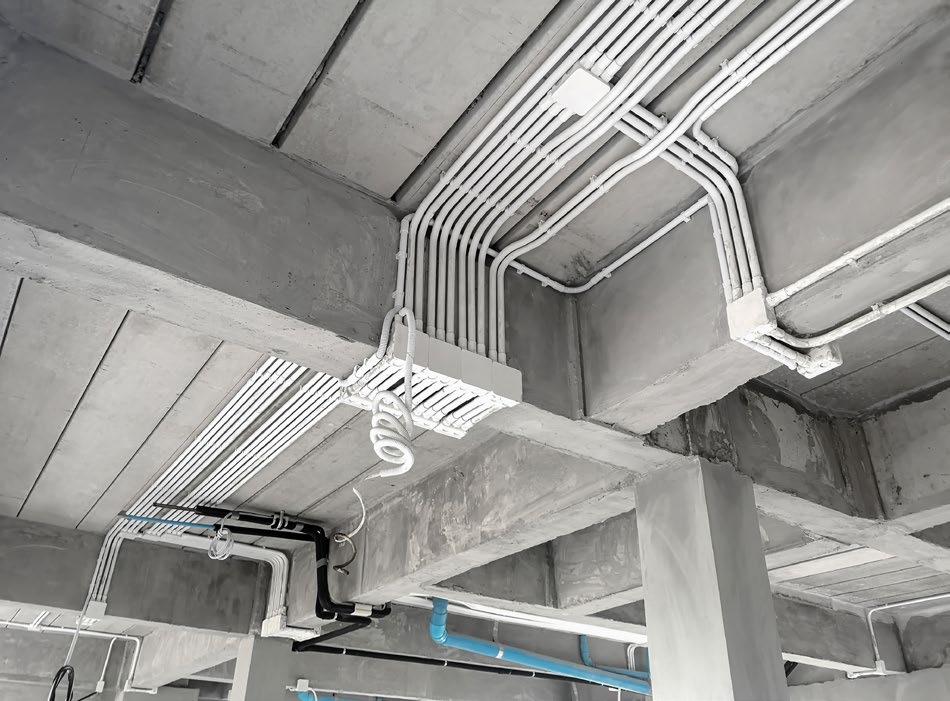
½ EL-004 Electrical Accessories (RCDs, conduits, socket outlets etc).
½ EL-006 Industrial Switchgear and Controlgear (fuses, switchgear, motor starters).
½ EL-007 Power Switchgear (high voltage).
½ EL-011 Electricity Metering Equipment.
½ EL-050 Power System Control and Communication (Tele and supervisory control systems).
½ EL-057 Boating and Boating Marinas Installations.
½ MS-011 Classification of hazardous areas due to explosive atmospheres.
If any of these are of interest you, please contact Paul Brownlee at paul.brownlee@neca.asn.au
Standards Australia seeks industry input into standards development
Standards Australia is considering changing the way they develop and amend standards and is seeking industry feedback on their proposal. They are holding a number of information sessions and stakeholders can also comment on the proposed changes. If this is something you feel strongly about and want to have your say, visit www.bit.ly/standardsinput –consultation closes on 15 March 2023.
SafeWork NSW has commenced a state-wide campaign aimed specifically at the electrical safety of electrical workers and the general public. This is in response to two tragic events, a fatality and a worker receiving serious burns.
SafeWork also quote these alarming statistics, “Between June 2020 and October 2021, compensation claims show contact with electricity resulted in two fatalities, 569 serious injuries and more than 400 dangerous incidents.”
Media advice and further information can be found at www.bit.ly/worksafeblitz
Australian Energy Regulator (AER) transition network service provider (TNSP) Ring-Fencing Guideline released for comment
In our September edition we updated members on the release of the discussion paper on Transmission Ring-Fencing. In early November the AER released its draft Ring-Fencing Guideline for consultation. There was a tight turnaround and submissions closed on 16 December 2022.
NECA has reviewed the guideline and explanatory information, and continues to advocate for a level playing field between TNSP-owned firms and our members, focusing on the supply of materials, labour and plant and equipment.
Paul Brownlee NECA National Policy and Technical Director
The Australian electrical and communications industry continues to work on initiatives that promote greater inclusivity, workforce diversity and encourage more women to pursue and succeed in electrical careers. More than just being the right thing to do, businesses are recognising the benefits a diverse workforce can bring, including a broader range of skill sets and perspectives that can enhance problem solving and innovation, as well as access to a greater pool of potential workers to ease the current skills shortage.
At NECA, we want to acknowledge and learn from the inspiring individuals in our industry who are at the forefront of driving significant change in this area. That is why we have added two brand new categories to the 2023 NECA Awards – the Women in Energy Award and the Leaders in Diversity Award.
If you are interested in getting involved in the 2023 NECA Awards, visit www.bit.ly/3lEaQPE to access the NECA Excellence Awards Submission Guide. For further information, contact your local NECA branch.
Once you are ready to apply, go to the NECA Awards online submission portal to submit your application at www.bit.ly/323WDlF Submissions are due by Wednesday 17 May 2023.
At NECA, we believe that promoting gender equity and diversity in the workplace isn’t just something we should do - it’s something we must do if we want to create a stronger future for everyone involved in the electrical industry. That’s why we have expanded the NECA Awards program to include categories outside of the traditional project-based classifications. If you or someone you know is a NECA member who is doing exceptional work to promote gender equity or diversity within their business, we look forward to hearing from you soon!
We can’t wait to celebrate the inaugural winners of these prestigious awards and showcase their valuable contributions to our industry.
NECA’s Women in Energy Award recognises individuals who are leading the way when it comes to improving female participation in the electrical industry. This could be through initiatives that normalise and promote the electrical trade as a worthy career pathway for any gender, or provide extra support to female apprentices during their training. Perhaps the applicant has implemented successful recruitment, career progression or retention strategies that have produced significant results. Or maybe they are an advocate for industry change, calling for work environments and conditions that better support women working in the electrical trade.
We want to hear from individuals in our industry who are committed to improving gender diversity in the electrical industry, highlight their success and learn from their achievements.
The Women in Energy Award is open to any individual, regardless of gender, who is either a NECA member or is employed by a NECA member. They may be working in any area of the electrical and communications industry and could have any type of role. Whether the applicant is a business owner, supervisor, electrical worker or has an office-based role, we welcome their nomination. Applicants may nominate themselves or be nominated by someone else who believes they deserve to be recognised for their impressive efforts.
Scan here to review the category criteria for this award.
Having a diverse workforce brings many benefits to businesses and to our industry as a whole. Many electrical and communications contracting businesses are already leading the way with programs designed to support diversity and inclusion in the workplace. We want to draw attention to these achievements, not only to shine the spotlight on companies that deserve to be commended, but to inspire similar practices throughout the electrical industry.
This award recognises a business that has introduced changes that support greater diversity and inclusion in their workplace, and has achieved exceptional results. This can be demonstrated in a variety of ways. We want to hear from businesses that can demonstrate how they have met diversity-related outcomes and targets, whether this is the result of a short-term project or part of a larger initiative. We want to know what cultural, organisational or monetary benefits have been generated by these changes.
Scan here to review the category criteria for this award.







MATES IN ENERGY WORKS FROM THE CORE PRINCIPLE THAT INCREASING INDIVIDUAL AND COMMUNITY CAPACITY TO RECOGNISE SUICIDAL BEHAVIOUR, AND PREVENT AND RESPOND TO SUICIDE, IS ESSENTIAL FOR REDUCING SUICIDE RATES.
framework to a “help-offering” approach. Traditional workplace support structures often rely on the individual who is struggling to reach out for help, which is challenging for many, particularly those who are struggling with mental health issues or suicidal ideation.
At MATES in Energy, we believe it is important to create an environment where help-offering is the focus. We train and support workers to:
½ identify the subtle changes in their workmates’ behaviour, which may suggest they are struggling;
½ know how to respond if someone talks about suicide; and
½ connect them to help and keep them safe.
The role of workplaces in prevention, early detection and early intervention in relation to mental health and suicide is vital. The MATES in Energy program gives workplaces the tools to enable good mental health and wellbeing. We are a community development program, that encourages grassroots level change in how workers talk to, and look out for, each other on site. Our program provides the muchneeded bridge between a worker who is struggling and feeling overwhelmed, and the help and support they need.
By adopting the program, companies are investing in the long-term future health of the energy industry. MATES in Energy makes sites safer, more productive, more supportive of individuals, and

demonstrates a real commitment to workplace safety, and the mental health and wellbeing of all workers.
Workforce capacity building is provided through clear pathways of education, training and support – building communities of MATES who can look out for MATES. The program is adapted to mirror safety structures on site and engages the entire workforce in providing a mentally safer and healthier workplace.
Our approach is a transition away from a more traditional “help-seeking”
We also understand the energy industry because we are a part of it. Our field officers are workers themselves, not external experts, but actual industry participants who now work in the mental health and suicide prevention space. As participants in the industry, they also understand the realities of sites. Our training works within the structures companies already have in place, meaning we can execute programs quickly and with minimal disruption.
To find out more about MATES in Energy, please go to our website at www.mates.org.au/energy
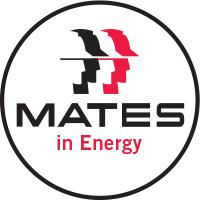 Suzanne Desailly General Manager Mining and Energy MATES Australia
Suzanne Desailly General Manager Mining and Energy MATES Australia

